I am Chip Superwoman Hua Jie, with 20 years in the industry and over 500,000 followers in the chip sector. There are many things that are inconvenient to publicly share on WeChat, such as chip trading, resource links, etc., which I will share in my friend circle..
Scan to add me on WeChat👇
 With the rapid development of artificial intelligence technology, the increasing maturity of voice recognition and natural language processing technologies, and the growing emphasis from parents on early education and companionship for their children, AI voice toys have become a hot topic in the current market. Unlike traditional toys that can only play preset audio, AI voice toys can accurately recognize and understand children’s voice commands, enabling intelligent dialogue and interaction, providing children with a personalized and intelligent entertainment experience.Recently, I Love Audio Network conducted a review and analysis of popular AI voice toys on the market, including the “AI Companion | Talking Tom Cat” that this article will detail. This product features the classic IP image of “Talking Tom Cat,” with lively eyes and a mouth and ears that move in sync with the conversation, providing a more emotional interaction; it is made of food-grade silicone material, which is comfortable to touch and safe for children to use.In terms of functionality, the AI Companion | Talking Tom Cat supports initiating conversations through “Tom Cat” voice commands, allowing for continuous communication and supporting bilingual interaction in Chinese and English. With its AI large model, it can perform a variety of functions such as knowledge Q&A, interactive text games, learning to speak, storytelling, telling jokes, playing music, and asking about time and weather, easily addressing children’s curiosity. Moreover, as content continues to enrich and model capabilities are continuously optimized, it grows alongside children. Now, let’s take a look at the detailed disassembly report of this product~
With the rapid development of artificial intelligence technology, the increasing maturity of voice recognition and natural language processing technologies, and the growing emphasis from parents on early education and companionship for their children, AI voice toys have become a hot topic in the current market. Unlike traditional toys that can only play preset audio, AI voice toys can accurately recognize and understand children’s voice commands, enabling intelligent dialogue and interaction, providing children with a personalized and intelligent entertainment experience.Recently, I Love Audio Network conducted a review and analysis of popular AI voice toys on the market, including the “AI Companion | Talking Tom Cat” that this article will detail. This product features the classic IP image of “Talking Tom Cat,” with lively eyes and a mouth and ears that move in sync with the conversation, providing a more emotional interaction; it is made of food-grade silicone material, which is comfortable to touch and safe for children to use.In terms of functionality, the AI Companion | Talking Tom Cat supports initiating conversations through “Tom Cat” voice commands, allowing for continuous communication and supporting bilingual interaction in Chinese and English. With its AI large model, it can perform a variety of functions such as knowledge Q&A, interactive text games, learning to speak, storytelling, telling jokes, playing music, and asking about time and weather, easily addressing children’s curiosity. Moreover, as content continues to enrich and model capabilities are continuously optimized, it grows alongside children. Now, let’s take a look at the detailed disassembly report of this product~
01Unboxing the AI Companion | Talking Tom Cat
 The packaging design of the AI Companion | Talking Tom Cat is colorful and vibrant, very attractive to children. The front displays the brand logo and product name, along with a warm interaction scene between the child and Tom Cat.
The packaging design of the AI Companion | Talking Tom Cat is colorful and vibrant, very attractive to children. The front displays the brand logo and product name, along with a warm interaction scene between the child and Tom Cat. The back of the packaging box introduces product parameter information, product name: AI Companion – Talking Tom Cat, product model: AIR001, product dimensions: approximately 181mm x 126mm x 120mm, rated voltage: 5V, rated power: 12.5W, charging input: 5V-2.5A, manufacturer: Hangzhou Xidong Network Technology Co., Ltd.
The back of the packaging box introduces product parameter information, product name: AI Companion – Talking Tom Cat, product model: AIR001, product dimensions: approximately 181mm x 126mm x 120mm, rated voltage: 5V, rated power: 12.5W, charging input: 5V-2.5A, manufacturer: Hangzhou Xidong Network Technology Co., Ltd.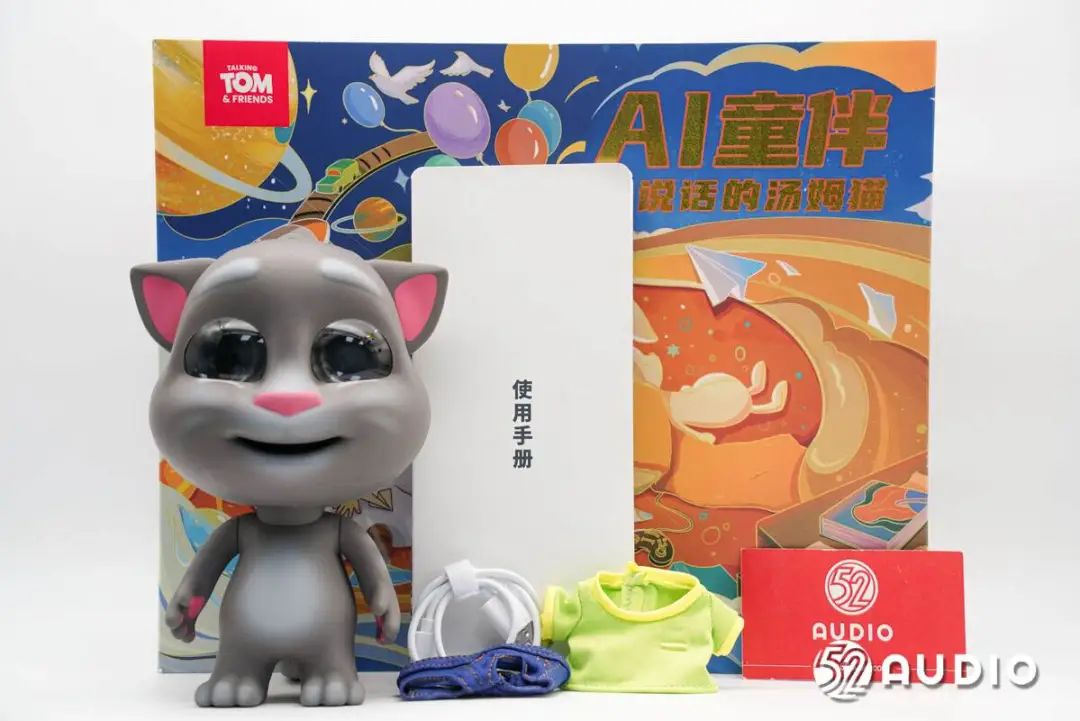 Upon opening the packaging, all items inside were taken out, including the Talking Tom Cat, charging cable, clothing, and user manual.
Upon opening the packaging, all items inside were taken out, including the Talking Tom Cat, charging cable, clothing, and user manual.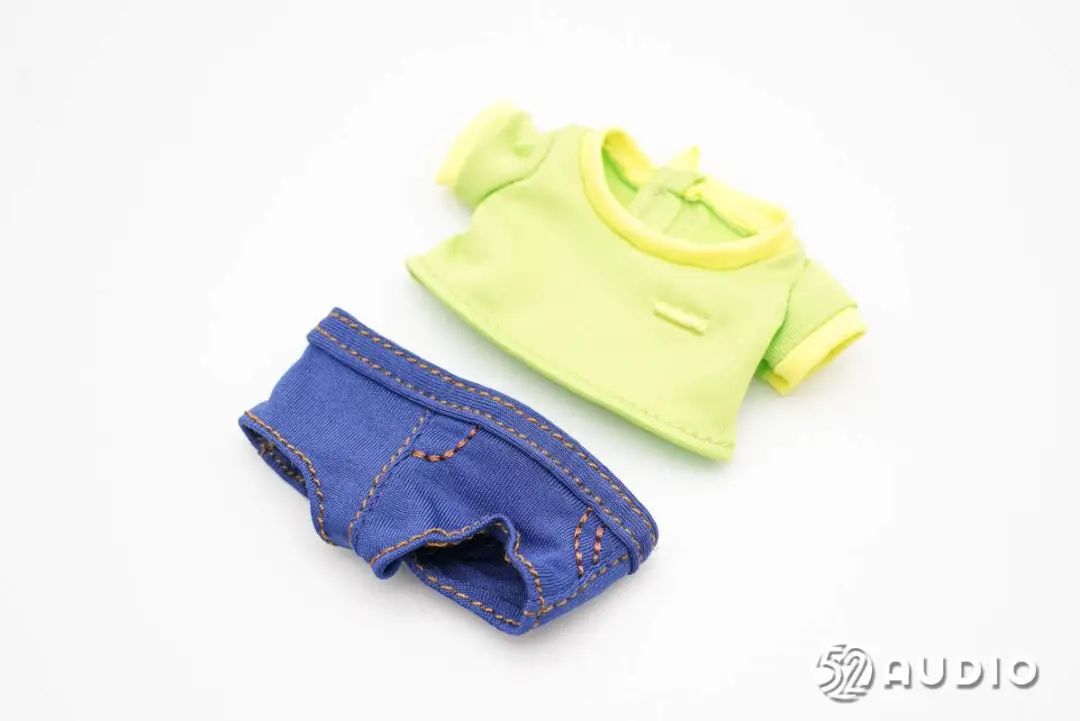 A set of clothing is included as a bonus. There are also limited edition pink outfits and Tom Cat Year of the Snake themed outfits available through activities.
A set of clothing is included as a bonus. There are also limited edition pink outfits and Tom Cat Year of the Snake themed outfits available through activities. The charging cable uses a USB-A to Type-C interface.
The charging cable uses a USB-A to Type-C interface.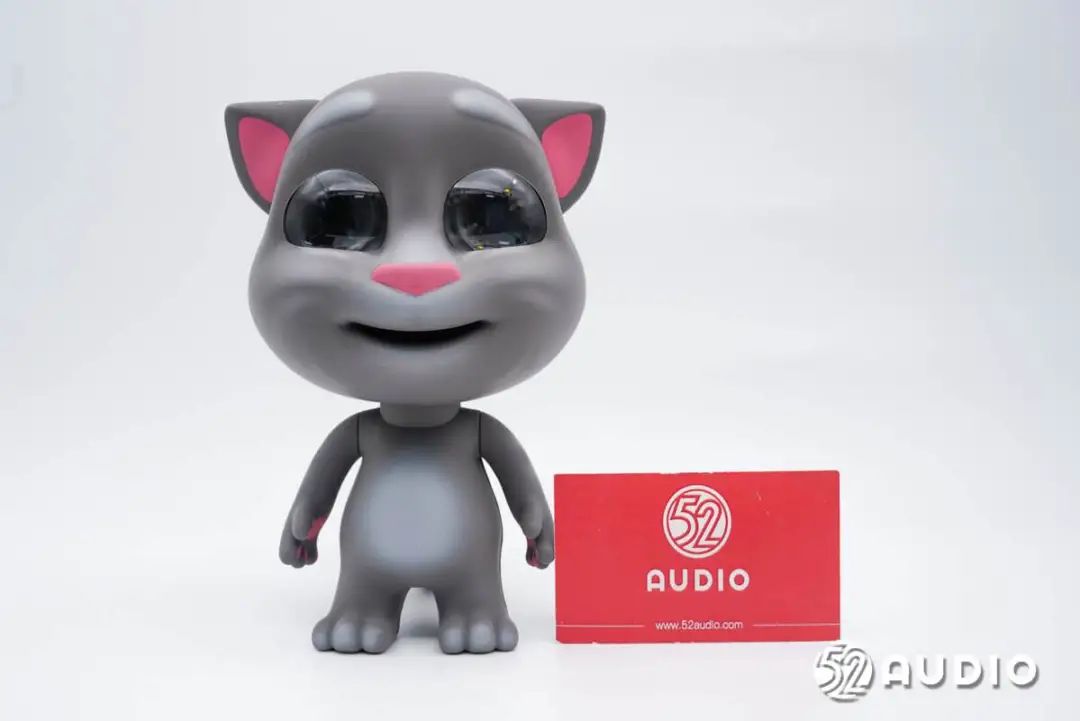 A front view of the AI Companion | Talking Tom Cat shows the classic IP image of “Talking Tom Cat,” looking adorable. The head design features lively eyes that change with emotions, and a mouth and ears that move with interaction; it can rotate 120° and supports sound localization.
A front view of the AI Companion | Talking Tom Cat shows the classic IP image of “Talking Tom Cat,” looking adorable. The head design features lively eyes that change with emotions, and a mouth and ears that move with interaction; it can rotate 120° and supports sound localization.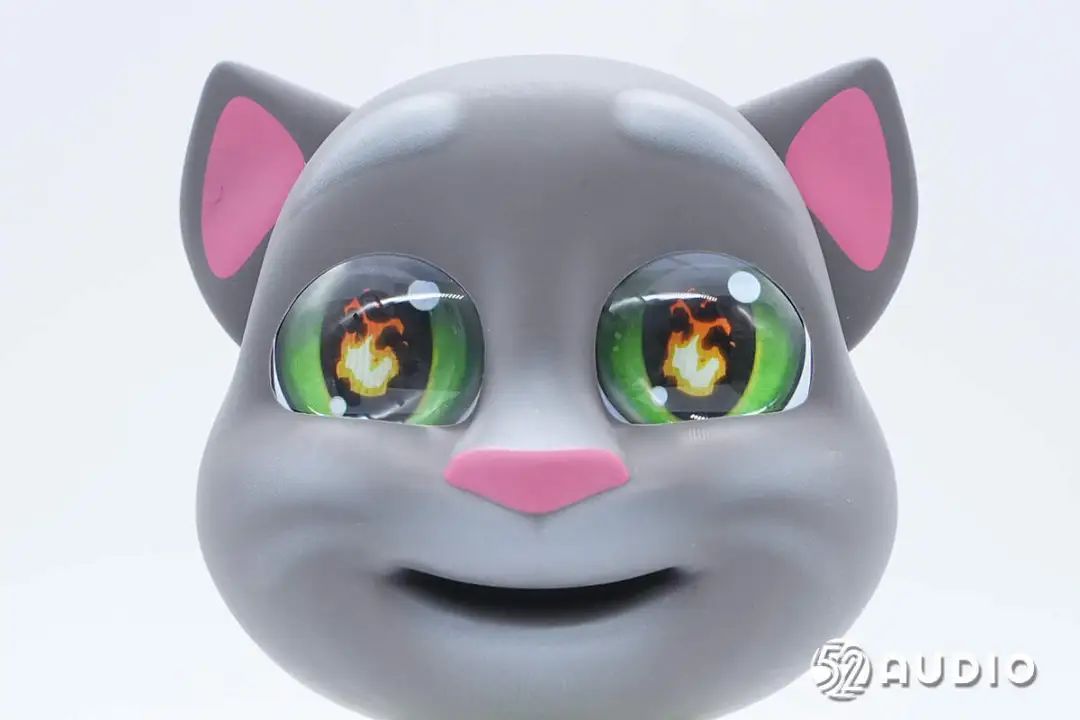 A close-up of the lively eyes, which can display many expressions such as happiness, enjoyment, anger, and questioning, providing a more humanized emotional expression.
A close-up of the lively eyes, which can display many expressions such as happiness, enjoyment, anger, and questioning, providing a more humanized emotional expression.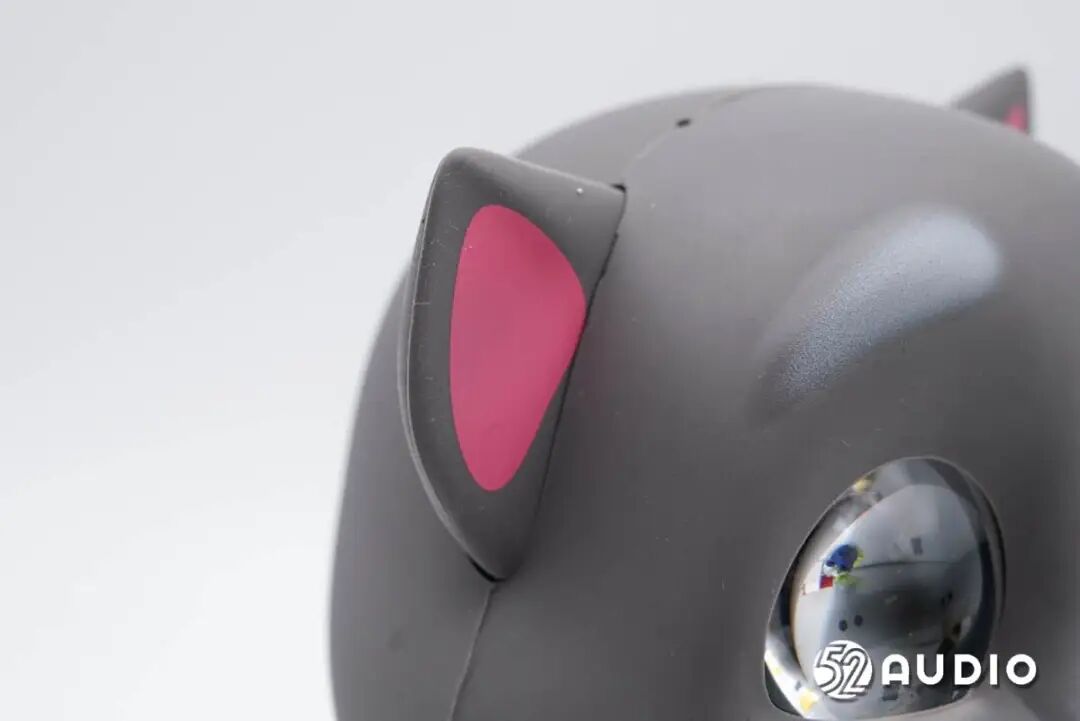 A close-up of Tom Cat’s ears, which have built-in motors that move up and down while speaking.
A close-up of Tom Cat’s ears, which have built-in motors that move up and down while speaking.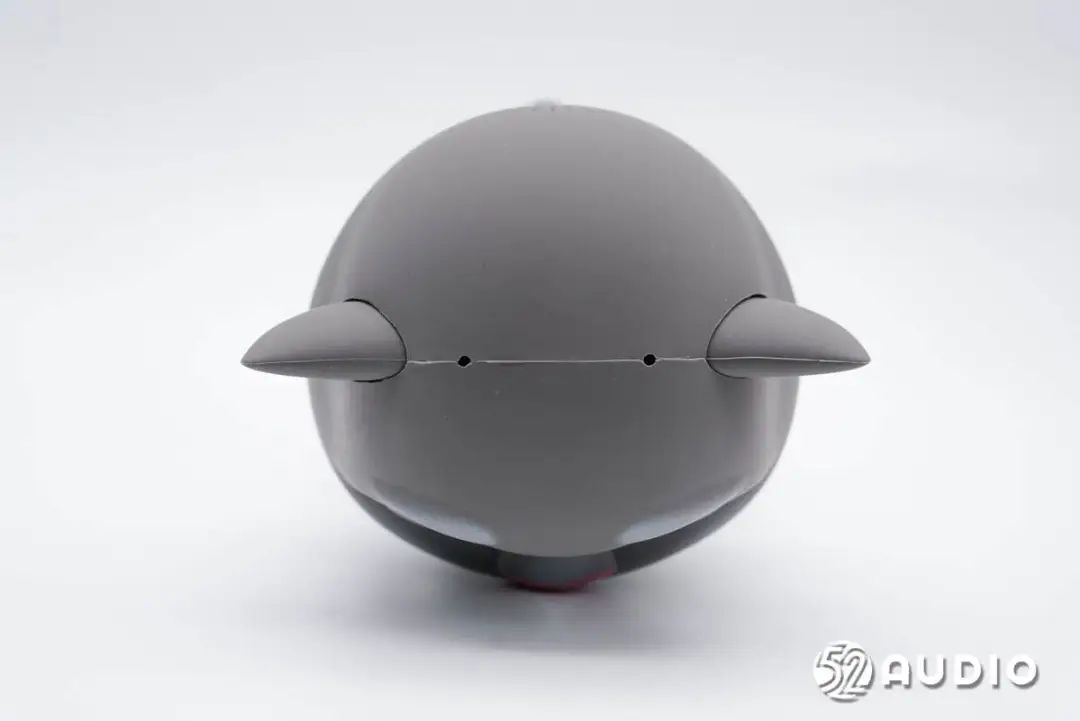 The top of Tom Cat’s head is equipped with a microphone array. It is also a touch area; when you touch the head, Tom Cat will show a very comfortable expression. Touching the head while Tom Cat is speaking can interrupt it and start a new conversation.
The top of Tom Cat’s head is equipped with a microphone array. It is also a touch area; when you touch the head, Tom Cat will show a very comfortable expression. Touching the head while Tom Cat is speaking can interrupt it and start a new conversation.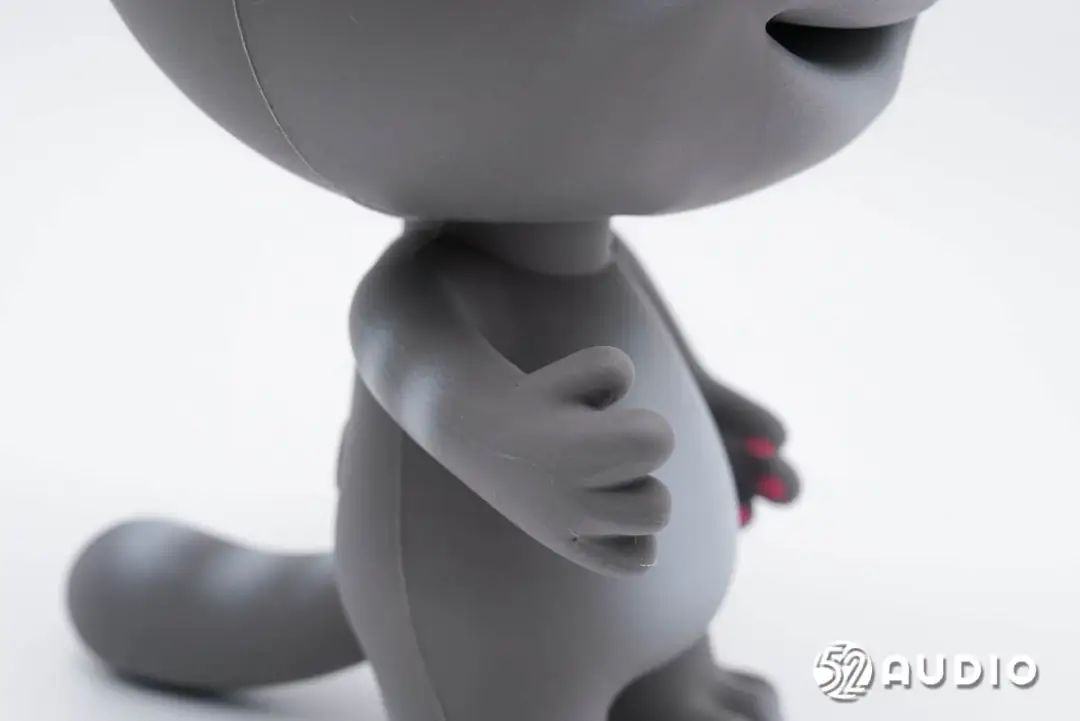 Tom Cat’s arms can rotate up and down, allowing for self-set actions.
Tom Cat’s arms can rotate up and down, allowing for self-set actions.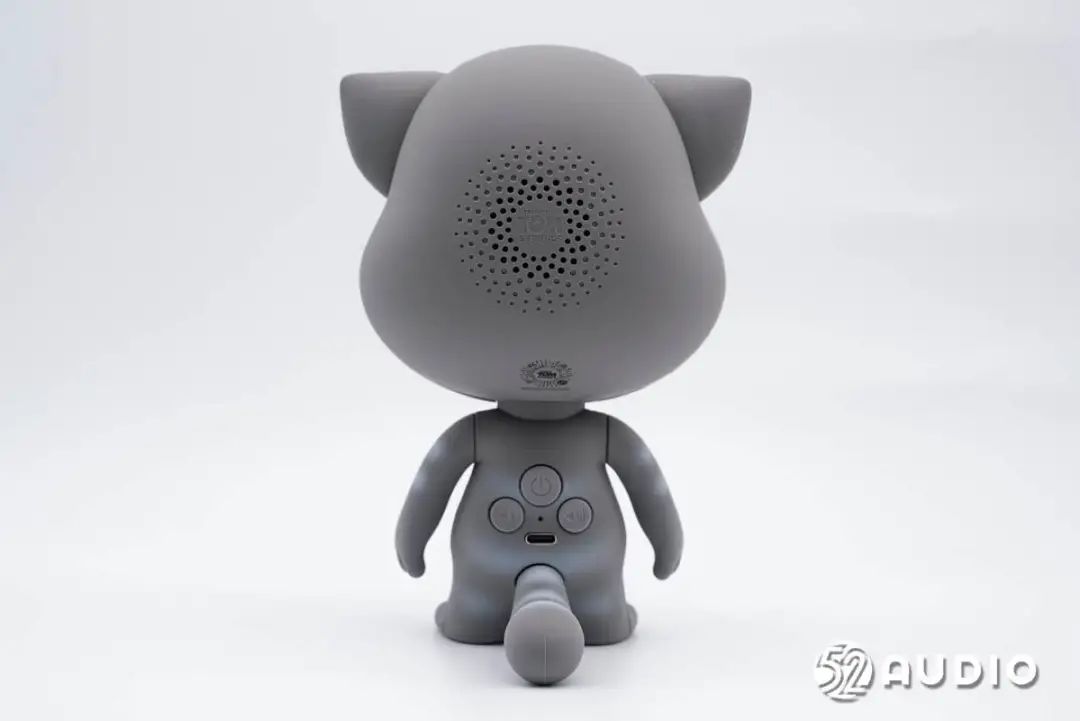 A rear view of the body shows the speaker output hole on the head, with functional buttons and interfaces on the back.
A rear view of the body shows the speaker output hole on the head, with functional buttons and interfaces on the back.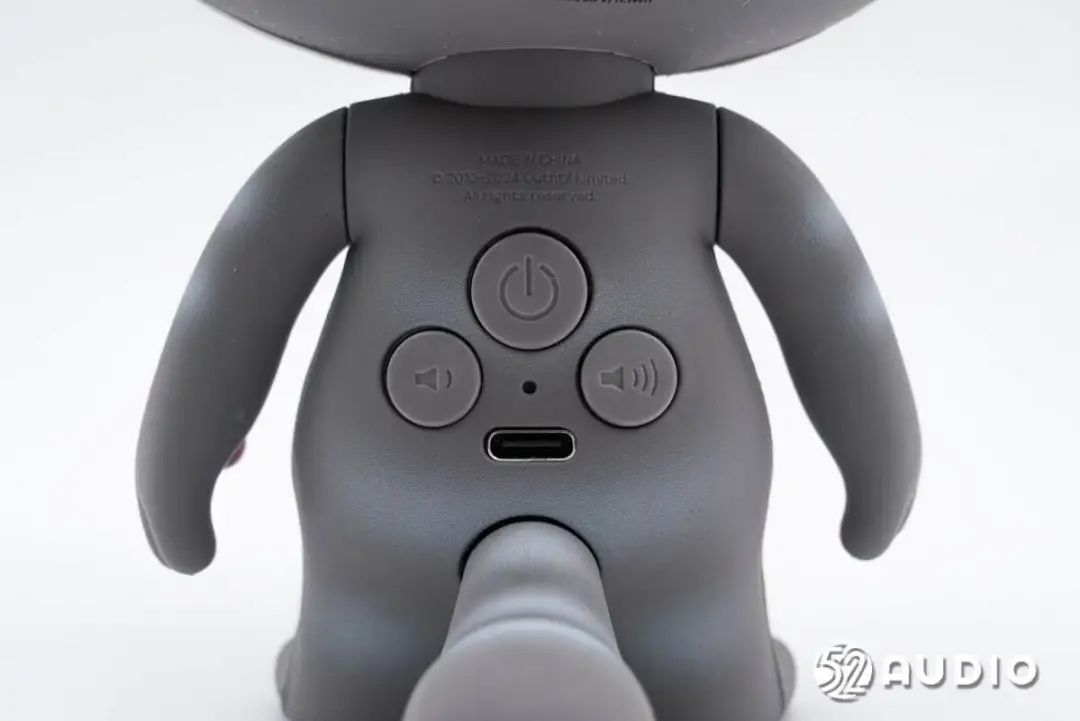 A close-up of the power button, volume up/down, and Type-C charging interface on the back of the body, with a round hole in the middle for the indicator light and reset button.
A close-up of the power button, volume up/down, and Type-C charging interface on the back of the body, with a round hole in the middle for the indicator light and reset button.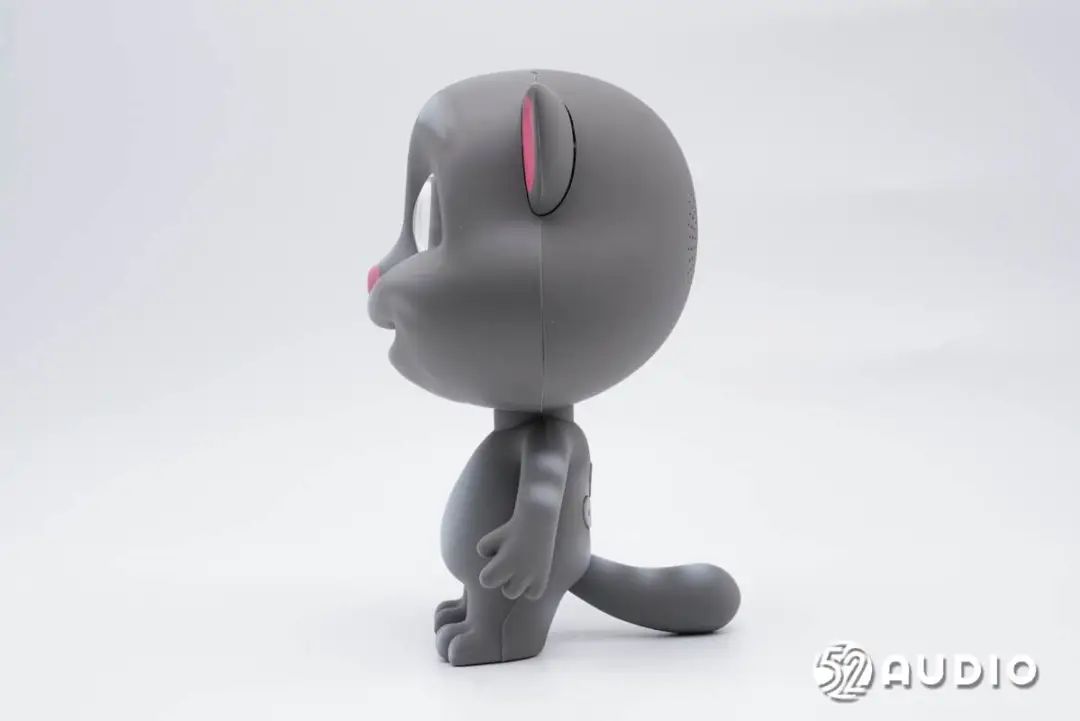 A side view of the body shows the two feet and tail providing stable support.
A side view of the body shows the two feet and tail providing stable support.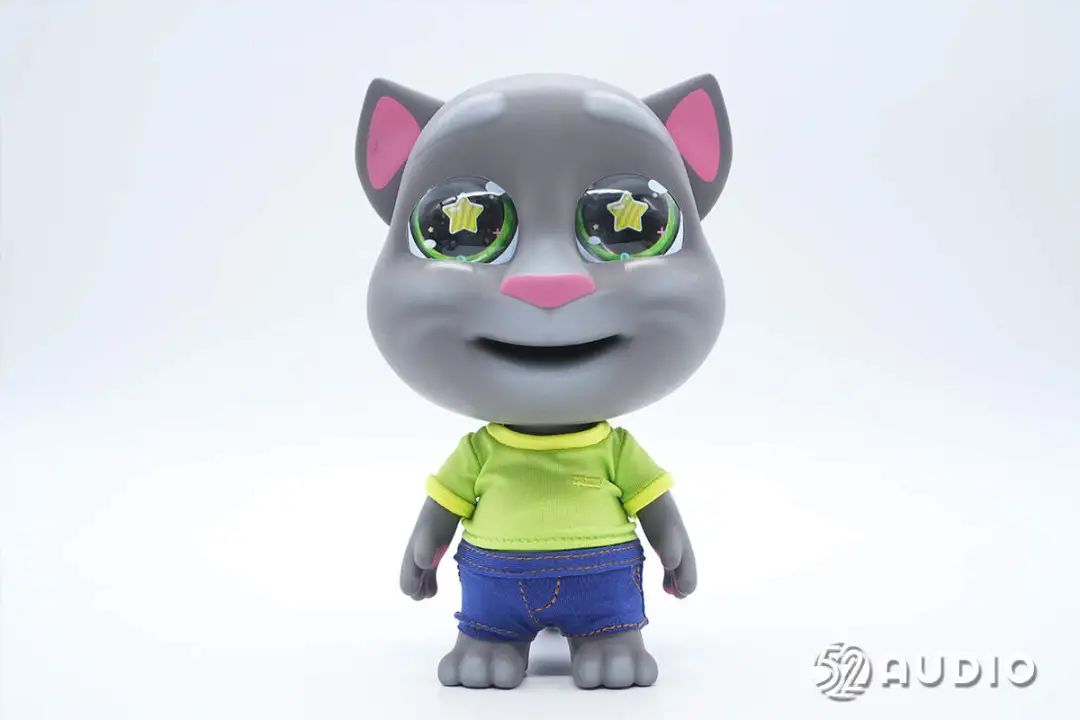 With clothing on, the AI Companion | Talking Tom Cat looks complete.
With clothing on, the AI Companion | Talking Tom Cat looks complete. When you stroke Tom Cat’s head, it shows a very enjoyable expression, truly a “cyber cat petting” experience.
When you stroke Tom Cat’s head, it shows a very enjoyable expression, truly a “cyber cat petting” experience.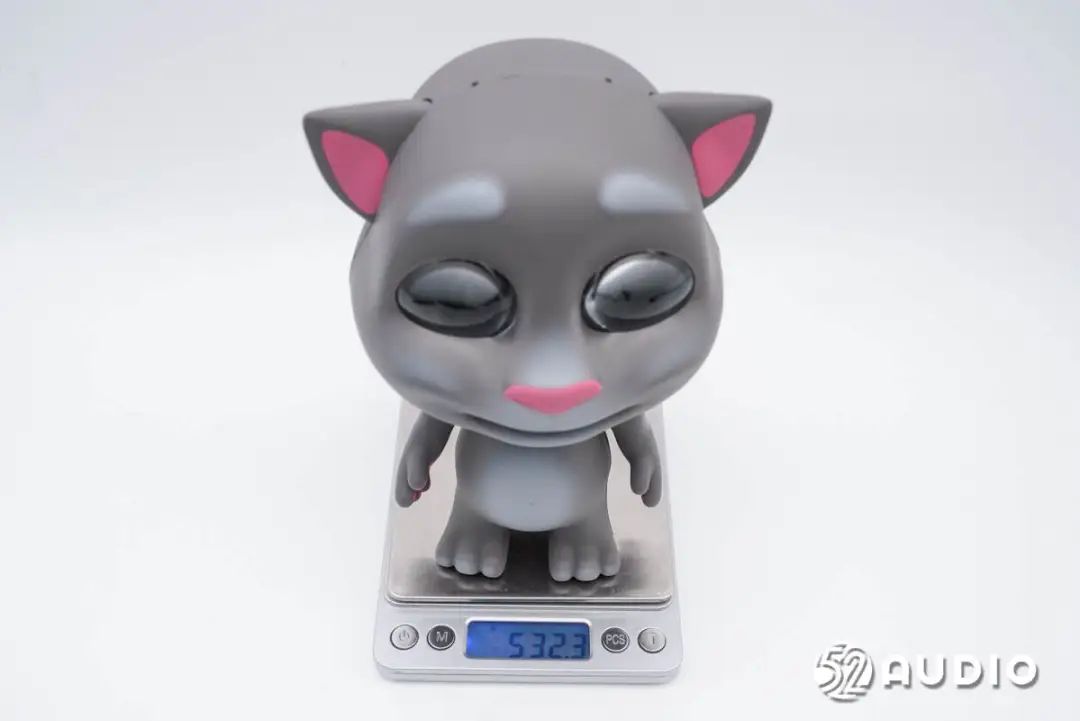 According to tests conducted by I Love Audio Network, the AI Companion | Talking Tom Cat weighs approximately 532.3g.
According to tests conducted by I Love Audio Network, the AI Companion | Talking Tom Cat weighs approximately 532.3g. I Love Audio Network usedCHARGERLAB POWER-Z KM003Cto conduct charging tests on the AI Companion | Talking Tom Cat, with an input power of approximately 8.99W.Extreme cost-performance AI module, connecting to Doubao’s large model in China, supports customer customization of intelligent agents. Applications such as plush toys, desktop robots, and children’s story machines are all customizable; feel free to chat if interested.Scan to add me on WeChat👇
I Love Audio Network usedCHARGERLAB POWER-Z KM003Cto conduct charging tests on the AI Companion | Talking Tom Cat, with an input power of approximately 8.99W.Extreme cost-performance AI module, connecting to Doubao’s large model in China, supports customer customization of intelligent agents. Applications such as plush toys, desktop robots, and children’s story machines are all customizable; feel free to chat if interested.Scan to add me on WeChat👇
02Disassembly of the AI Companion | Talking Tom Cat
Through unboxing, we have detailed the exterior design of the AI Companion | Talking Tom Cat. Now, let’s move on to the disassembly part to see the internal structure and configuration information~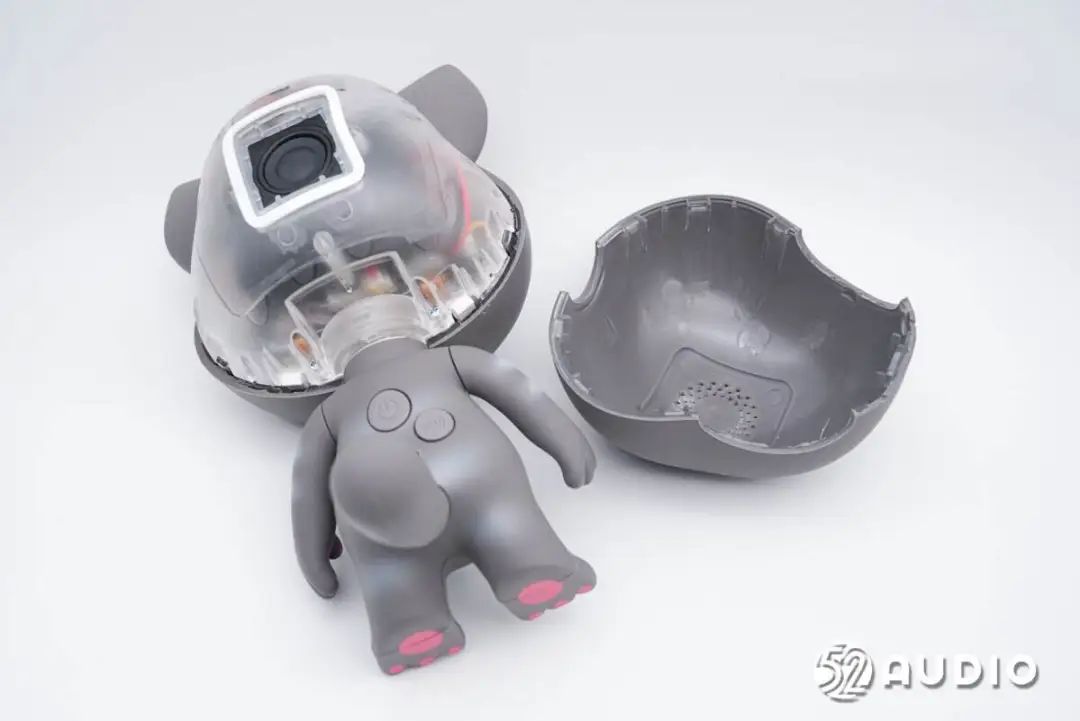 Remove the cover of Tom Cat’s head, which uses a transparent bracket to secure the speaker inside.
Remove the cover of Tom Cat’s head, which uses a transparent bracket to secure the speaker inside.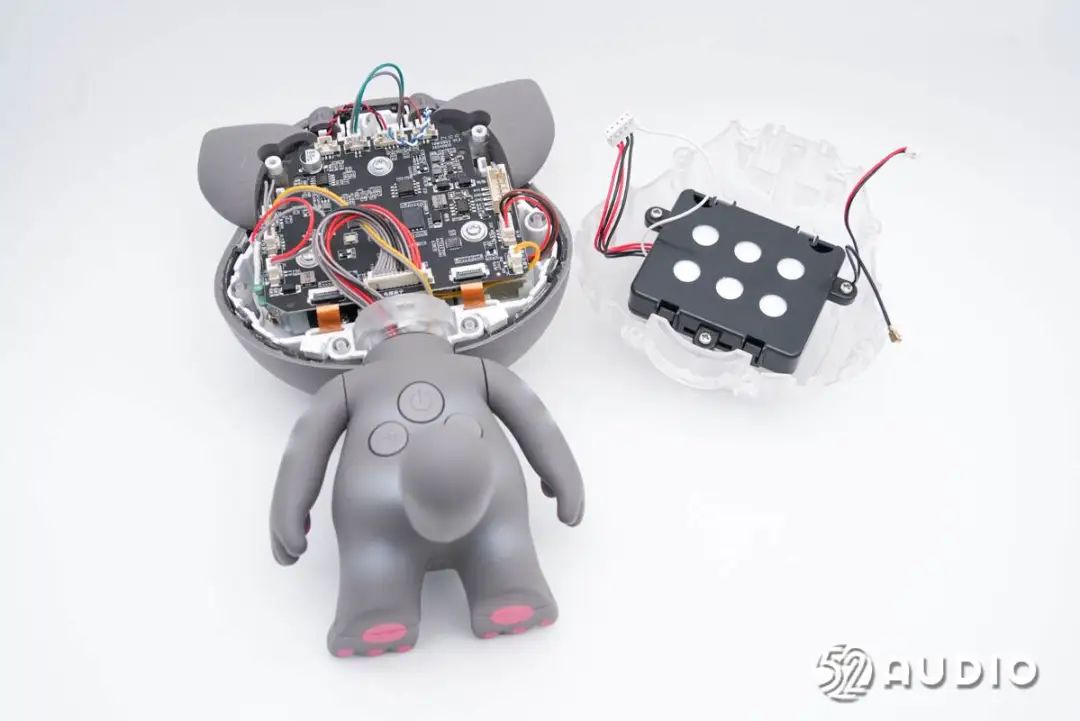 Unclip and remove the transparent bracket.
Unclip and remove the transparent bracket.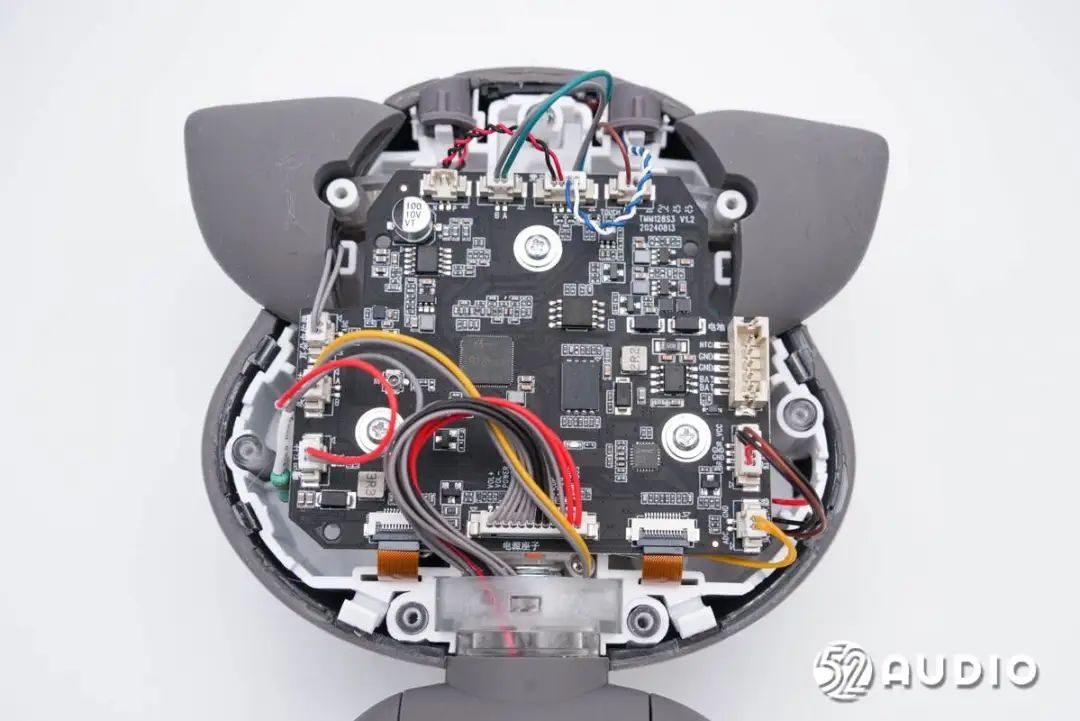 An overview of the internal structure of the cavity, with the upper layer secured by screws to the mainboard, with the ribbon cables and wires connected via connectors.
An overview of the internal structure of the cavity, with the upper layer secured by screws to the mainboard, with the ribbon cables and wires connected via connectors.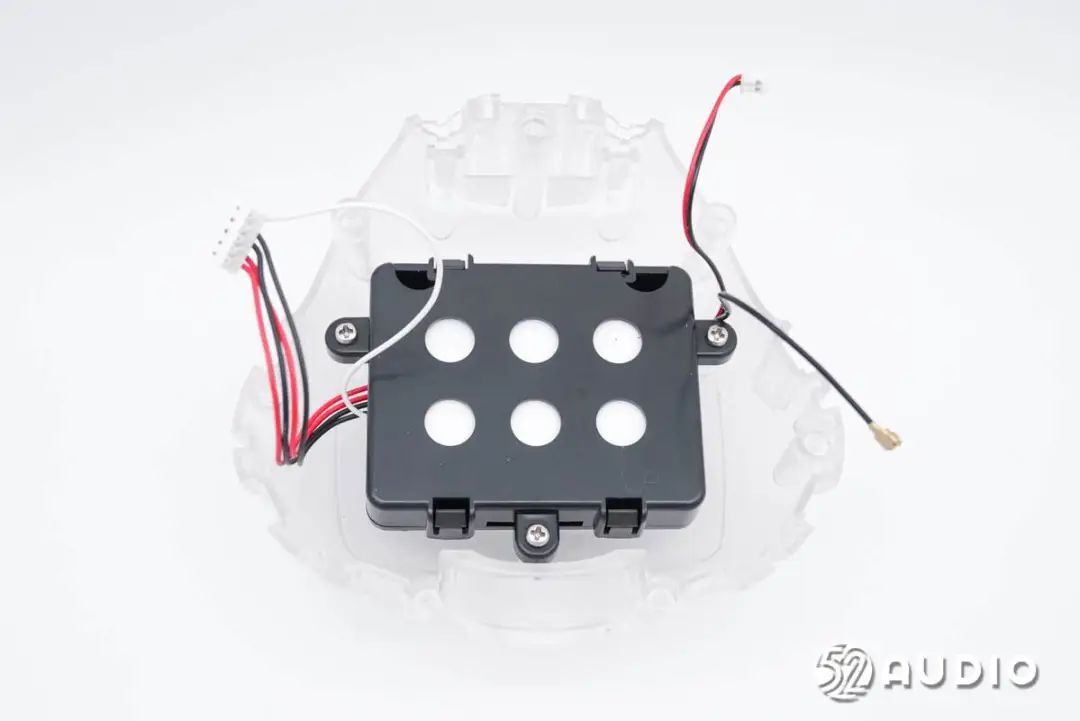 The transparent bracket secures the battery unit and speaker unit structure inside.
The transparent bracket secures the battery unit and speaker unit structure inside.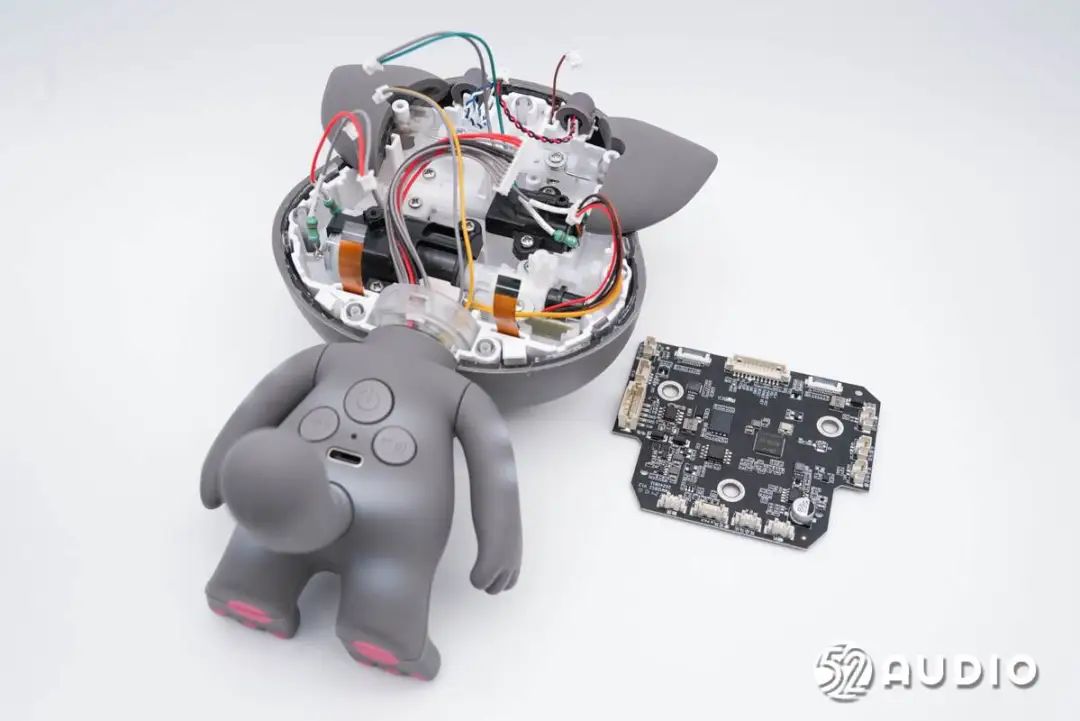 Disconnect all connectors and remove the mainboard unit.
Disconnect all connectors and remove the mainboard unit.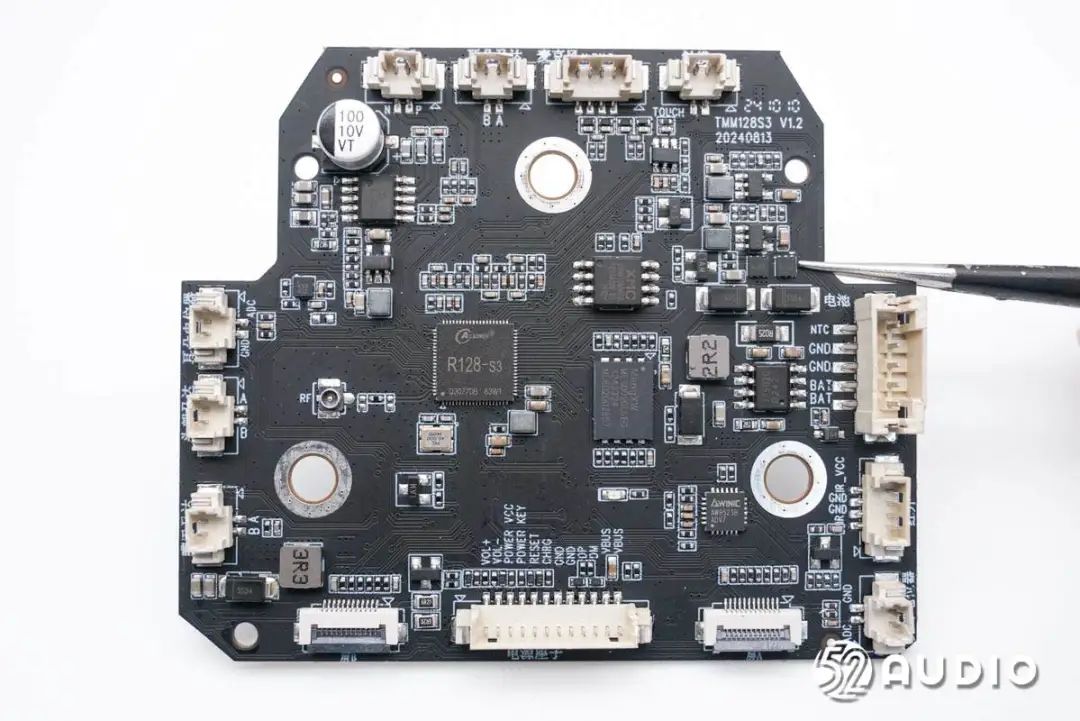 Overview of the circuit on one side of the mainboard.
Overview of the circuit on one side of the mainboard.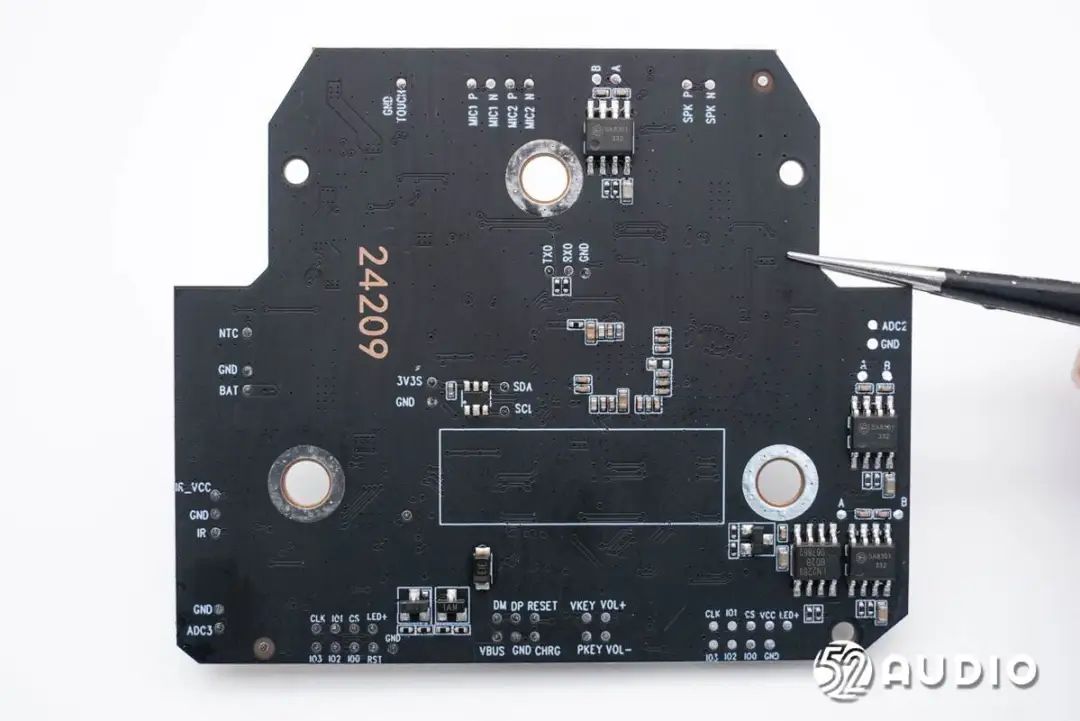 Overview of the circuit on the other side of the mainboard.
Overview of the circuit on the other side of the mainboard.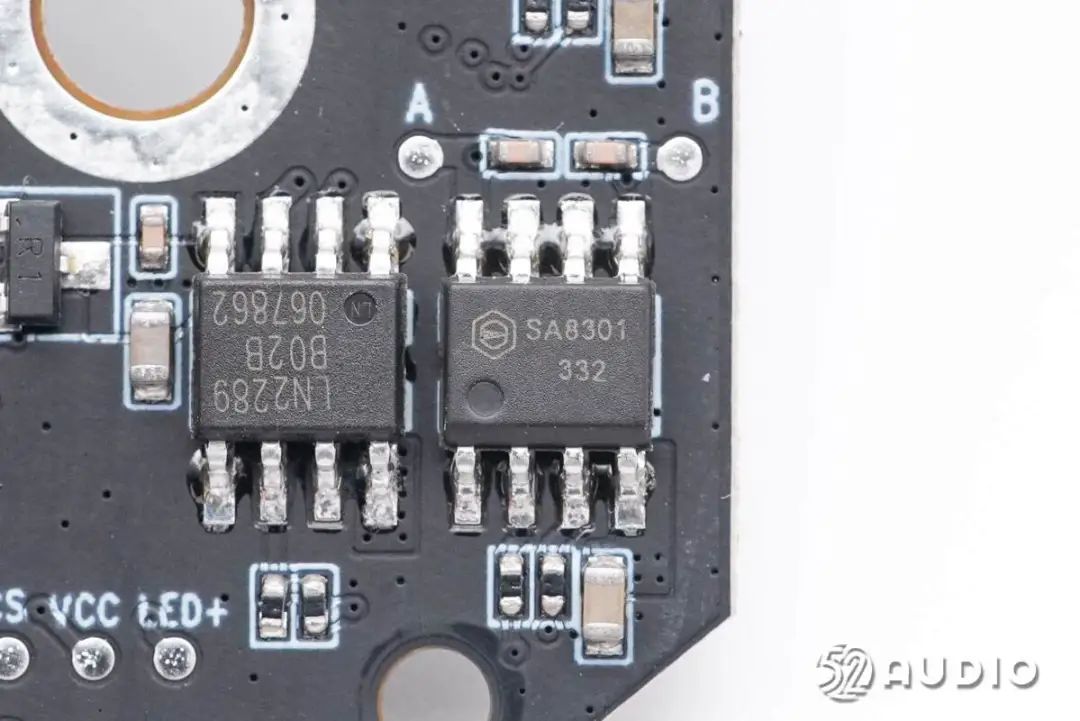 The Sytatek SA8301 motor driver is used to drive the mouth motor. This device can drive a brushless DC motor and consists of PMOS and NMOS power components, integrating four functions: forward/reverse/stop/brake. It supports a maximum operating voltage of 7.0V, continuous current of 1.8A, and peak current of 2.5A. Additionally, it integrates protection features such as over-temperature protection and under-voltage lockout.
The Sytatek SA8301 motor driver is used to drive the mouth motor. This device can drive a brushless DC motor and consists of PMOS and NMOS power components, integrating four functions: forward/reverse/stop/brake. It supports a maximum operating voltage of 7.0V, continuous current of 1.8A, and peak current of 2.5A. Additionally, it integrates protection features such as over-temperature protection and under-voltage lockout.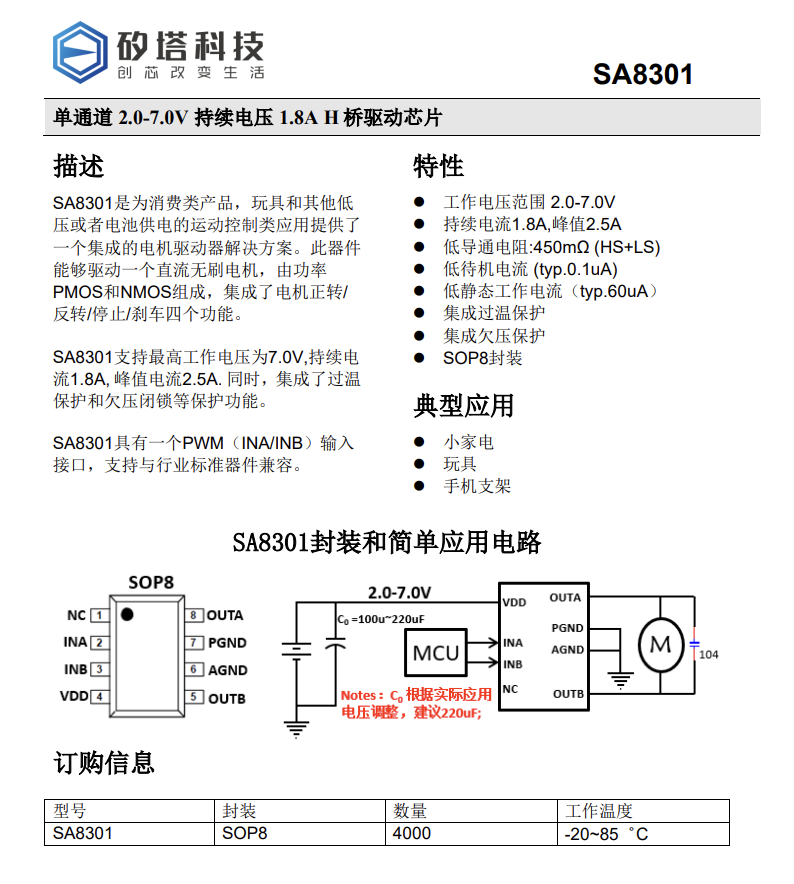 Detailed information on the Sytatek SA8301.
Detailed information on the Sytatek SA8301.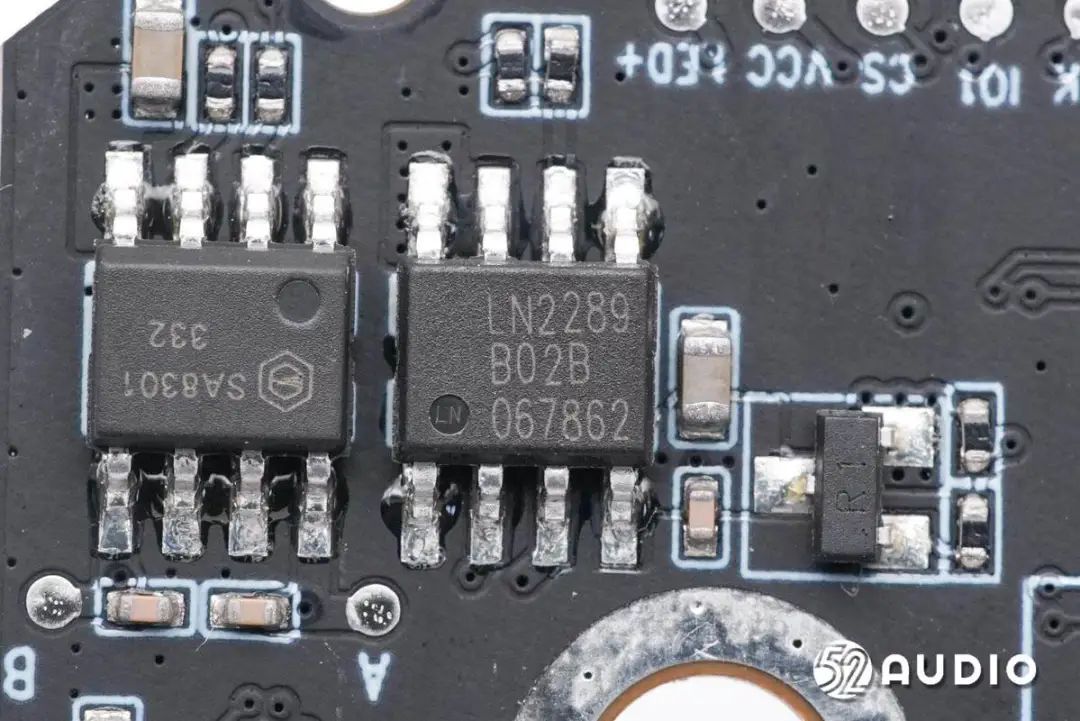 The Natlinear LN2289 is a micro-sized, high-efficiency, boost-type DC/DC regulator. The circuit consists of a current-mode PWM control loop, error amplifier, slope compensation circuit, comparator, and power switch modules. This chip can operate efficiently and stably over a wide load range, with a built-in 3.5A power switch and soft-start protection circuit. With a conversion efficiency of up to 93%, it effectively extends battery life. The output voltage can be set by adjusting two external resistors.
The Natlinear LN2289 is a micro-sized, high-efficiency, boost-type DC/DC regulator. The circuit consists of a current-mode PWM control loop, error amplifier, slope compensation circuit, comparator, and power switch modules. This chip can operate efficiently and stably over a wide load range, with a built-in 3.5A power switch and soft-start protection circuit. With a conversion efficiency of up to 93%, it effectively extends battery life. The output voltage can be set by adjusting two external resistors.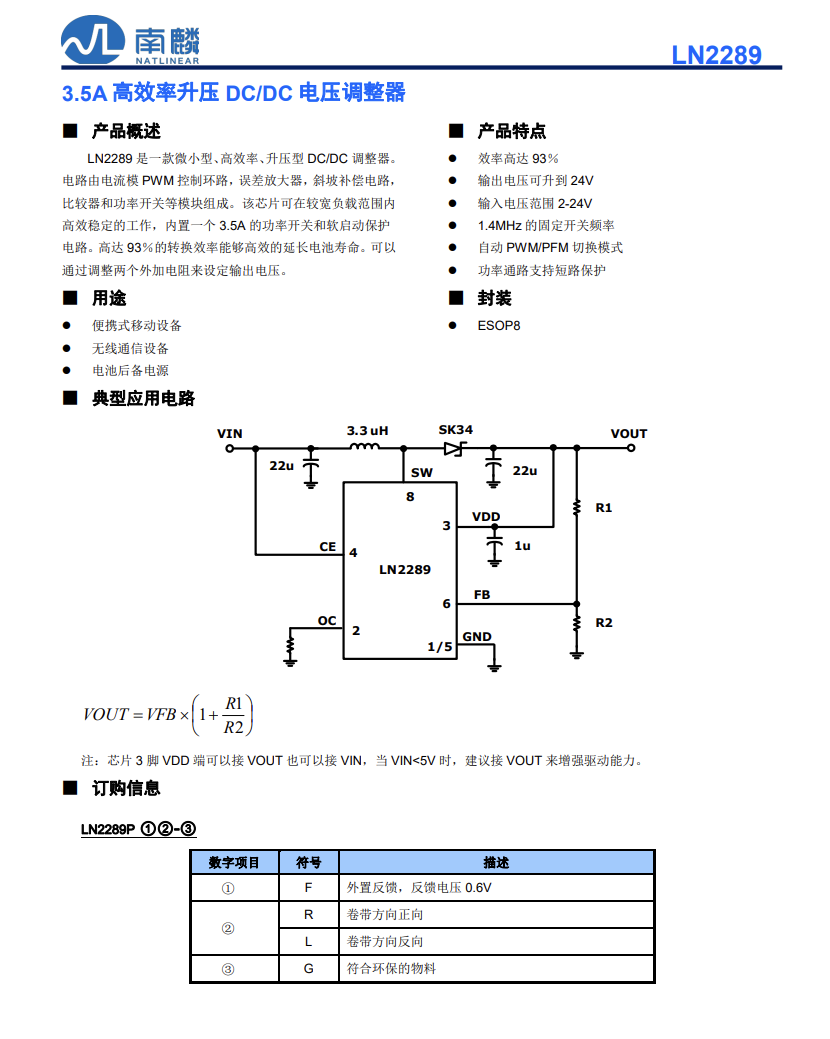 Detailed information on the Natlinear LN2289.
Detailed information on the Natlinear LN2289.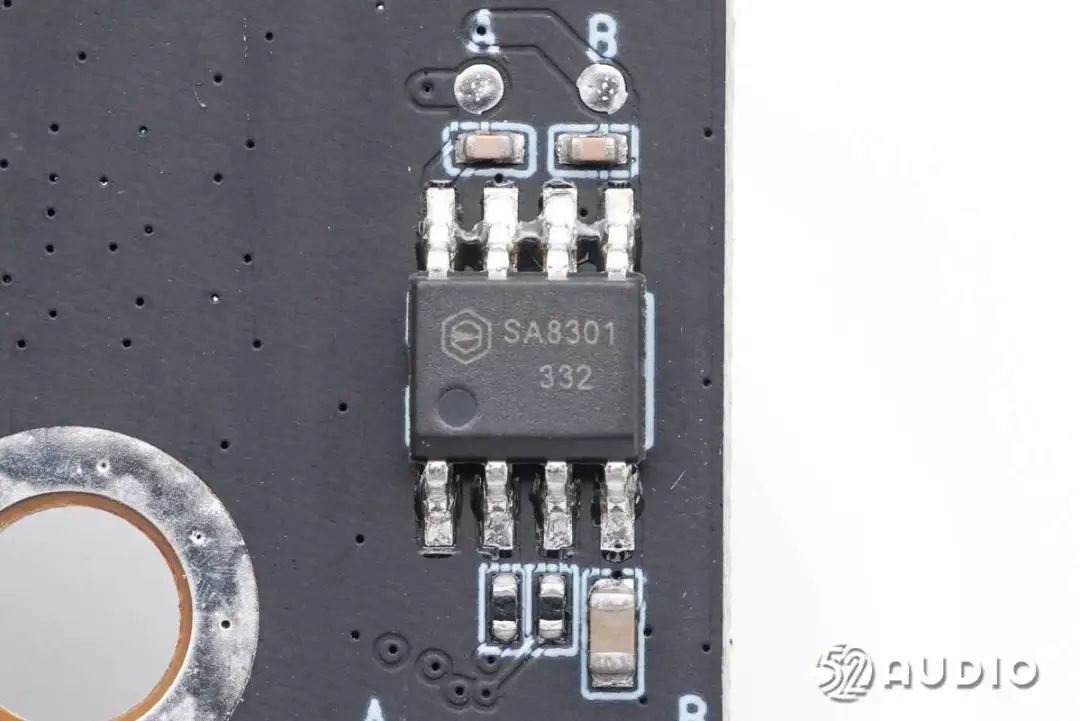 The second Sytatek SA8301 motor driver is used for driving the head motor.
The second Sytatek SA8301 motor driver is used for driving the head motor.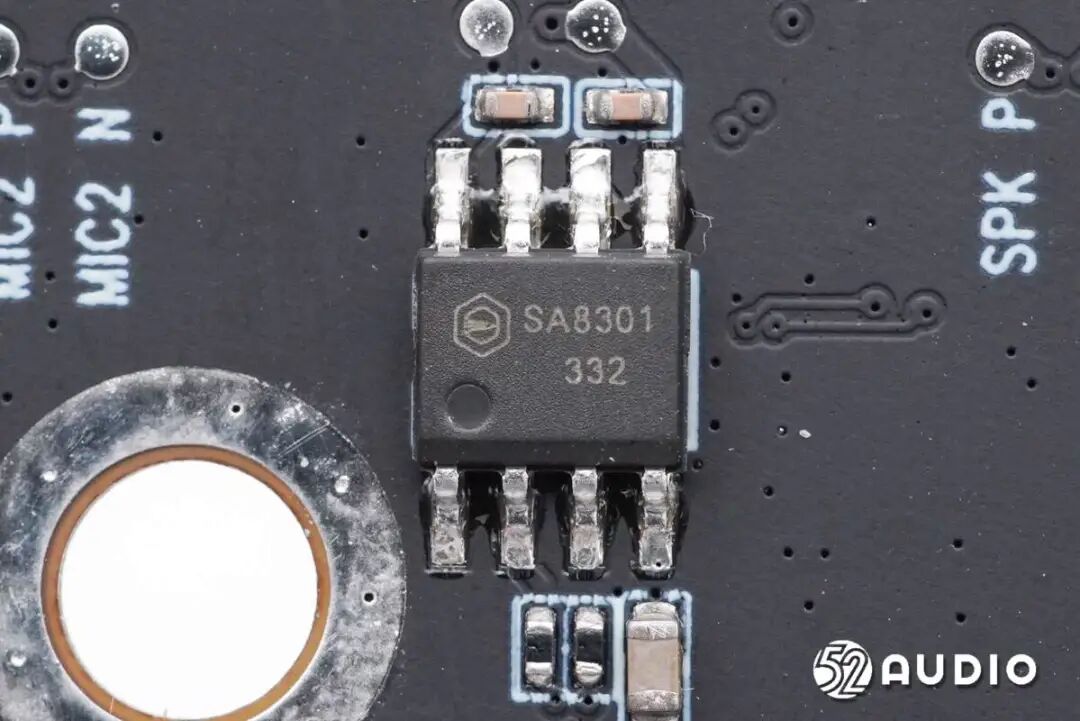 The third Sytatek SA8301 motor driver is used for driving the ear motor.
The third Sytatek SA8301 motor driver is used for driving the ear motor.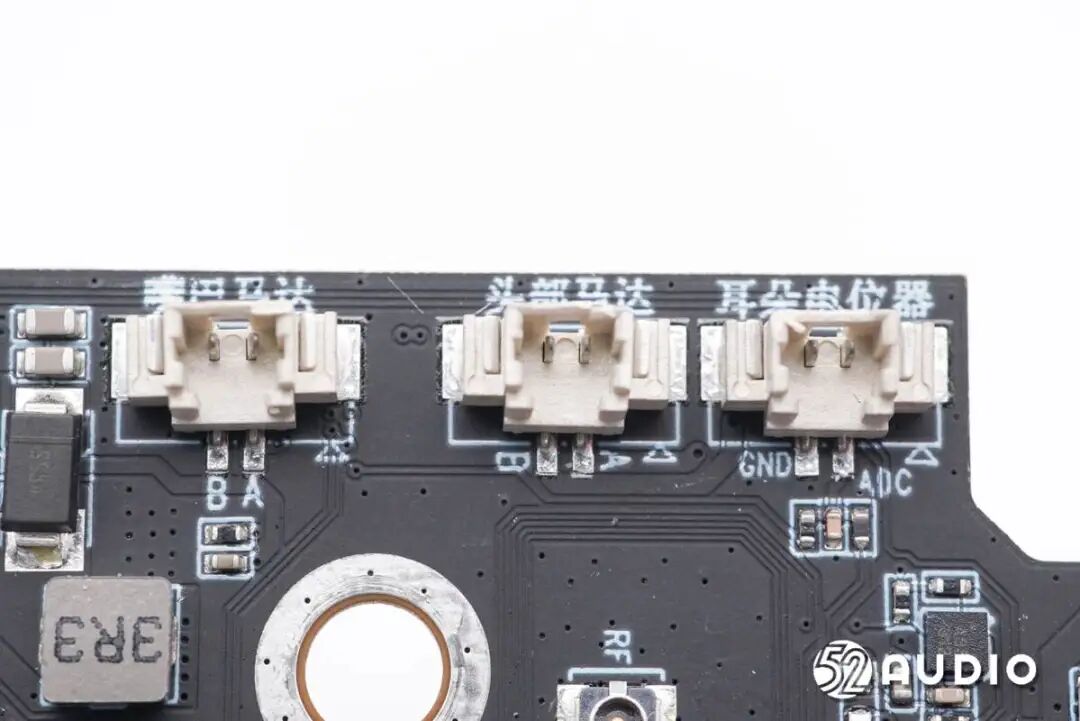 The connector for the mouth motor, head motor, and ear potentiometer wires.
The connector for the mouth motor, head motor, and ear potentiometer wires.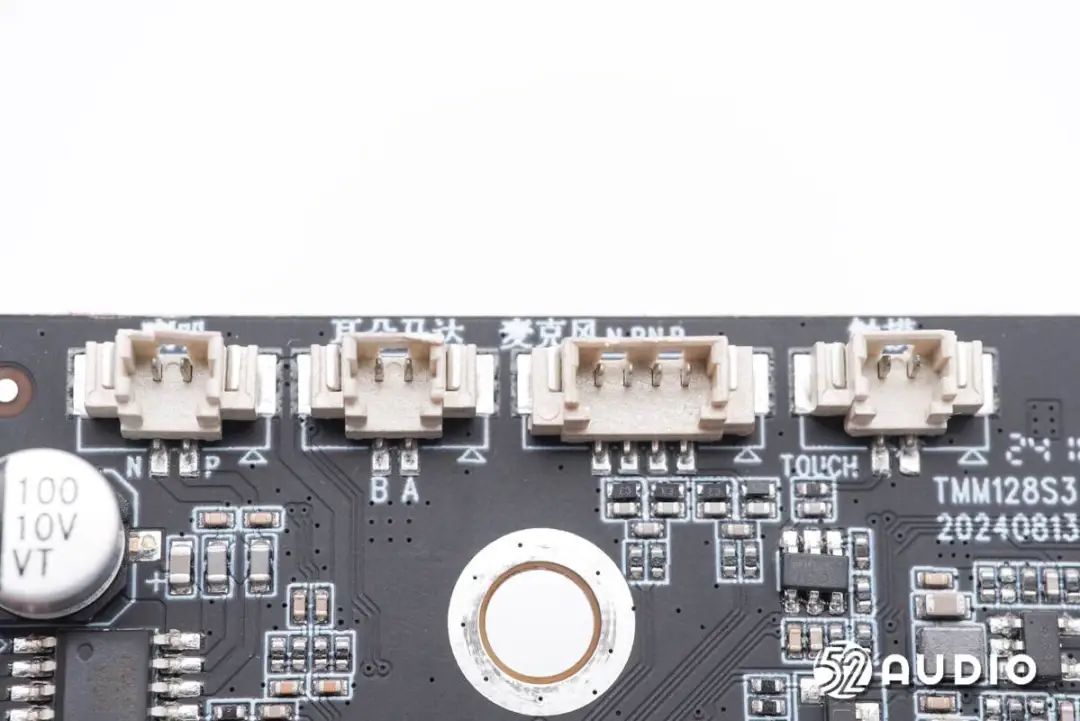 A close-up of the connectors for the speaker, ear motor, microphone, and touch wires, all printed with identification labels.
A close-up of the connectors for the speaker, ear motor, microphone, and touch wires, all printed with identification labels.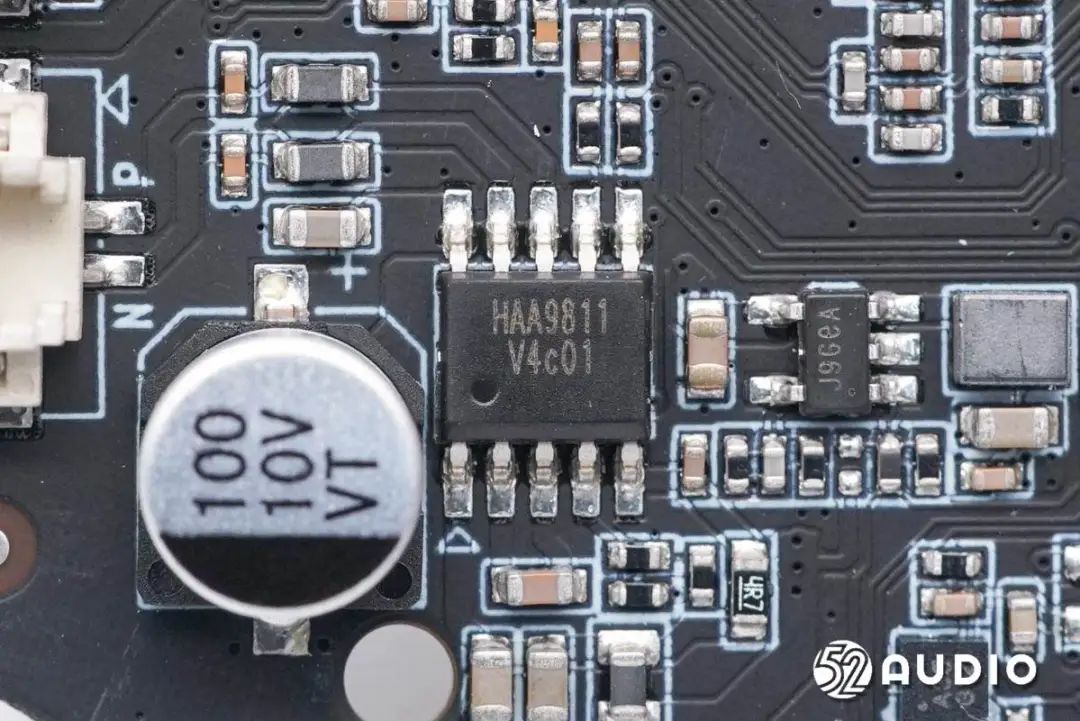 The HYNITRON HAA9811 mono audio power amplifier is used to drive the speaker.
The HYNITRON HAA9811 mono audio power amplifier is used to drive the speaker.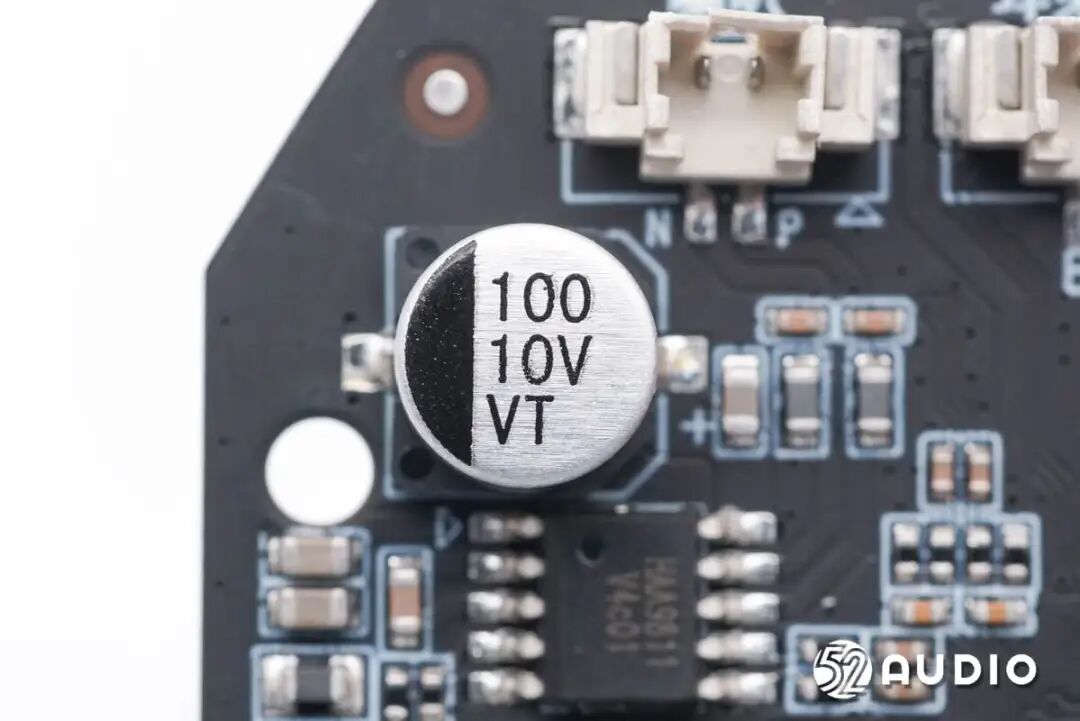 A close-up of the 100μF 10V rated voltage filter capacitor.
A close-up of the 100μF 10V rated voltage filter capacitor.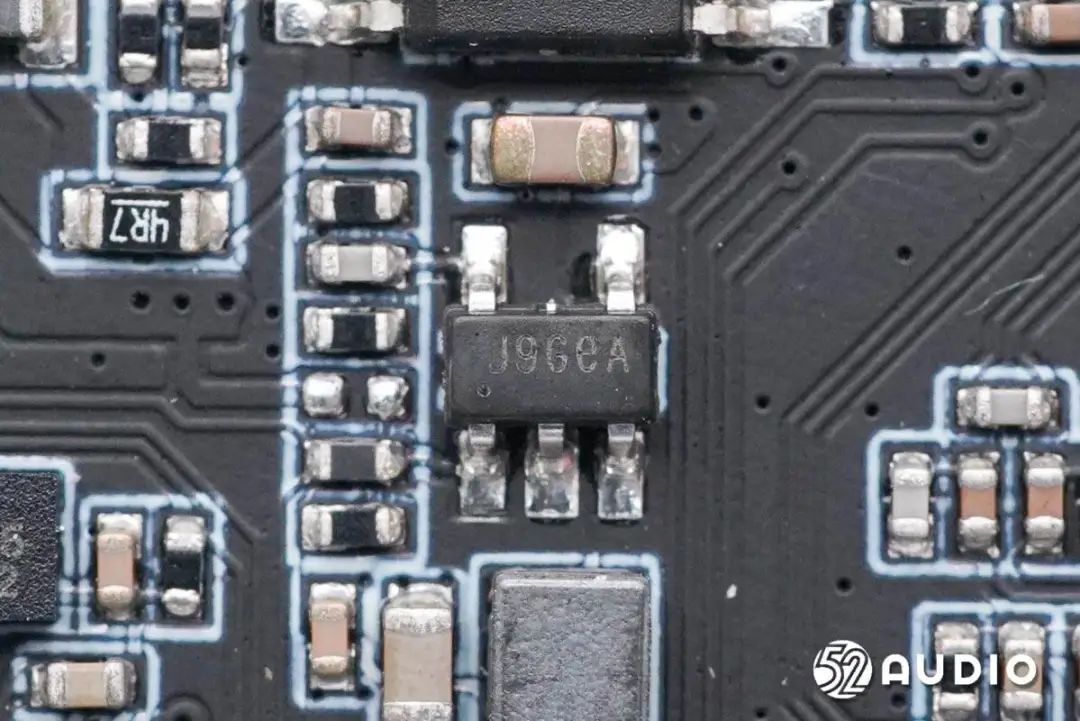 IC printed with J9GeA.
IC printed with J9GeA.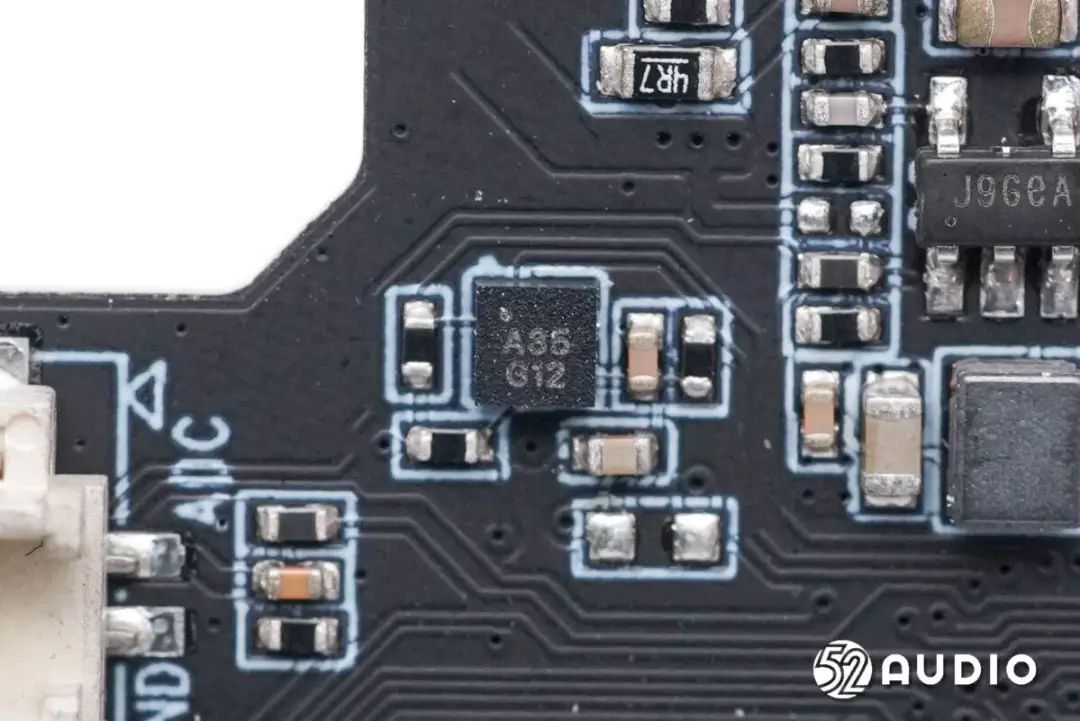 IC printed with A35 G12.
IC printed with A35 G12.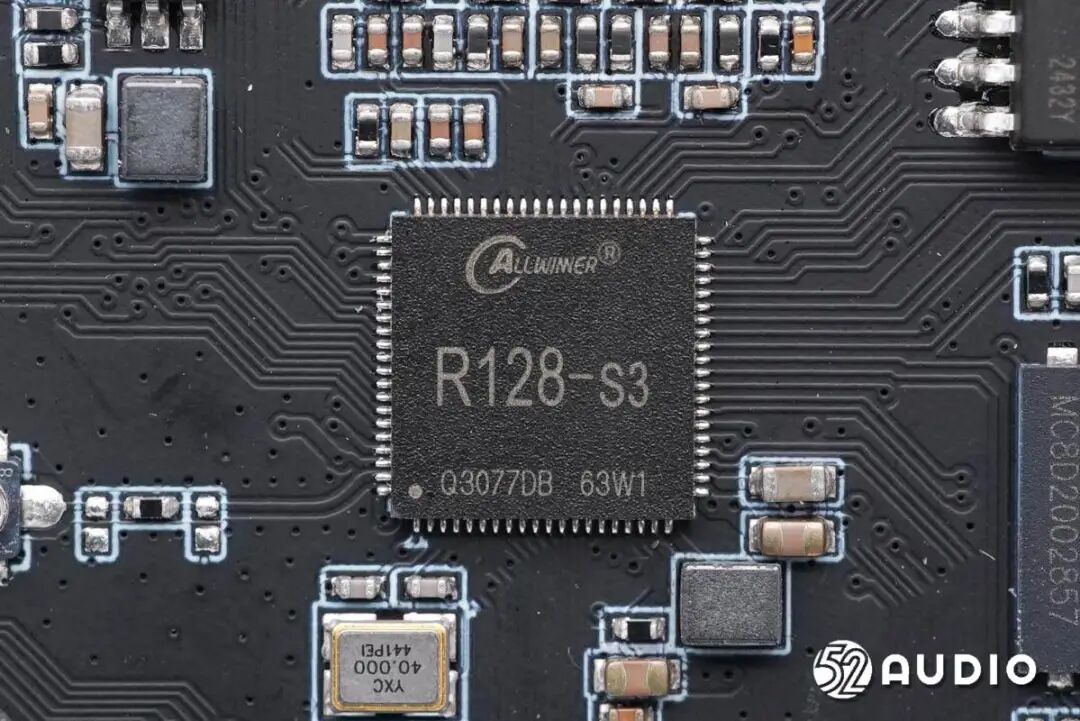 The ALLWINNER R128-S3 high-integration wireless audio SoC is suitable for high-performance far-field and AI-based voice recognition applications. The ALLWINNER R128 chip features a dual-core architecture of RISC-V XuanTie C906 + Arm CortexM33, providing powerful computing capabilities; it integrates a HiFi5 DSP dedicated processing unit for AI voice interaction, along with integratedAudio Codec and common audio interfaces, optimizing voice processing and audio output comprehensively, delivering a high-quality voice interaction experience; it integrates three differential ADCs and two differential DACs for microphone array-based voice recognition and stereo audio playback solutions.The ALLWINNER R128 chip also integrates a JPEG encoder, RGB display engine, and 2D graphics acceleration system, enabling it to handle some display applications; additionally, it supports WLAN 2.4G + Bluetooth V5.0 dual wireless communication protocols, allowing for various network applications and ensuring stable network connections.In terms of software resources, the intelligent language solution launched by ALLWINNER is equipped with a powerful AI large model, providing users with a highly technological interaction experience; by integrating advanced AI large models, it achieves voice interaction, emotion recognition, continuous dialogue, and bilingual interaction in Chinese and English, making communication smarter and more convenient. This solution also connects to the Ximalaya voice resource library, covering a vast array of content such as encyclopedias, songs, and fairy tales, tailored to provide a rich audio-visual feast for family users, meeting the needs of different age groups.
The ALLWINNER R128-S3 high-integration wireless audio SoC is suitable for high-performance far-field and AI-based voice recognition applications. The ALLWINNER R128 chip features a dual-core architecture of RISC-V XuanTie C906 + Arm CortexM33, providing powerful computing capabilities; it integrates a HiFi5 DSP dedicated processing unit for AI voice interaction, along with integratedAudio Codec and common audio interfaces, optimizing voice processing and audio output comprehensively, delivering a high-quality voice interaction experience; it integrates three differential ADCs and two differential DACs for microphone array-based voice recognition and stereo audio playback solutions.The ALLWINNER R128 chip also integrates a JPEG encoder, RGB display engine, and 2D graphics acceleration system, enabling it to handle some display applications; additionally, it supports WLAN 2.4G + Bluetooth V5.0 dual wireless communication protocols, allowing for various network applications and ensuring stable network connections.In terms of software resources, the intelligent language solution launched by ALLWINNER is equipped with a powerful AI large model, providing users with a highly technological interaction experience; by integrating advanced AI large models, it achieves voice interaction, emotion recognition, continuous dialogue, and bilingual interaction in Chinese and English, making communication smarter and more convenient. This solution also connects to the Ximalaya voice resource library, covering a vast array of content such as encyclopedias, songs, and fairy tales, tailored to provide a rich audio-visual feast for family users, meeting the needs of different age groups.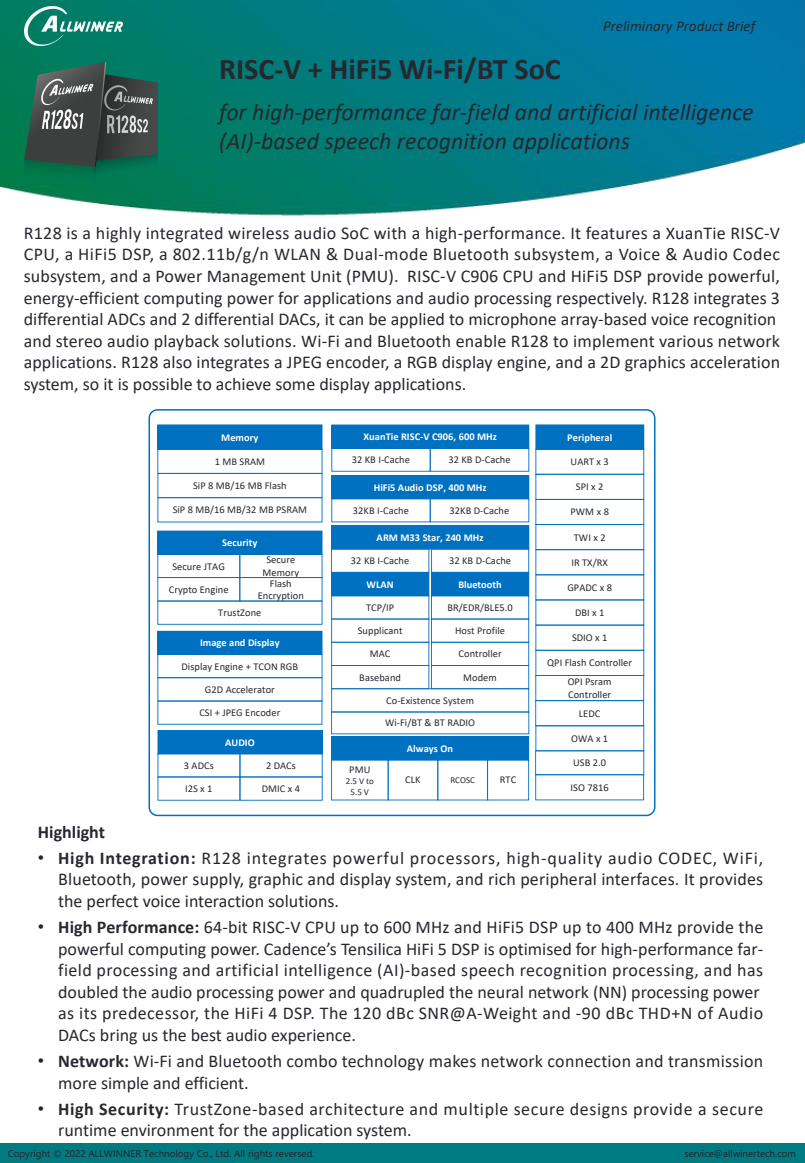
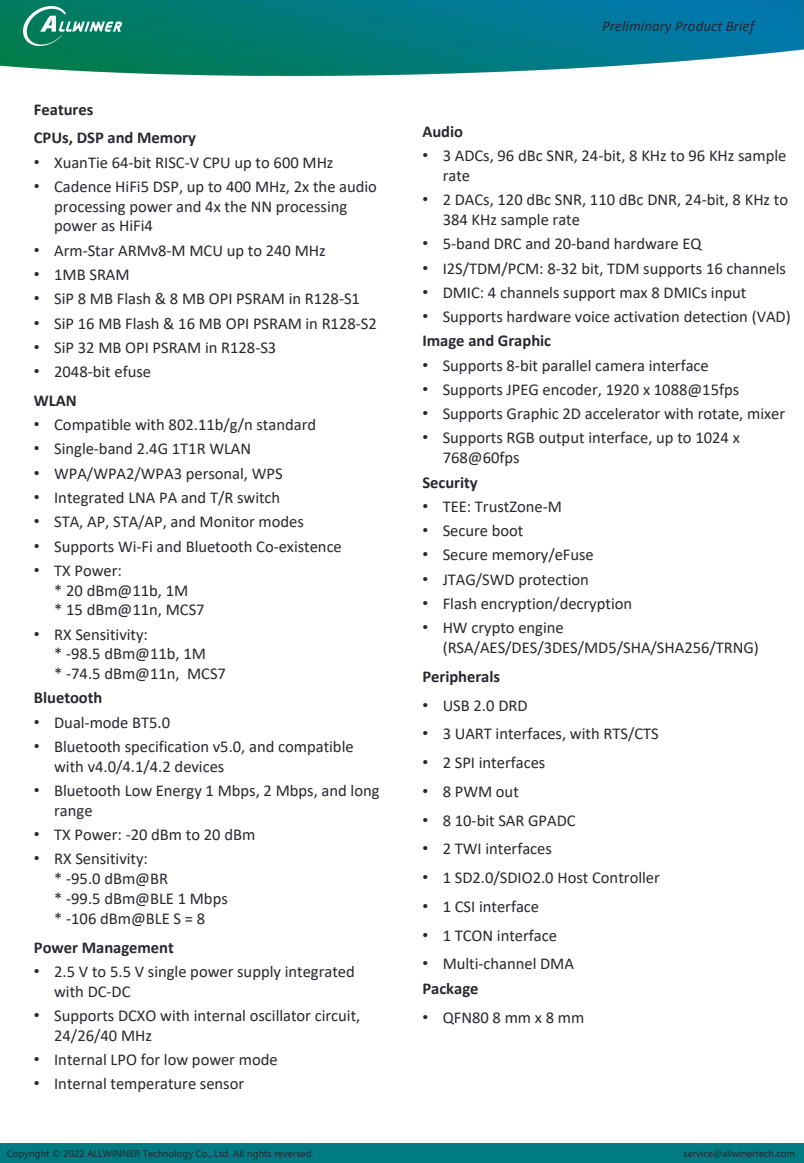 Detailed information on the ALLWINNER R128 series.
Detailed information on the ALLWINNER R128 series.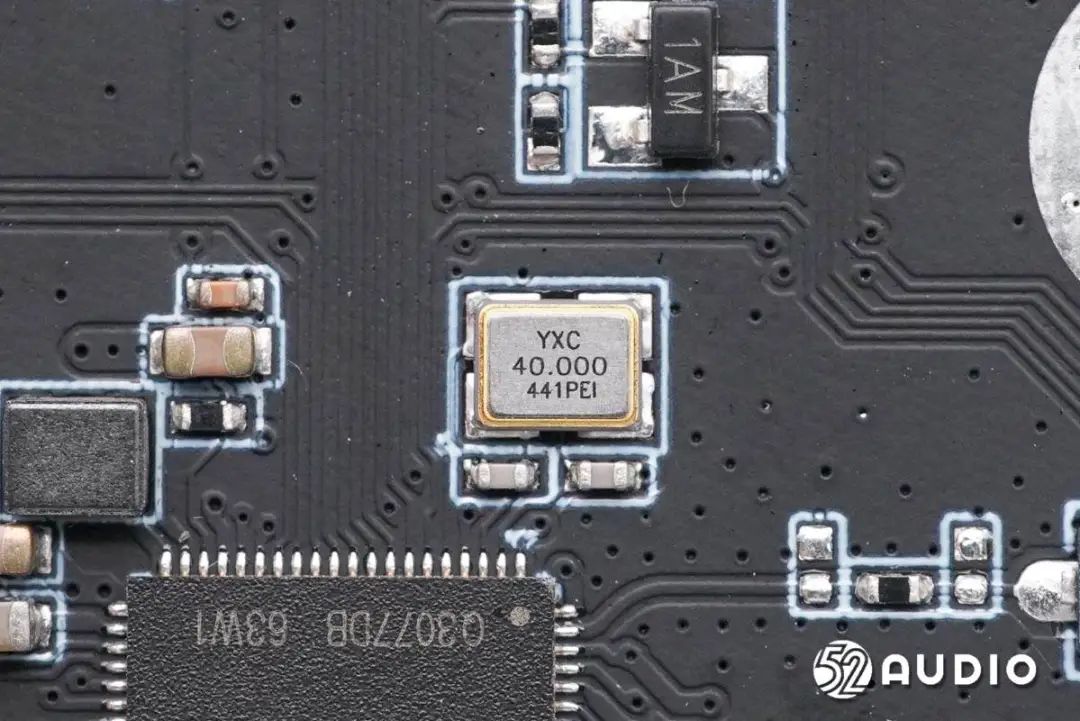 A close-up of the 40.000MHz crystal oscillator, providing clock for the wireless audio SoC.
A close-up of the 40.000MHz crystal oscillator, providing clock for the wireless audio SoC.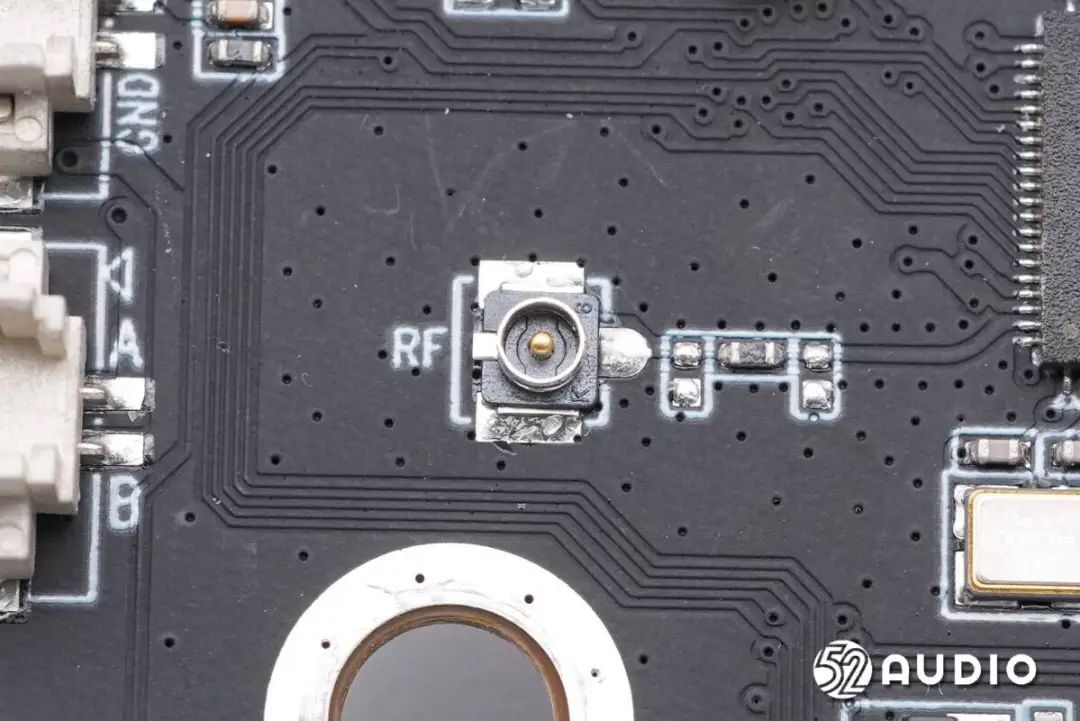 A close-up of the coaxial female connector for the WiFi antenna.
A close-up of the coaxial female connector for the WiFi antenna.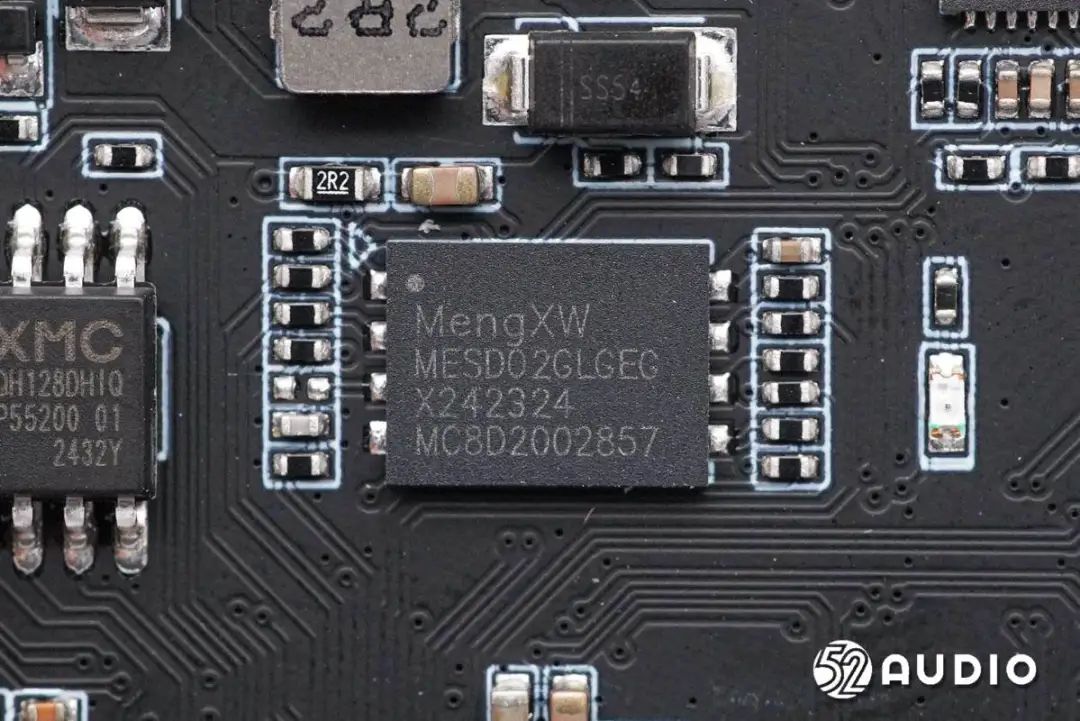 The memory printed with MESD02GLGEG.
The memory printed with MESD02GLGEG.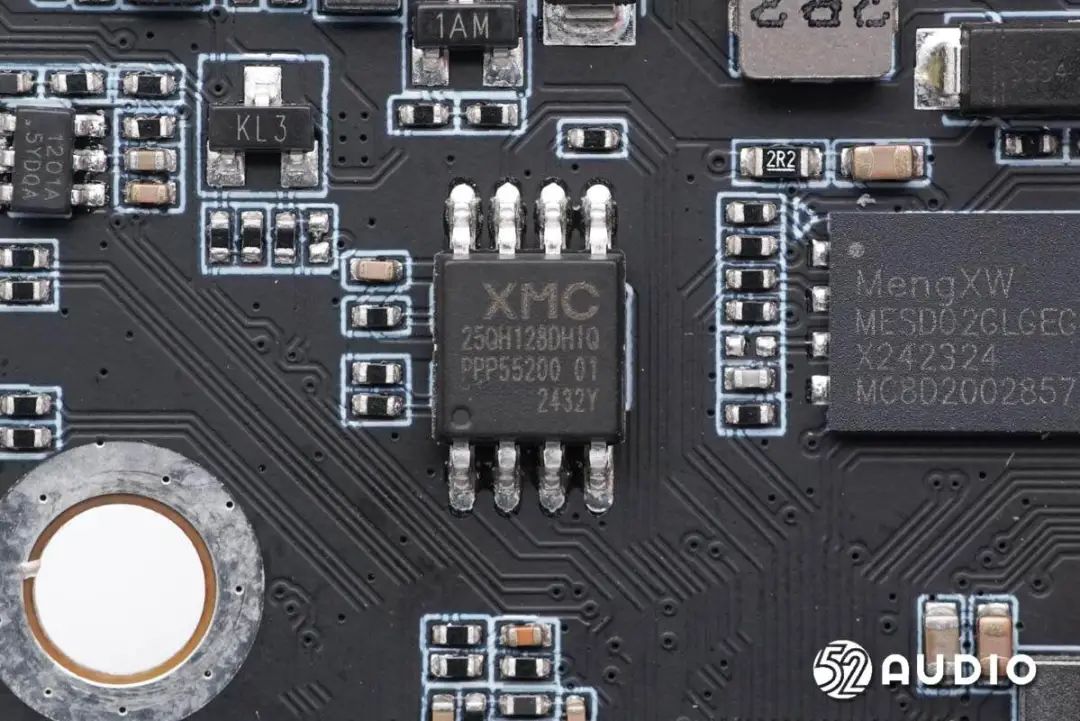 The XMC Wuhan Xinxin XM25QH128D SPI NOR flash memory is designed to operate under a single power supply of 2.7 to 3.6V, with a current consumption as low as 0.2μA in deep power-down mode, during which program code is copied from flash memory to embedded or external RAM for execution. The device’s flexible erase architecture and page erase granularity are well-suited for data storage, eliminating the need for additional data storage devices.
The XMC Wuhan Xinxin XM25QH128D SPI NOR flash memory is designed to operate under a single power supply of 2.7 to 3.6V, with a current consumption as low as 0.2μA in deep power-down mode, during which program code is copied from flash memory to embedded or external RAM for execution. The device’s flexible erase architecture and page erase granularity are well-suited for data storage, eliminating the need for additional data storage devices. Detailed information on the XMC Wuhan Xinxin XM25QH128D.
Detailed information on the XMC Wuhan Xinxin XM25QH128D.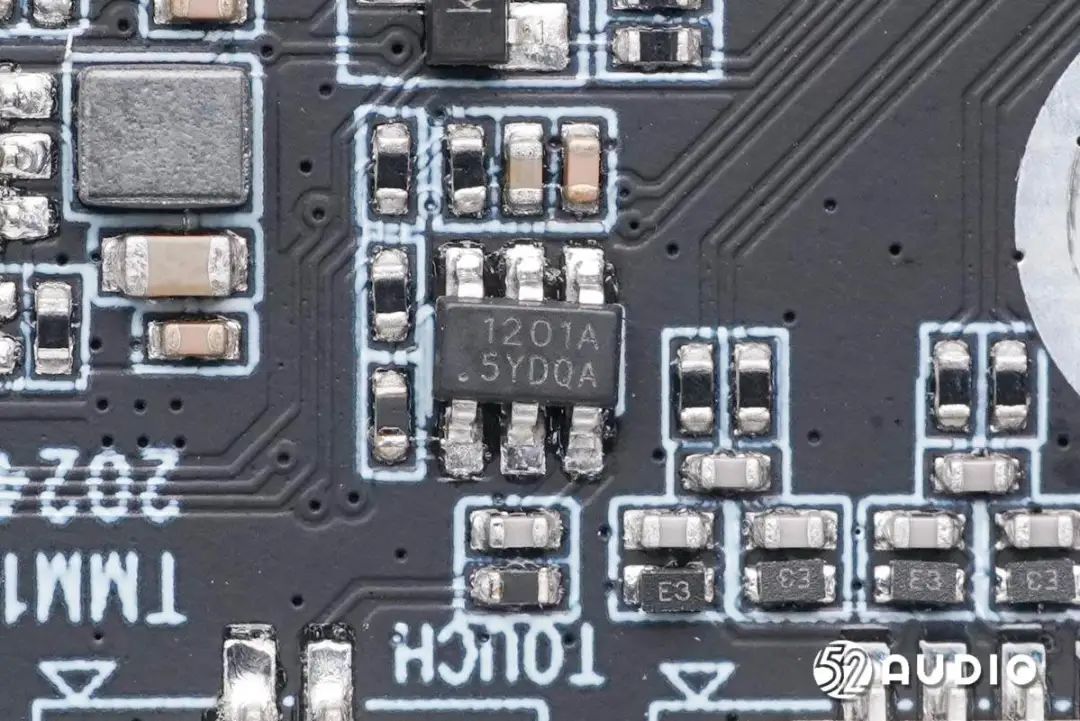 IC printed with 1201A.
IC printed with 1201A.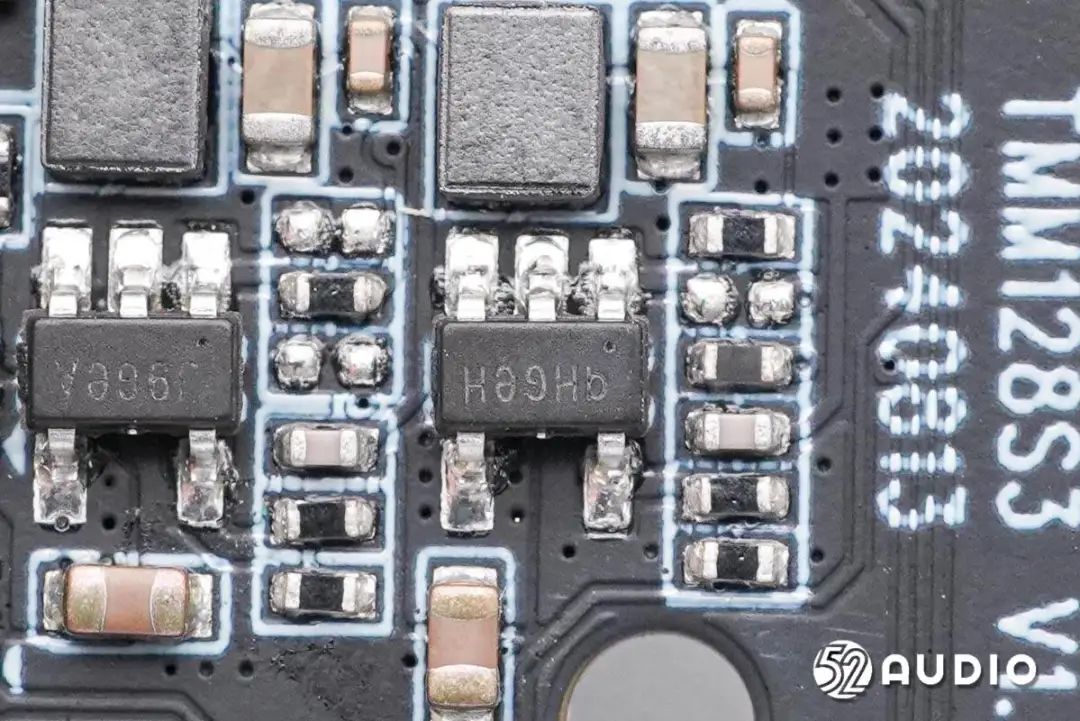 IC printed with qHGeH.
IC printed with qHGeH.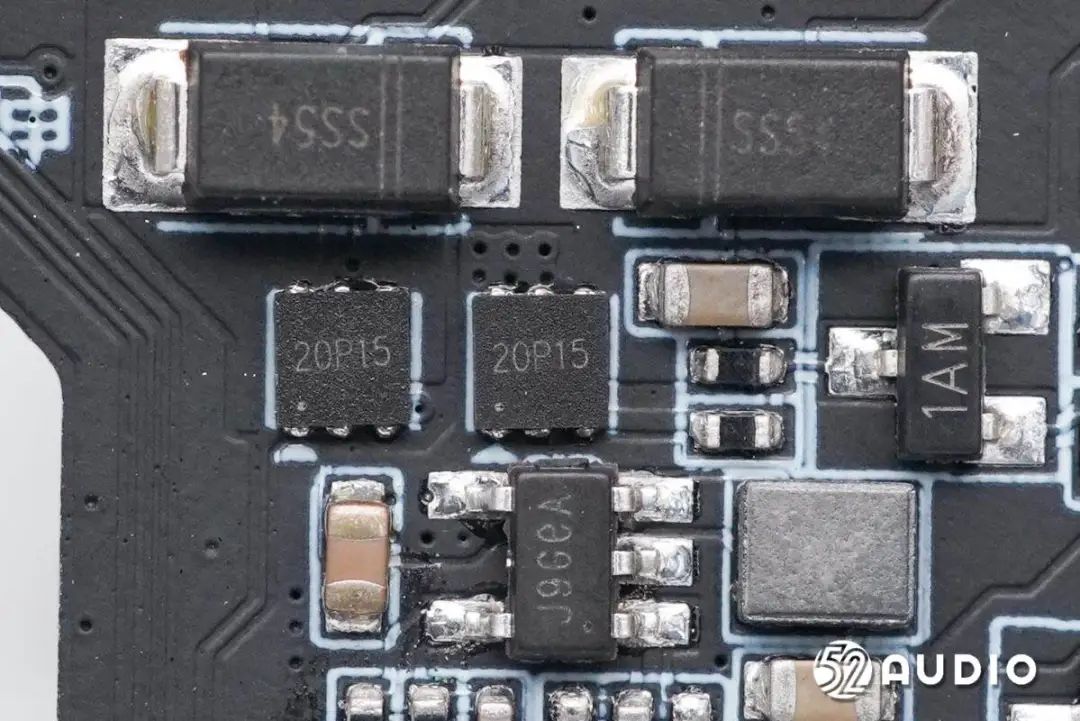 Two ICs printed with 20P15.
Two ICs printed with 20P15.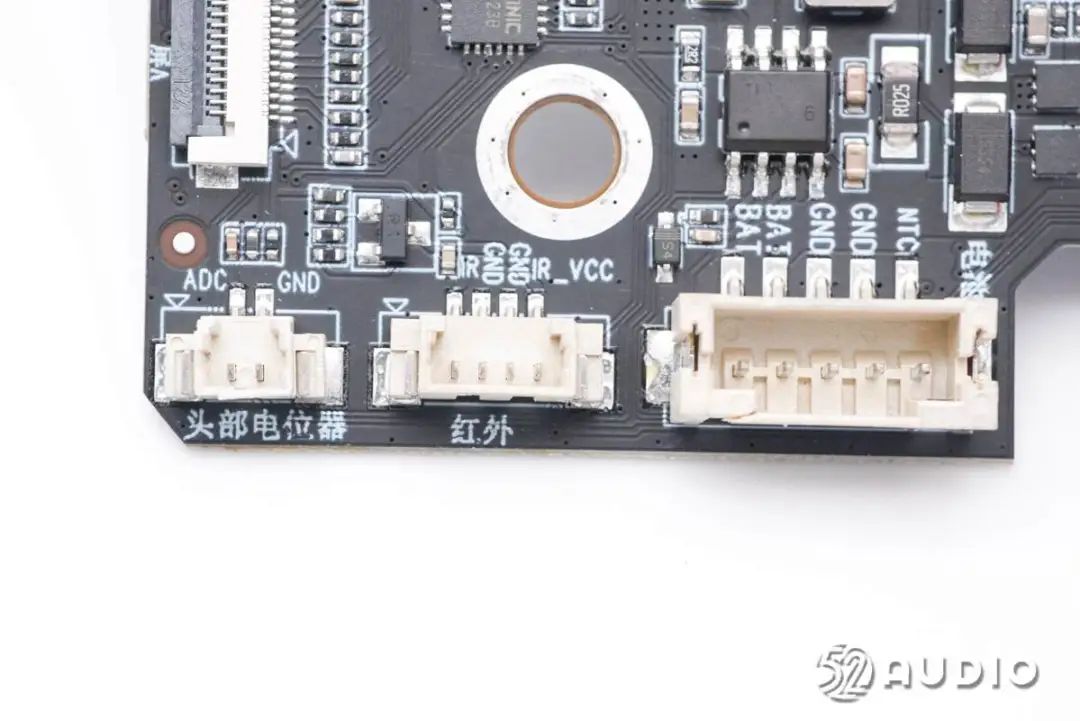 The connector for the head potentiometer, infrared, and battery wires.
The connector for the head potentiometer, infrared, and battery wires.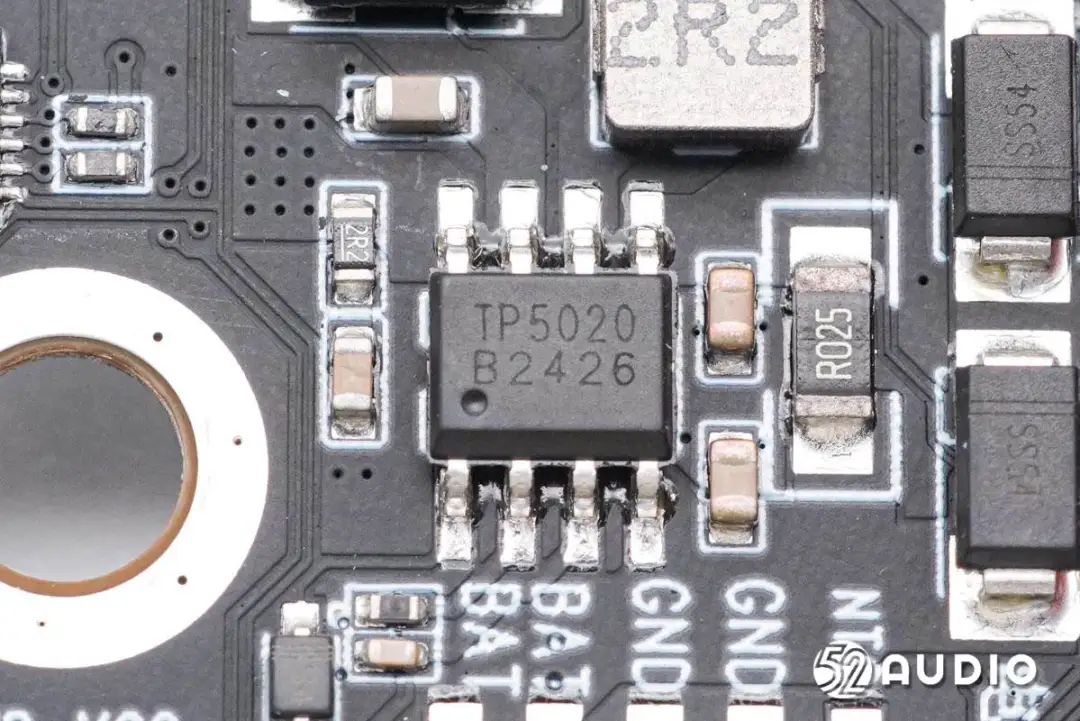 The TP5020 battery charging management chip, responsible for charging the built-in battery.
The TP5020 battery charging management chip, responsible for charging the built-in battery.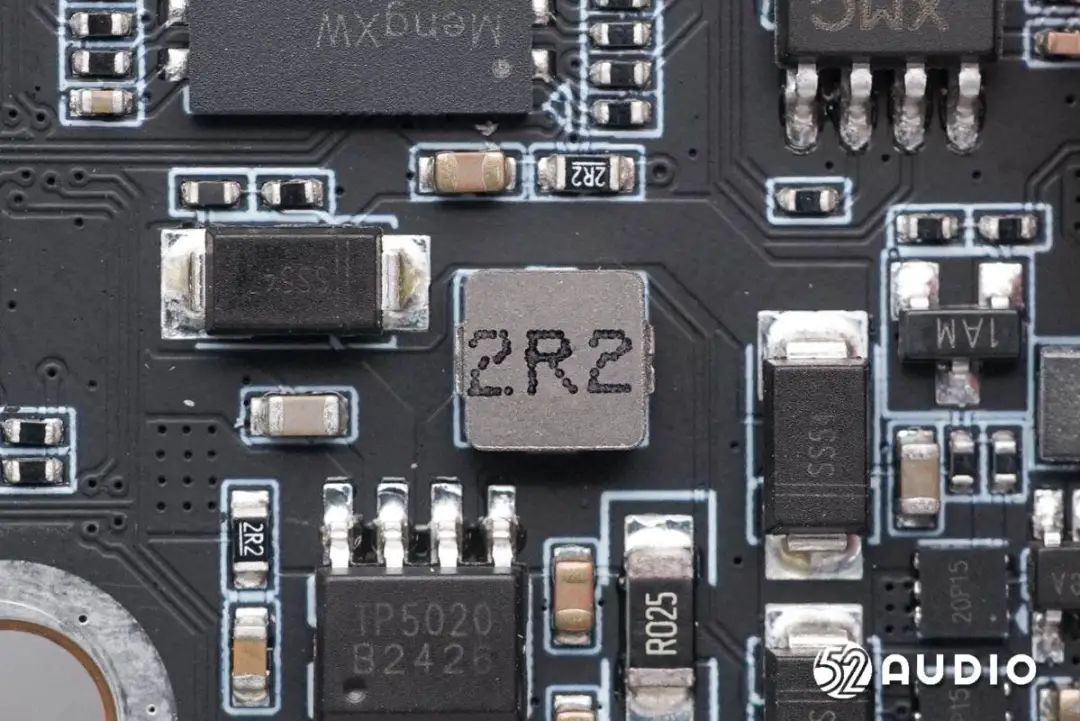 A close-up of the peripheral power inductor for the power management chip.
A close-up of the peripheral power inductor for the power management chip.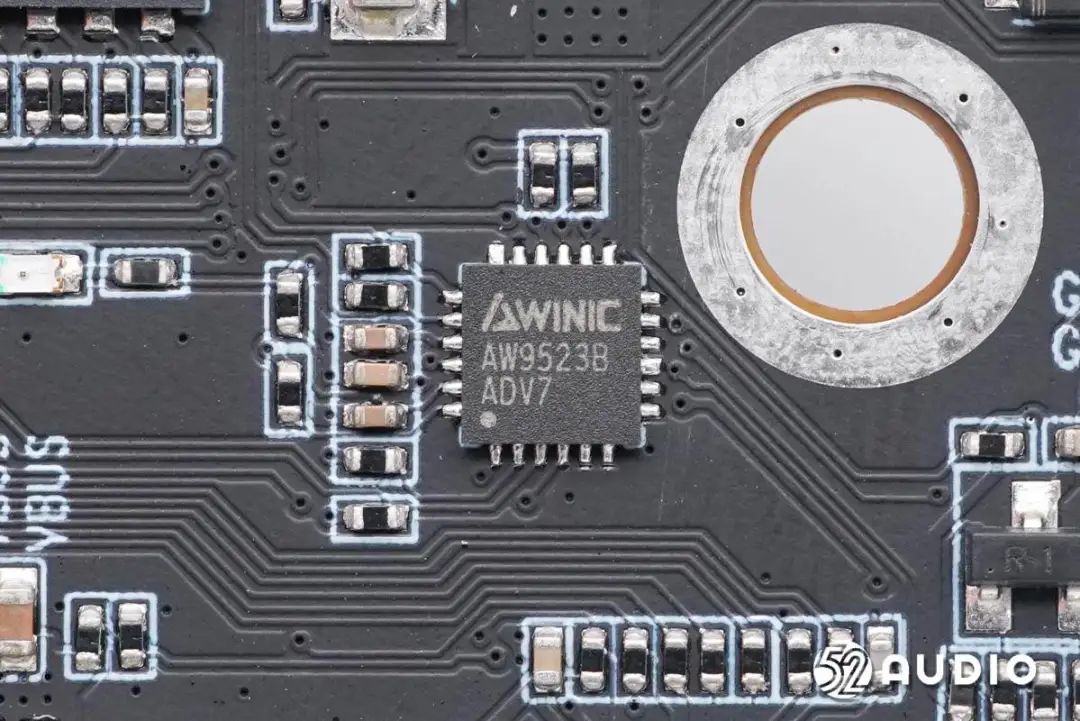 The Shanghai Aiwei Electronics AW9523B LED driver is an I²C interface, 16-channel breathing light, with each channel capable of being used as an expanded GPIO controller.
The Shanghai Aiwei Electronics AW9523B LED driver is an I²C interface, 16-channel breathing light, with each channel capable of being used as an expanded GPIO controller.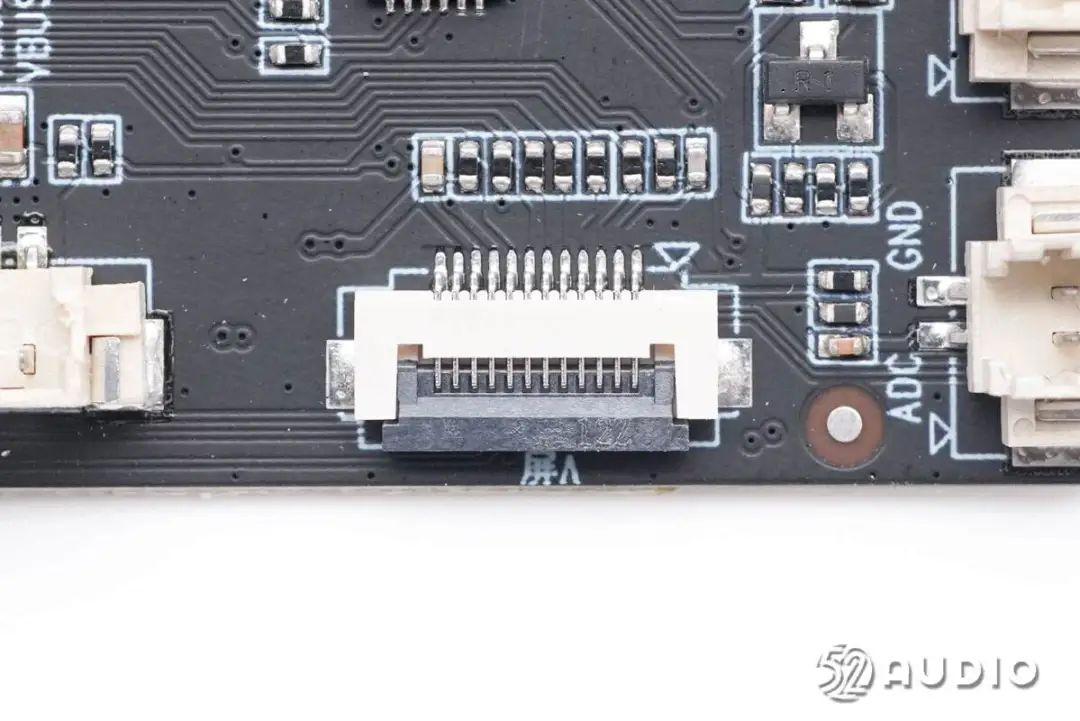 The ZIF connector for connecting the eye screen.A close-up of the connector.
The ZIF connector for connecting the eye screen.A close-up of the connector.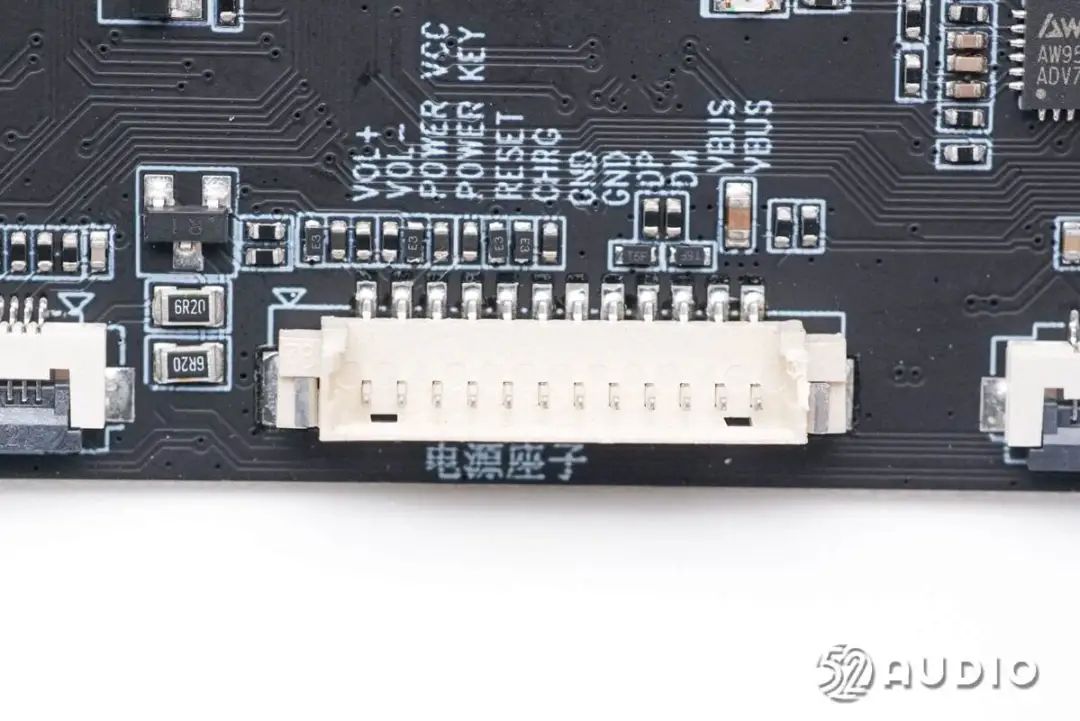 The wire socket for connecting the power socket.
The wire socket for connecting the power socket.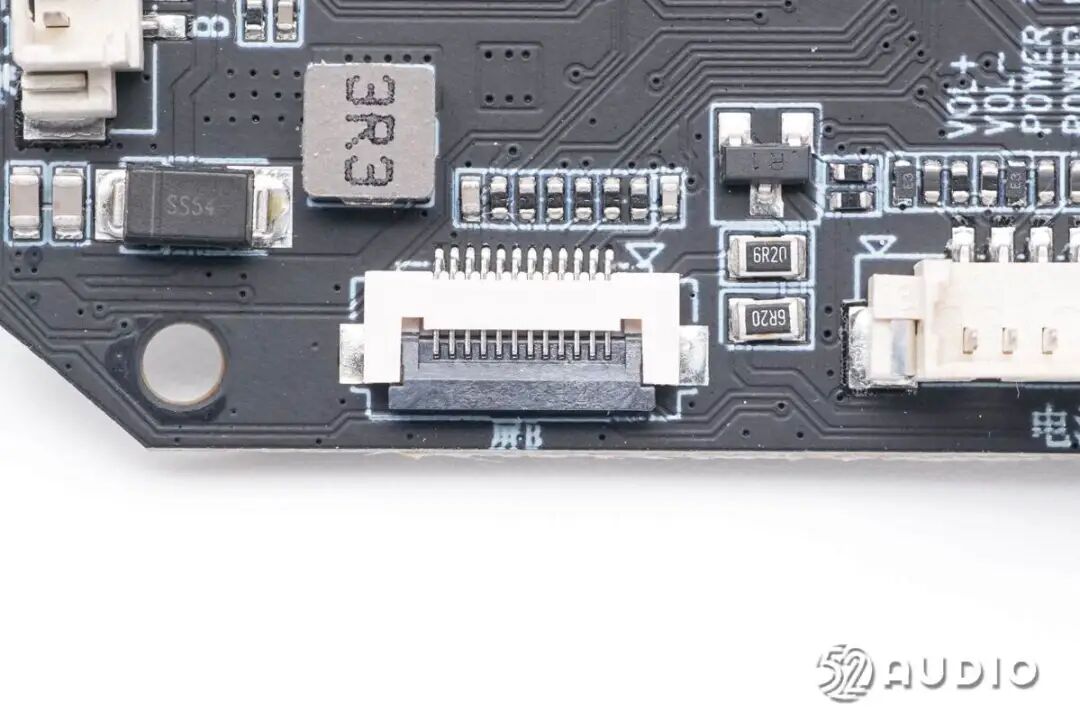 Another ZIF connector for connecting the eye screen.
Another ZIF connector for connecting the eye screen.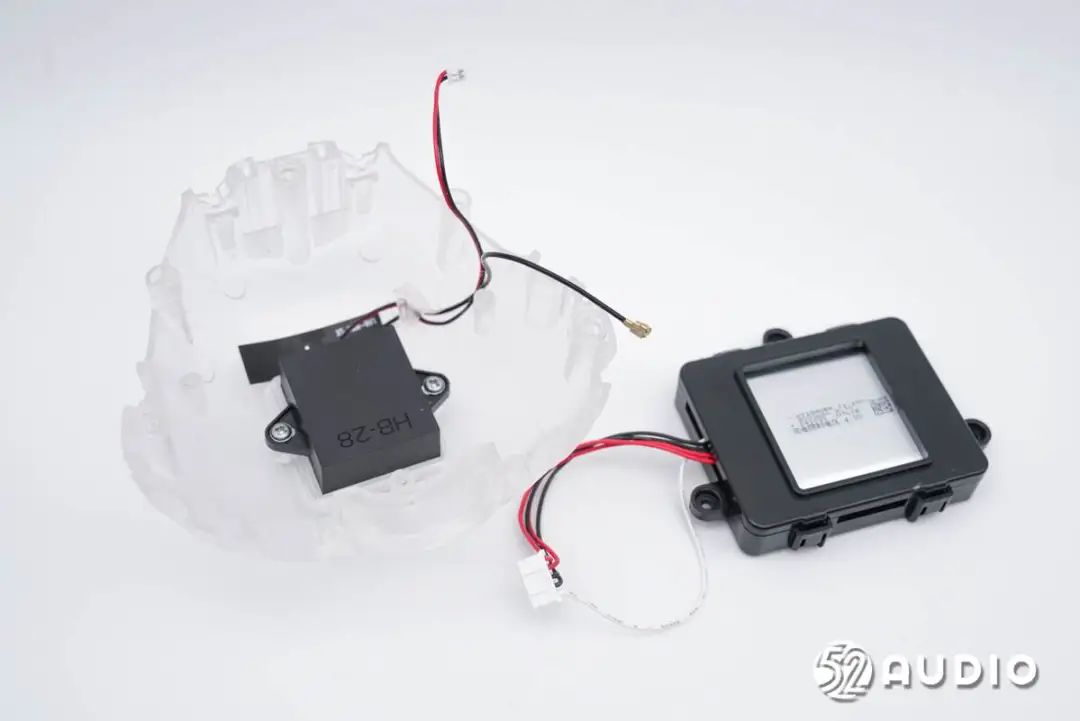 Remove the screws and take out the battery cavity.
Remove the screws and take out the battery cavity.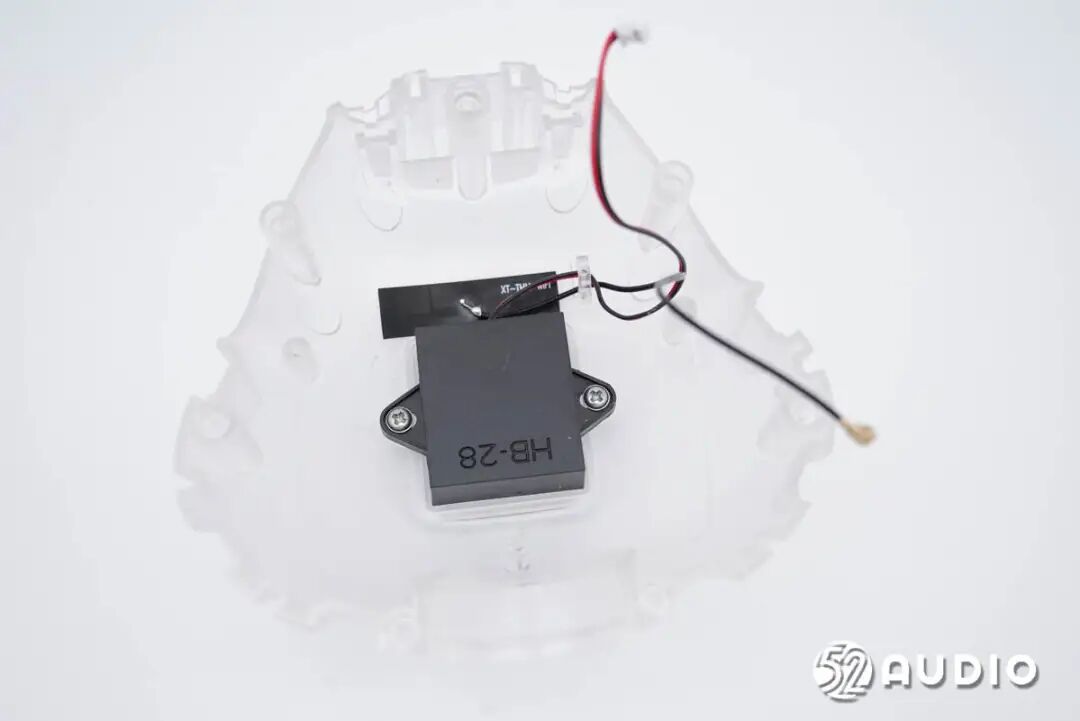 An overview of the speaker unit structure at the bottom of the transparent bracket. The inside is also attached to the WiFi antenna.
An overview of the speaker unit structure at the bottom of the transparent bracket. The inside is also attached to the WiFi antenna.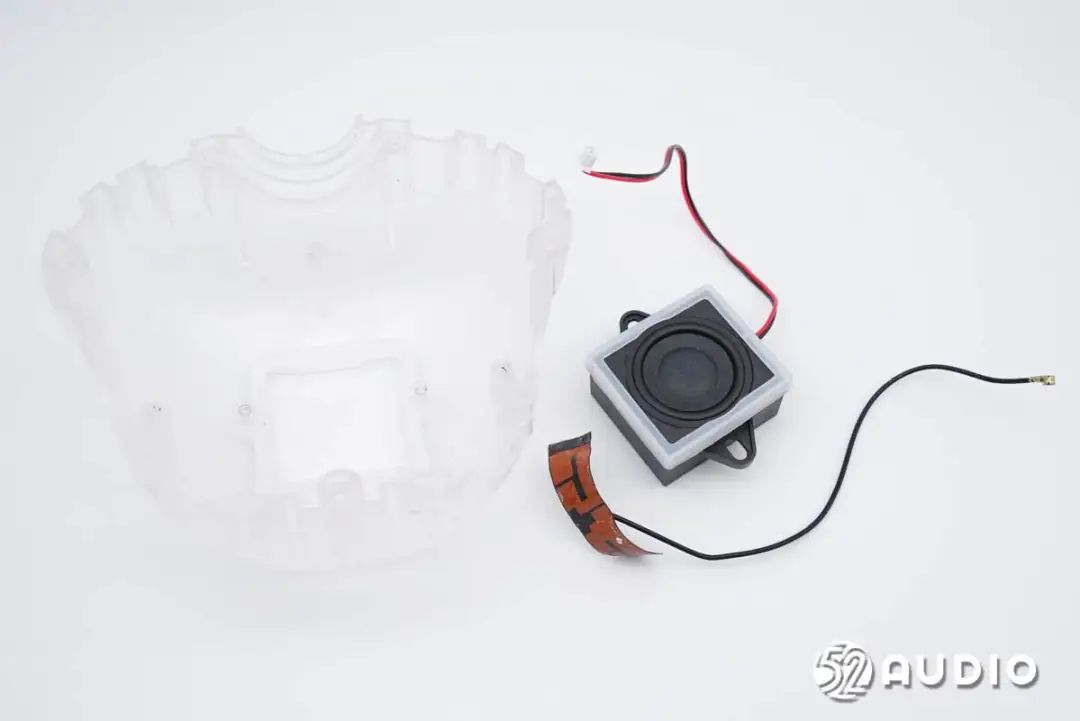 Remove the speaker and antenna.
Remove the speaker and antenna.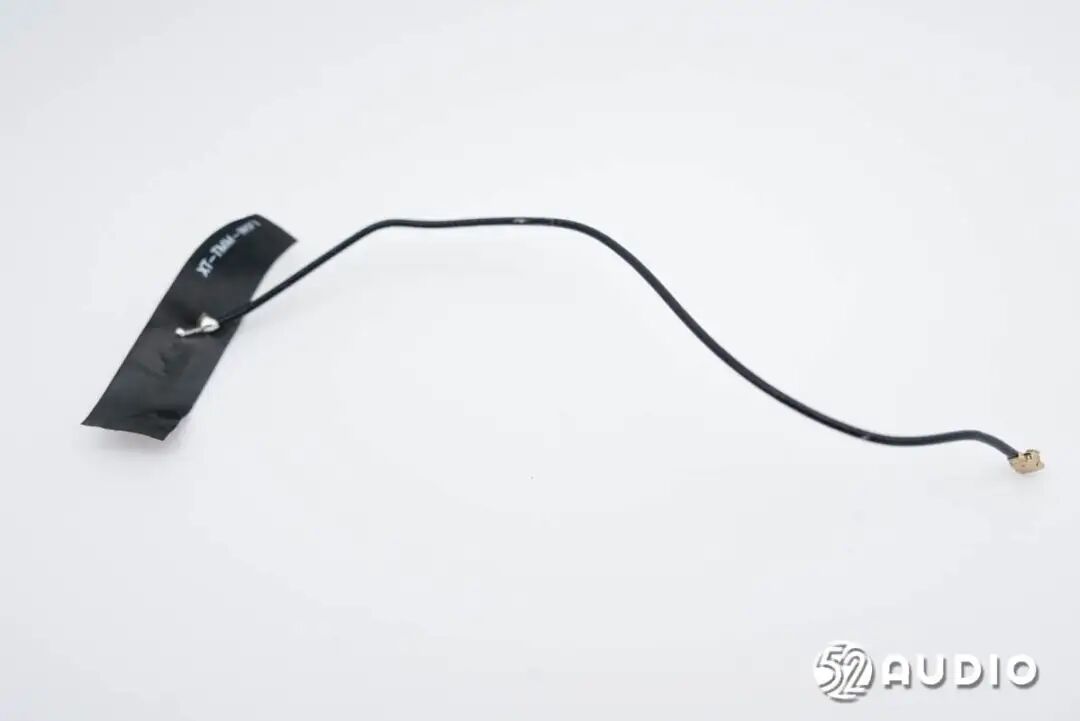 A close-up of the coaxial WiFi antenna module.
A close-up of the coaxial WiFi antenna module.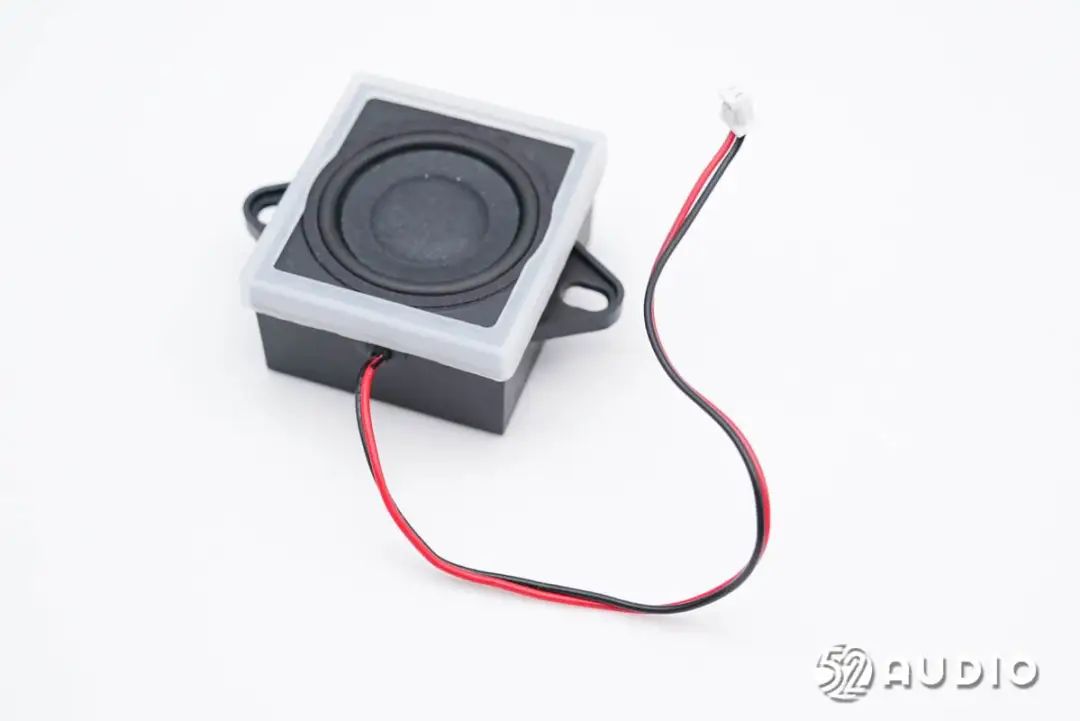 An overview of the speaker unit structure.
An overview of the speaker unit structure.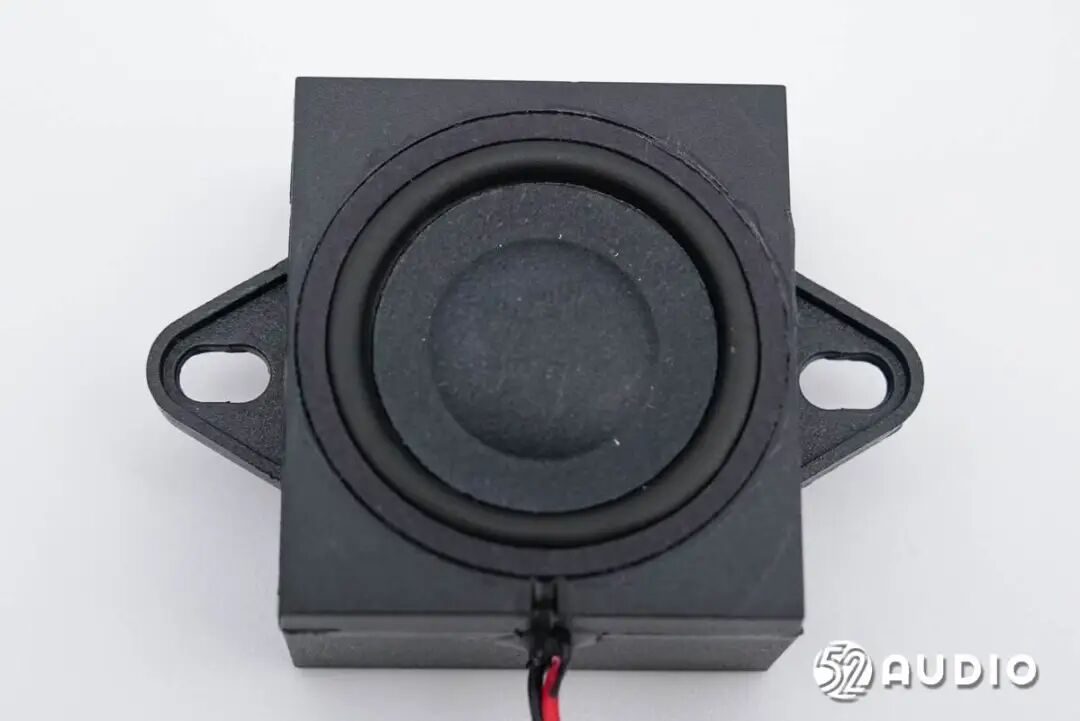 A close-up of the speaker diaphragm, made of paper cone and rubber ring.
A close-up of the speaker diaphragm, made of paper cone and rubber ring.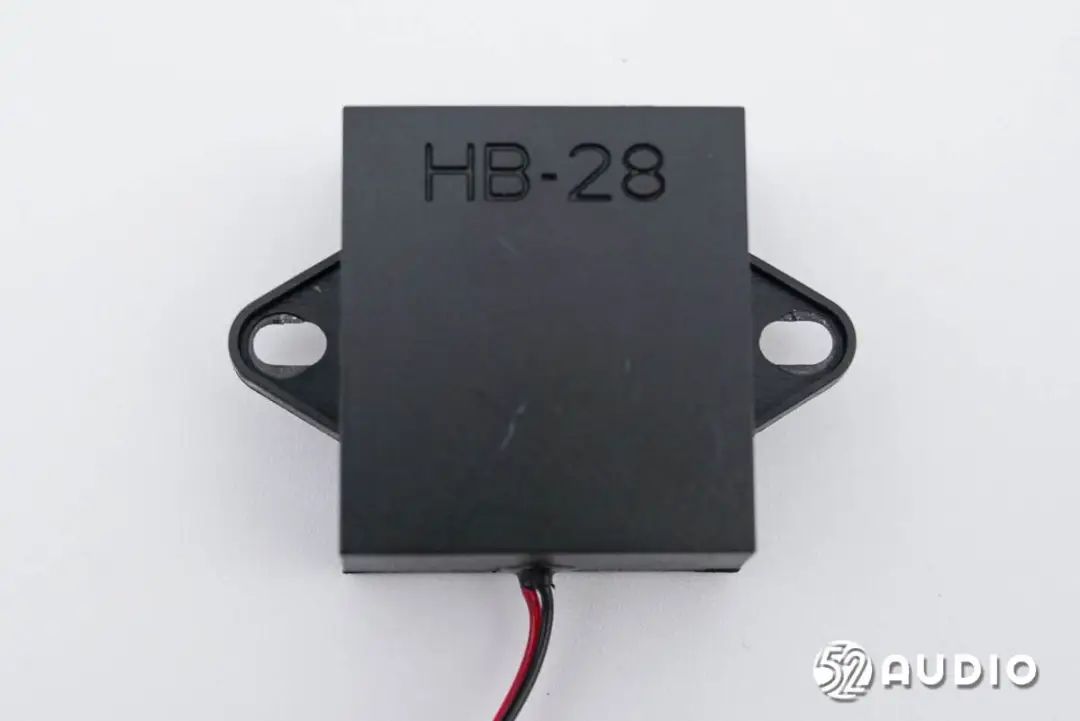 The back of the speaker cavity is engraved with the model information “HB-28”.
The back of the speaker cavity is engraved with the model information “HB-28”.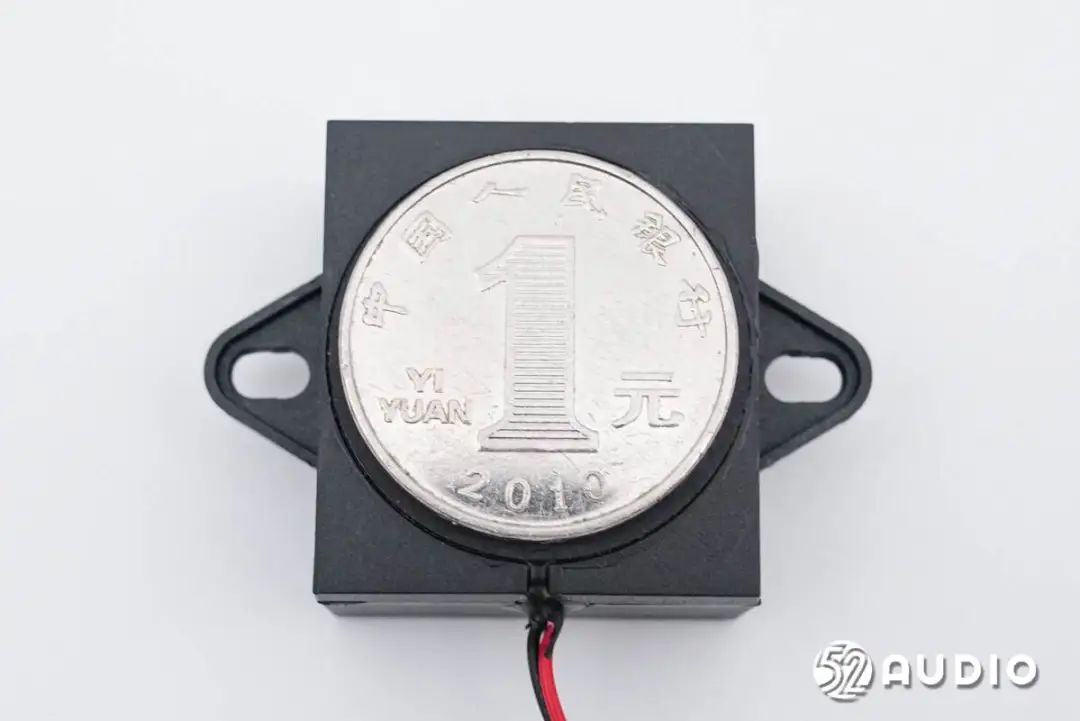 A comparison of the speaker with a one-yuan coin.
A comparison of the speaker with a one-yuan coin.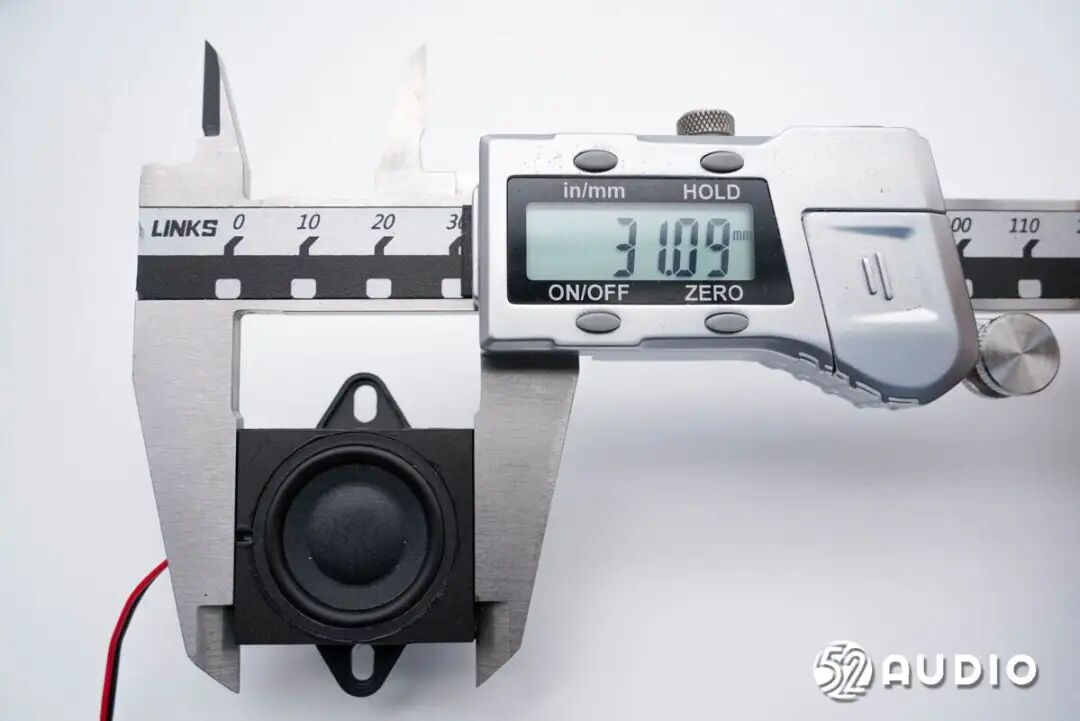 According to tests conducted by I Love Audio Network, the speaker module is approximately 31mm in length.
According to tests conducted by I Love Audio Network, the speaker module is approximately 31mm in length.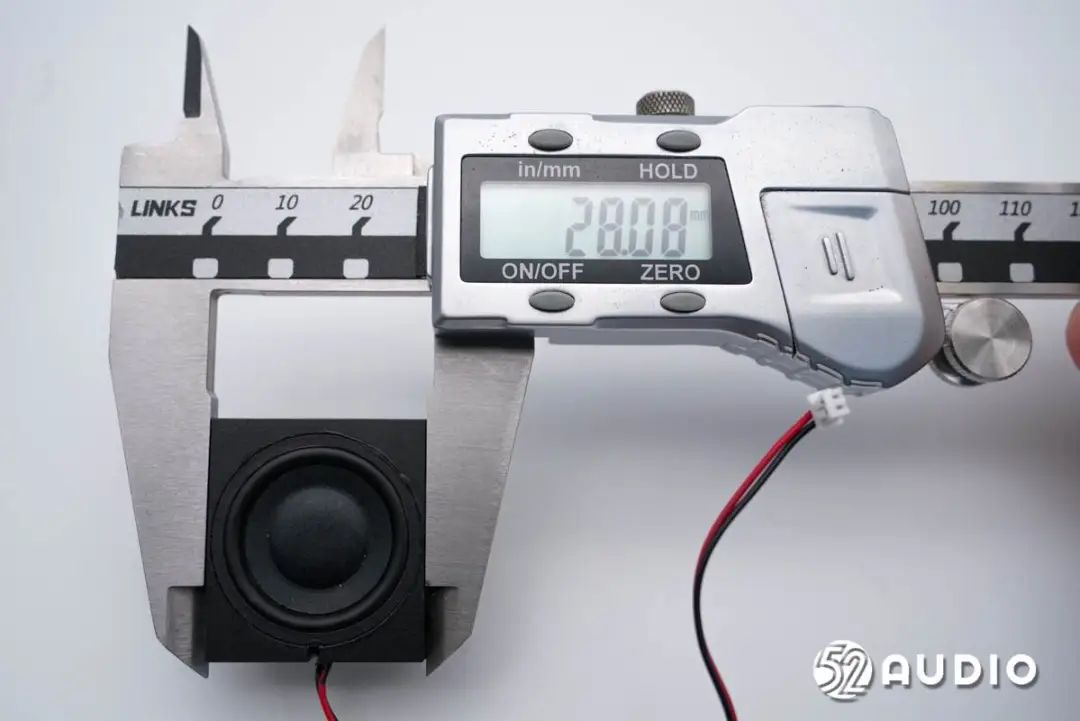 Approximately 28mm in width.
Approximately 28mm in width.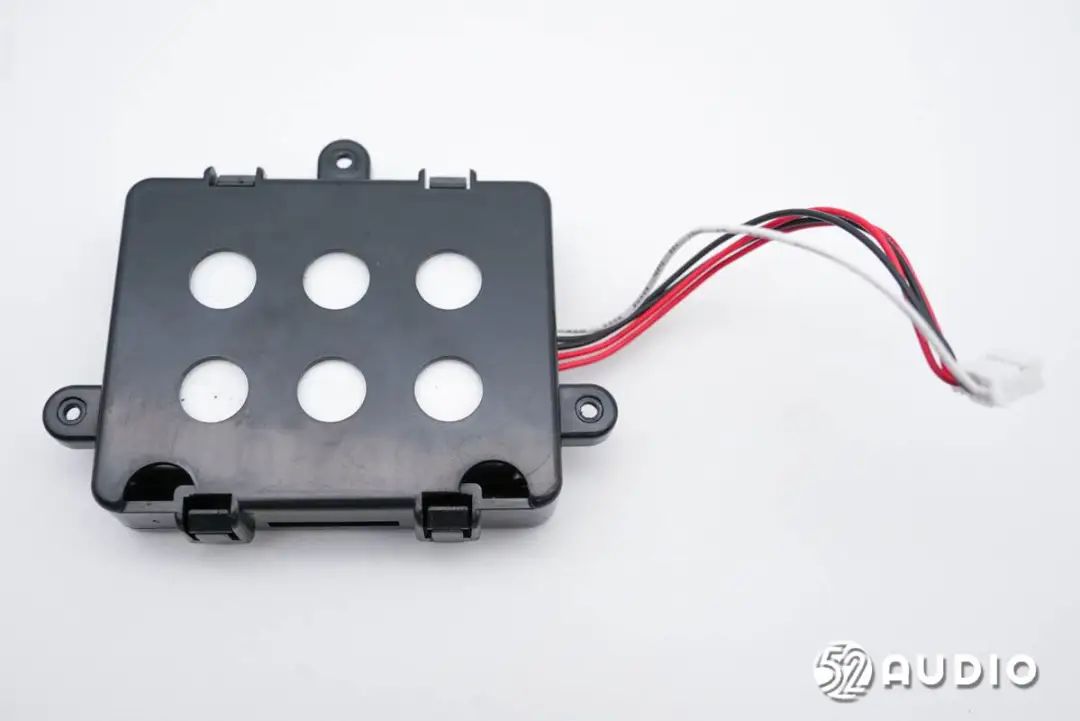 An overview of the battery unit structure. It has an independent cavity, providing better protection.
An overview of the battery unit structure. It has an independent cavity, providing better protection.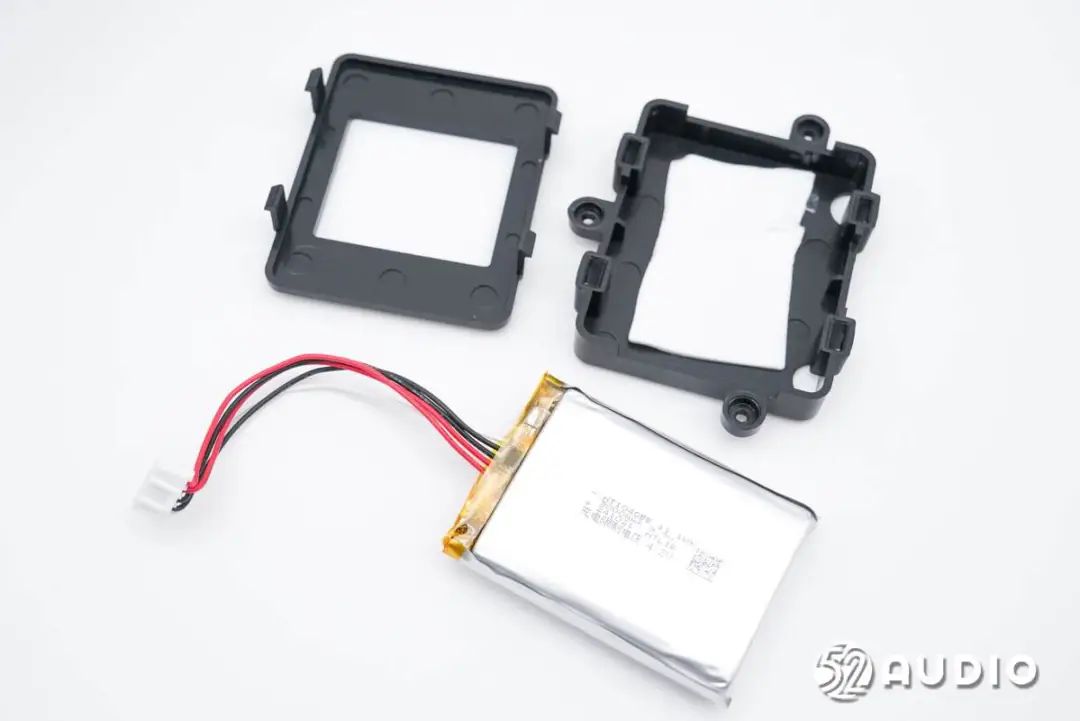 Open the cavity and take out the battery unit.
Open the cavity and take out the battery unit.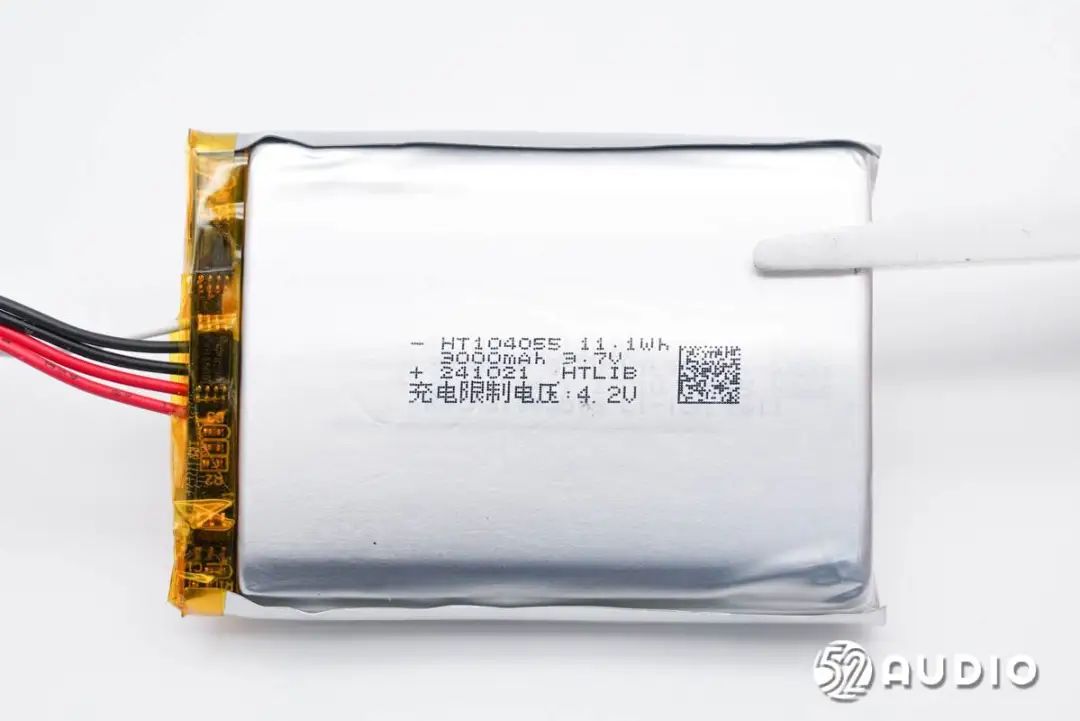 The built-in lithium battery model: HT104055, rated capacity: 3000mAh 11.1Wh, nominal voltage: 3.7V, charging limit voltage: 4.2V, from HT Hengtai Technology.
The built-in lithium battery model: HT104055, rated capacity: 3000mAh 11.1Wh, nominal voltage: 3.7V, charging limit voltage: 4.2V, from HT Hengtai Technology.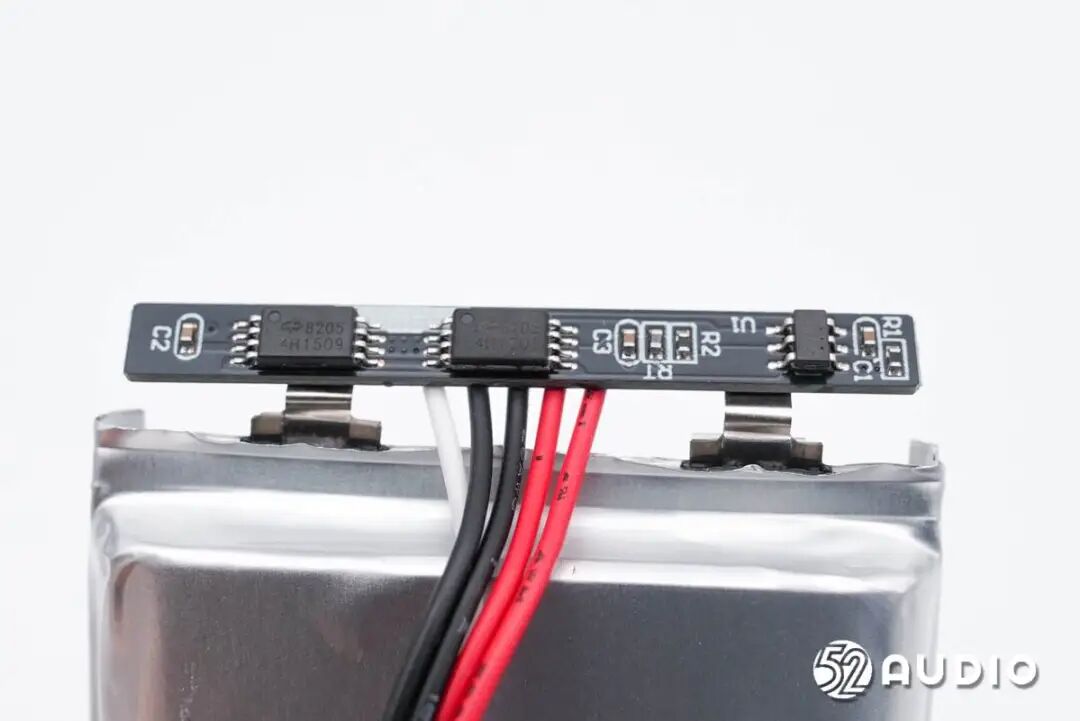 Peel off the external insulation protection, and an overview of the circuit on one side of the battery protection board.
Peel off the external insulation protection, and an overview of the circuit on one side of the battery protection board.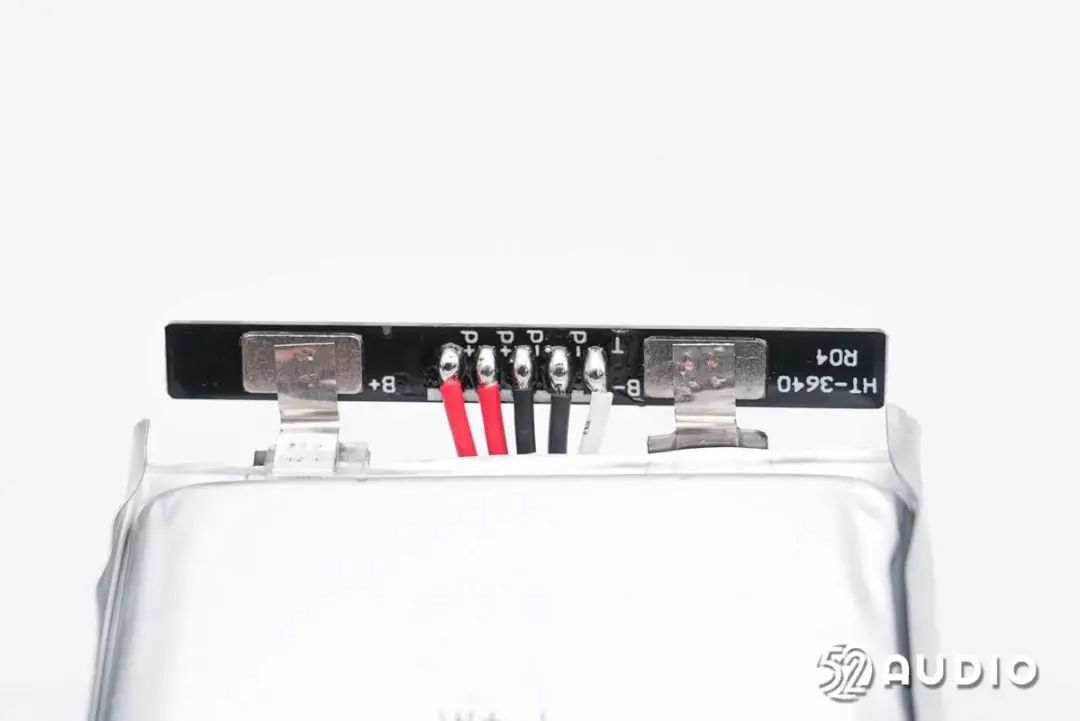 An overview of the circuit on the other side of the battery protection board.
An overview of the circuit on the other side of the battery protection board.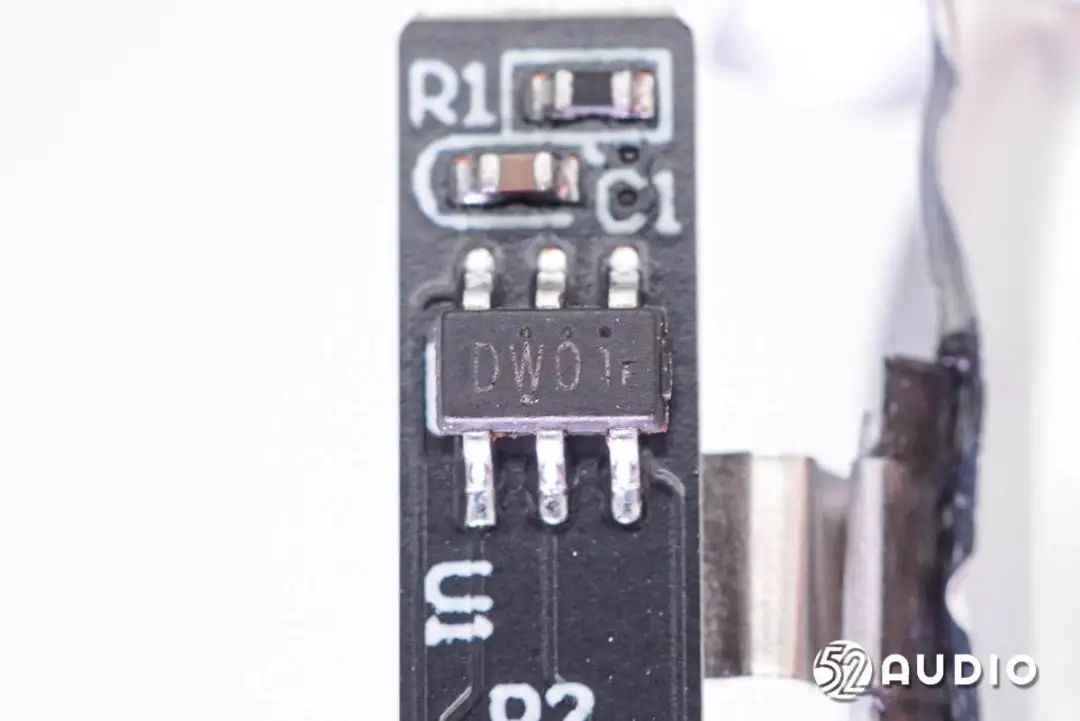 The DW01F lithium battery protection IC, responsible for overcharging, over-discharging, and over-current protection of the battery.
The DW01F lithium battery protection IC, responsible for overcharging, over-discharging, and over-current protection of the battery.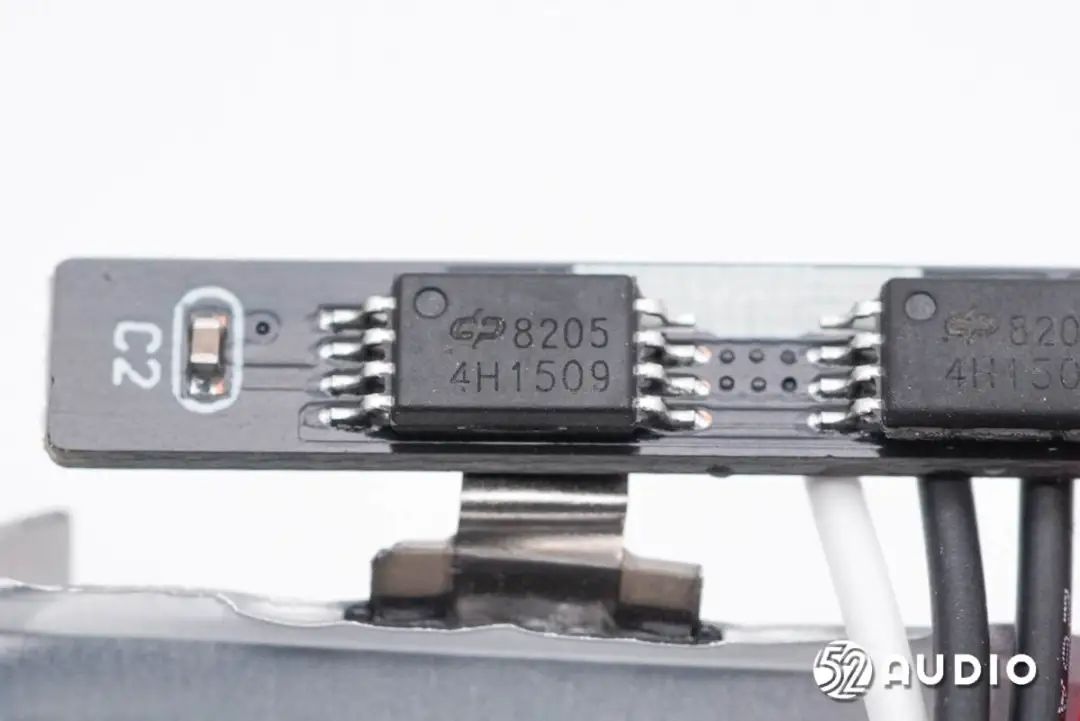 The 8205 MOSFET, working in conjunction with the lithium battery protection IC.
The 8205 MOSFET, working in conjunction with the lithium battery protection IC.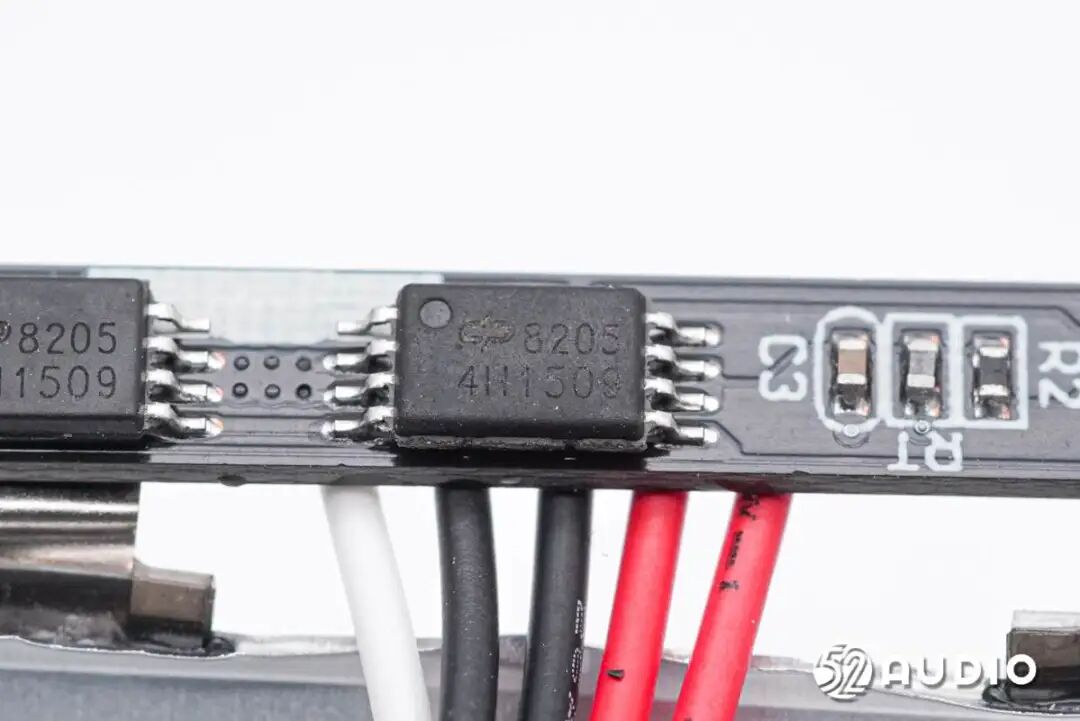 Another 8205 MOSFET.
Another 8205 MOSFET.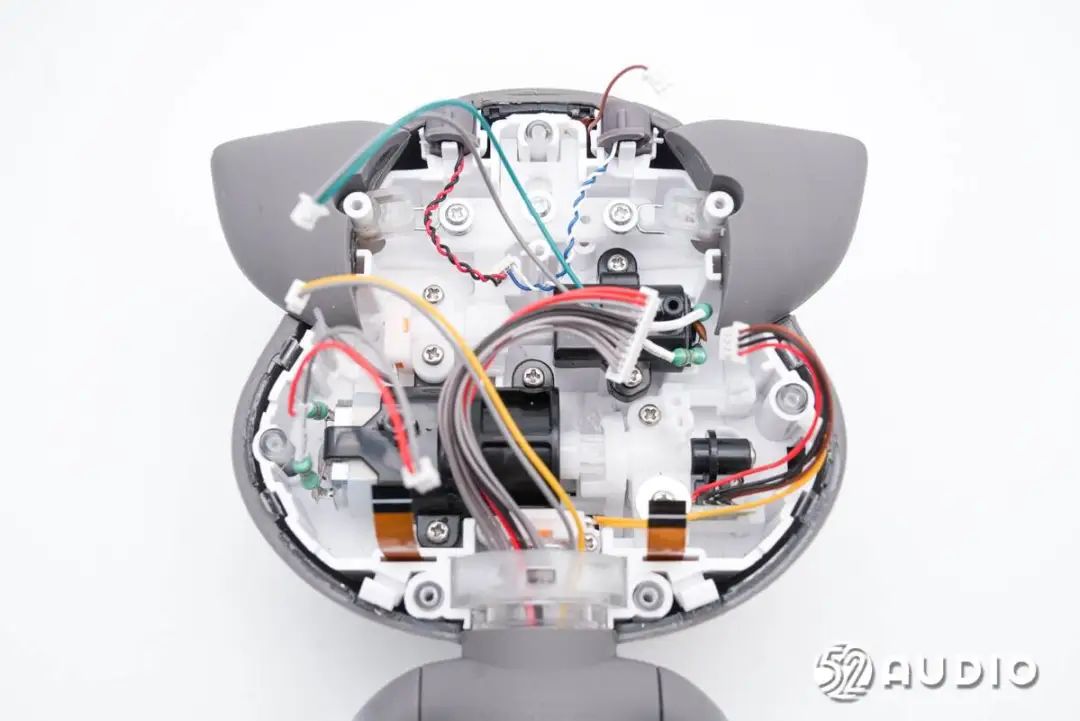 An overview of the bottom structure of the cavity.
An overview of the bottom structure of the cavity.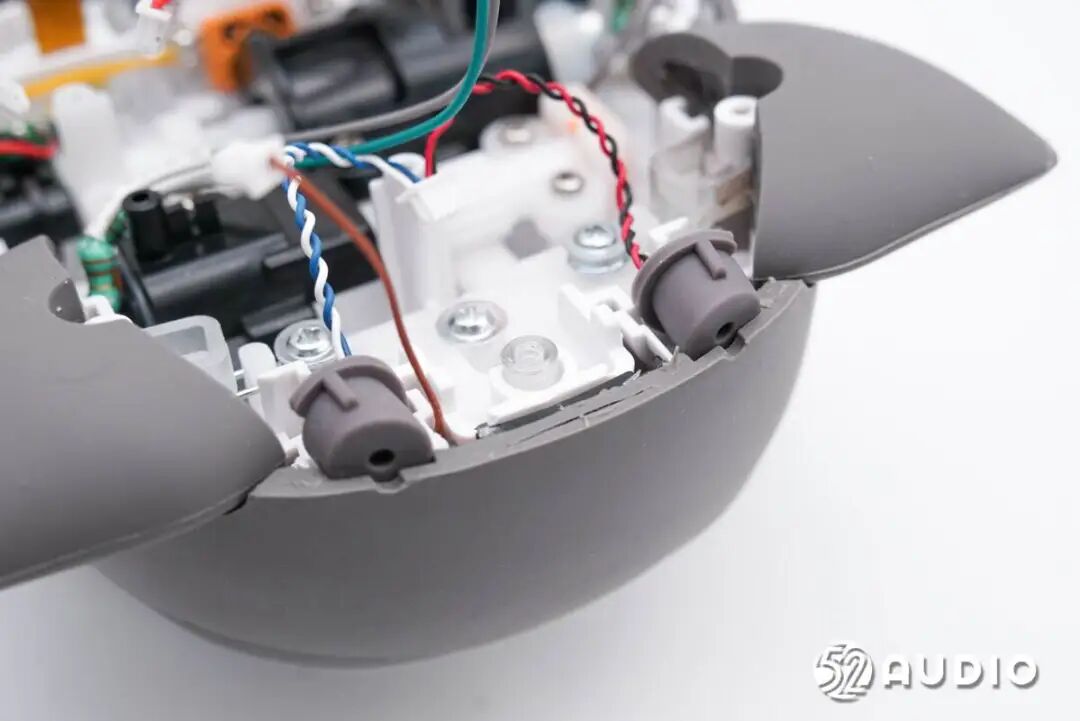 A close-up of the two microphone units.
A close-up of the two microphone units.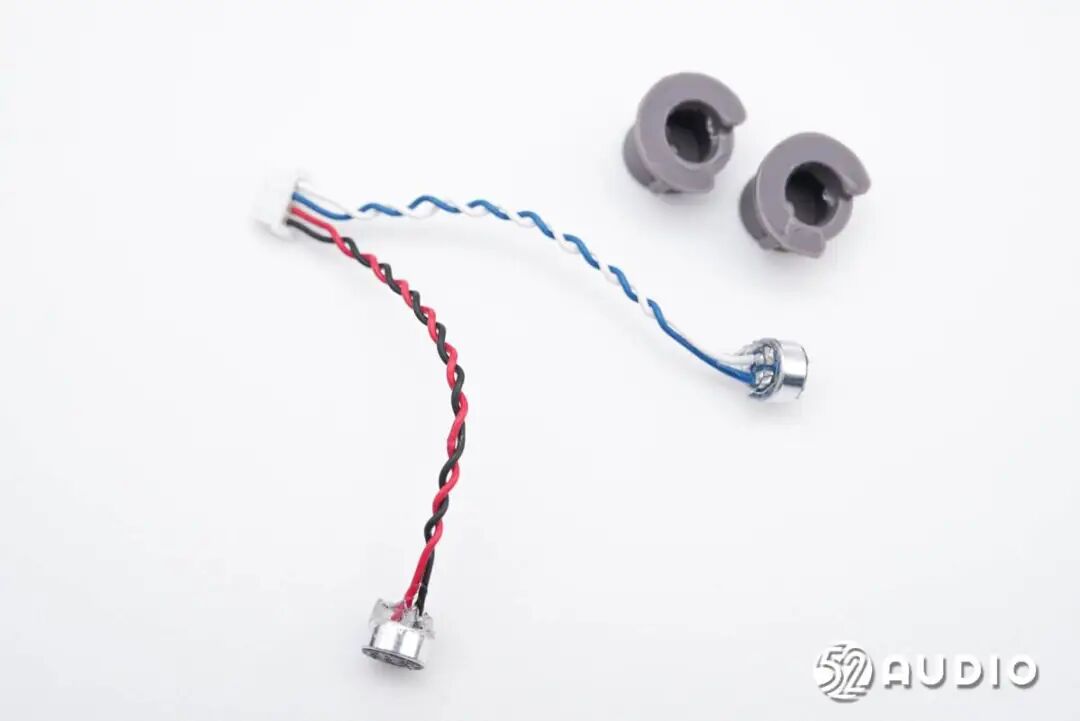 Remove the electret microphone; the Talking Tom Cat uses two microphones to form a pickup array, paired with algorithms to provide precise sound pickup and sound localization functions.
Remove the electret microphone; the Talking Tom Cat uses two microphones to form a pickup array, paired with algorithms to provide precise sound pickup and sound localization functions.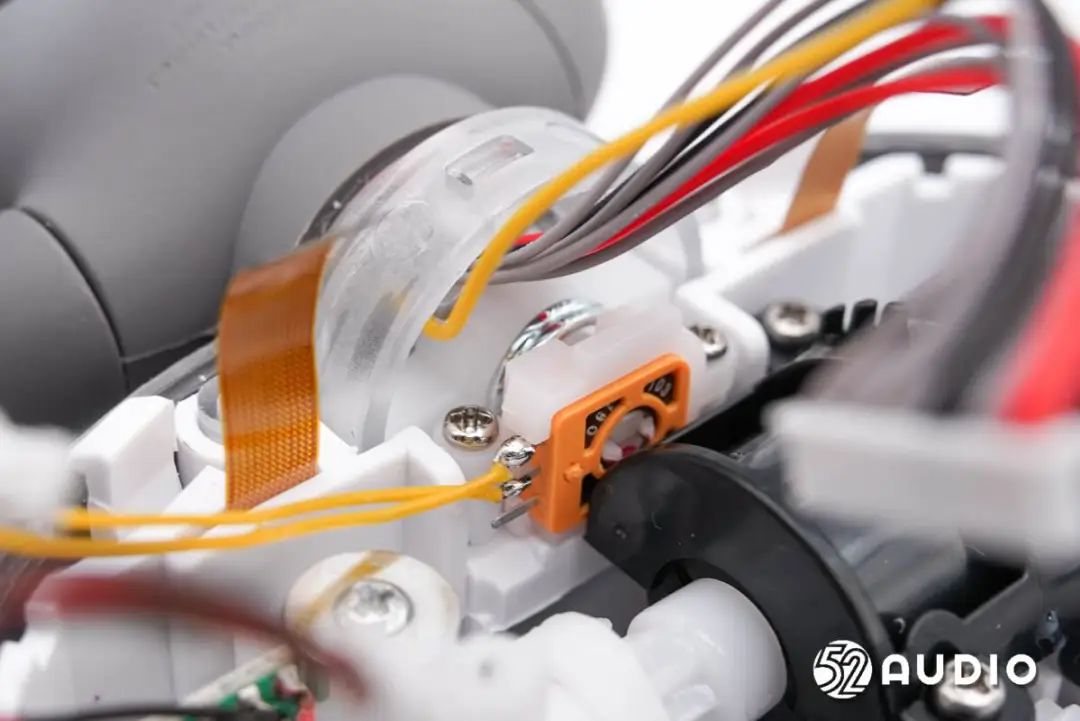 A close-up of the structure connecting the head and body, equipped with a potentiometer to detect the head’s rotation status.
A close-up of the structure connecting the head and body, equipped with a potentiometer to detect the head’s rotation status.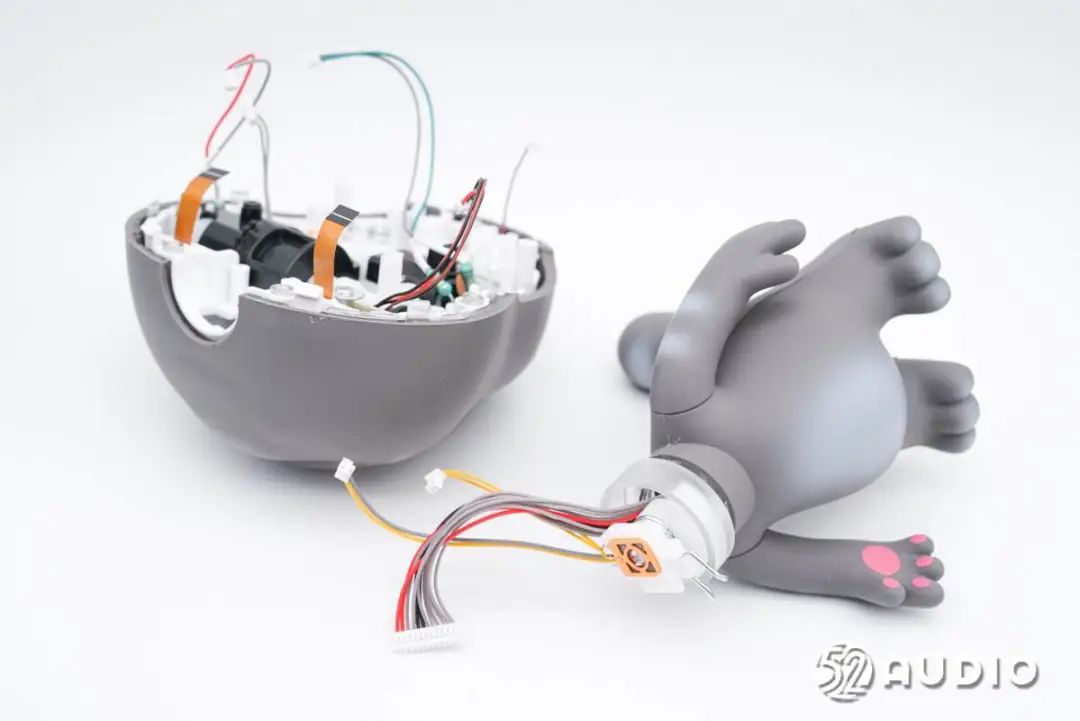 Remove the screws and separate the cavity.
Remove the screws and separate the cavity.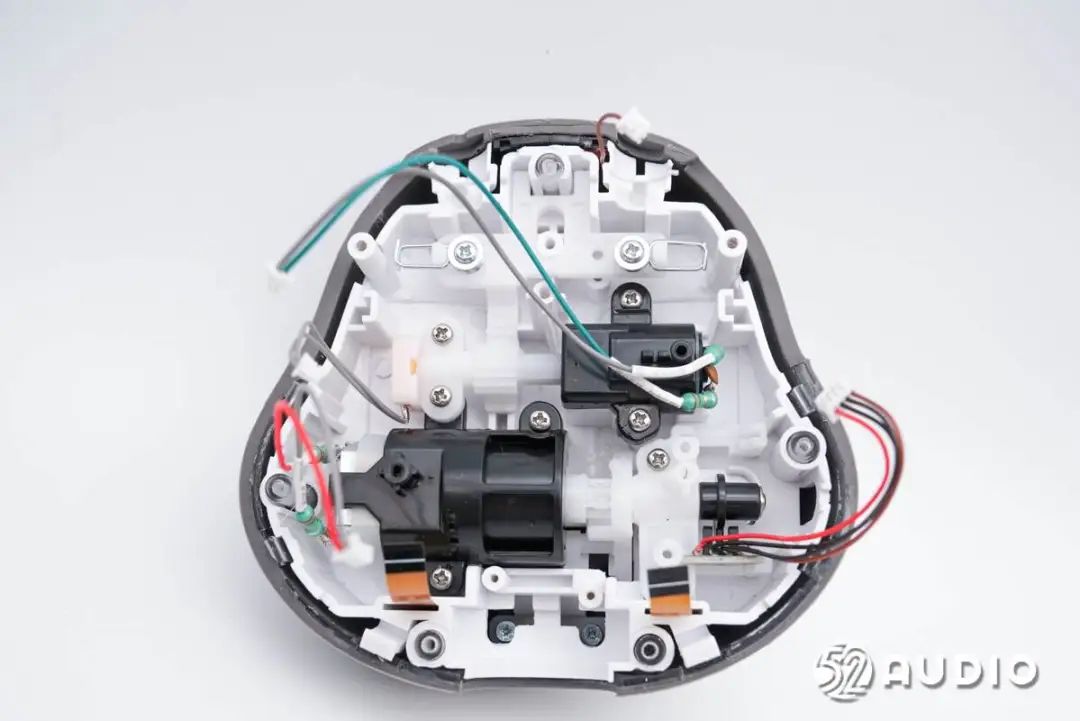 An overview of the internal structure of the head cavity. It has two motors to drive the mouth and ear movements.
An overview of the internal structure of the head cavity. It has two motors to drive the mouth and ear movements.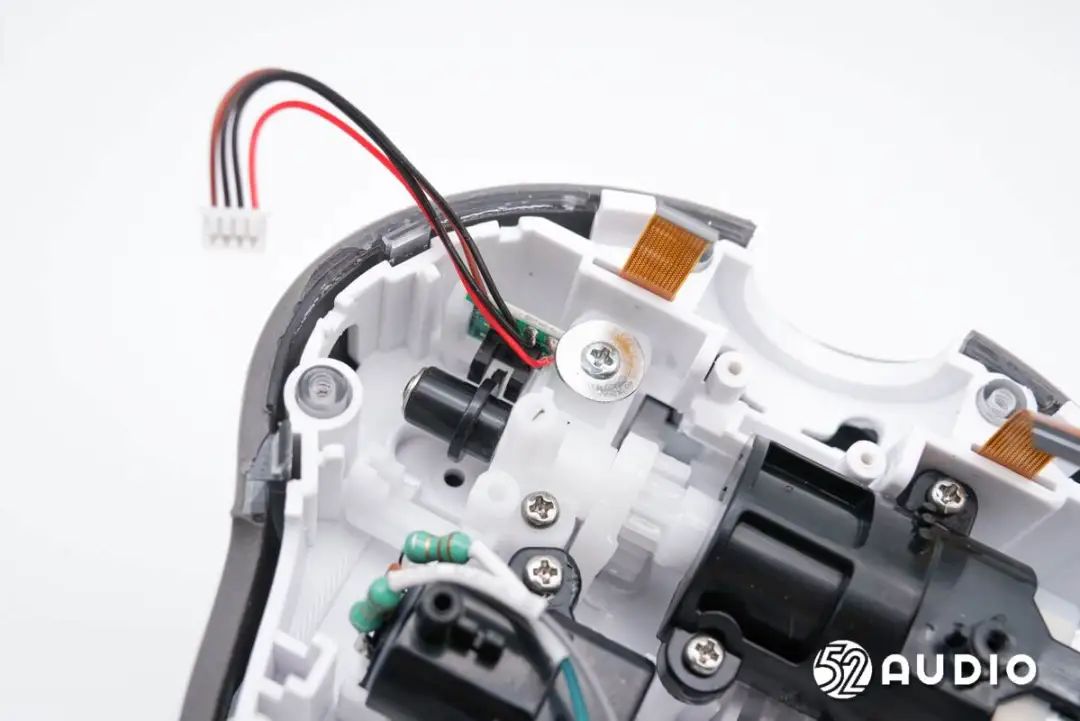 A close-up of the infrared board used to detect motor rotation.
A close-up of the infrared board used to detect motor rotation.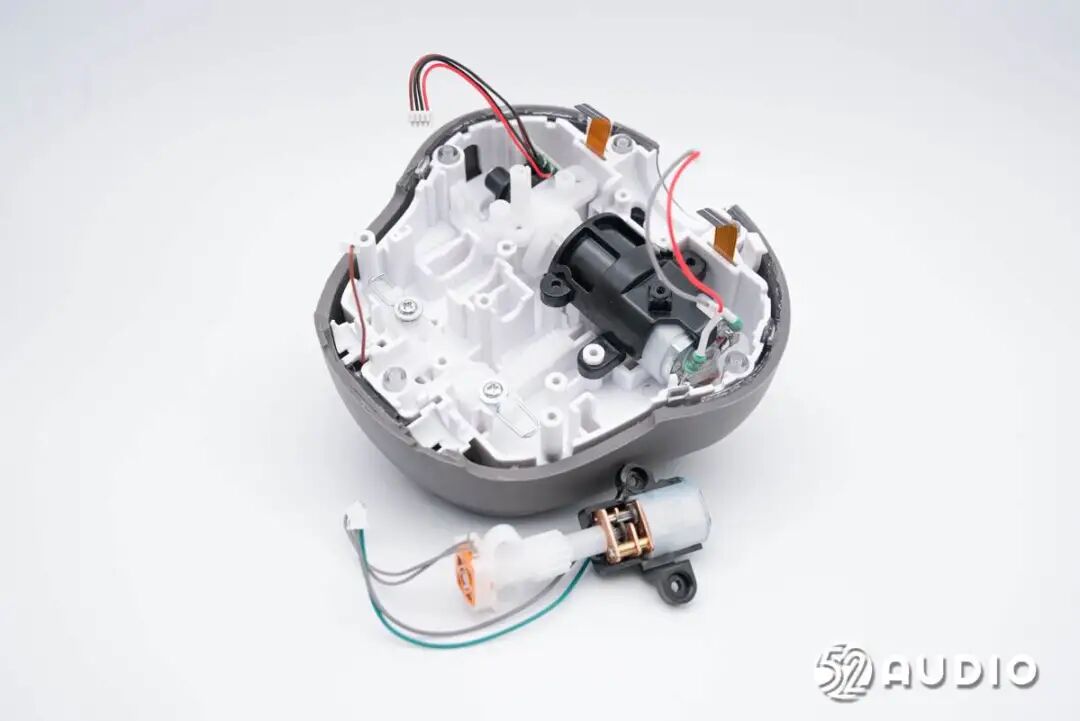 Remove the screws and take out the motor that drives the ear rotation.
Remove the screws and take out the motor that drives the ear rotation.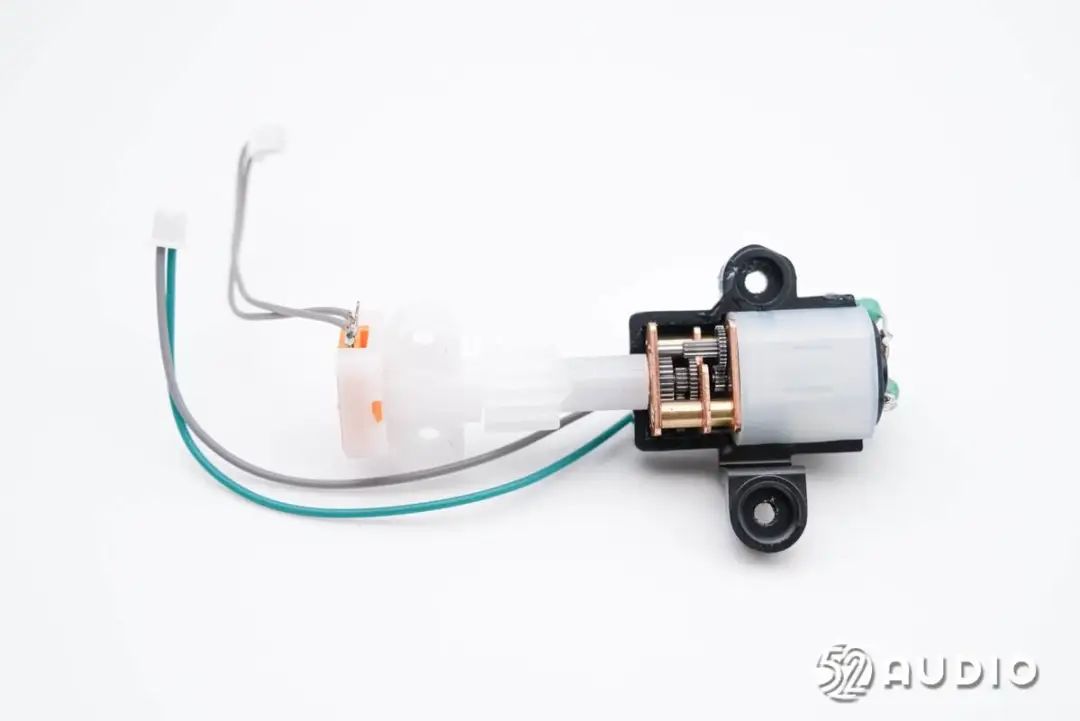 A close-up of the motor module that drives the ear rotation. The left end bracket has a potentiometer to detect the ear’s rotation position.
A close-up of the motor module that drives the ear rotation. The left end bracket has a potentiometer to detect the ear’s rotation position.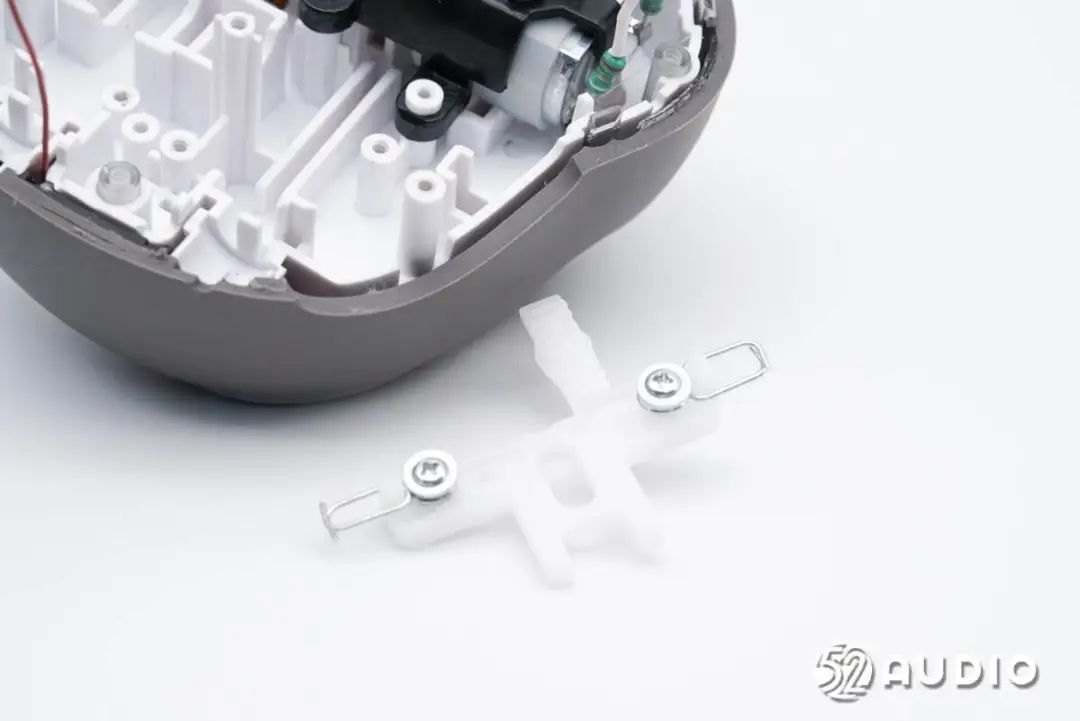 Remove the connecting structure used to drive the rotation of both ears.
Remove the connecting structure used to drive the rotation of both ears.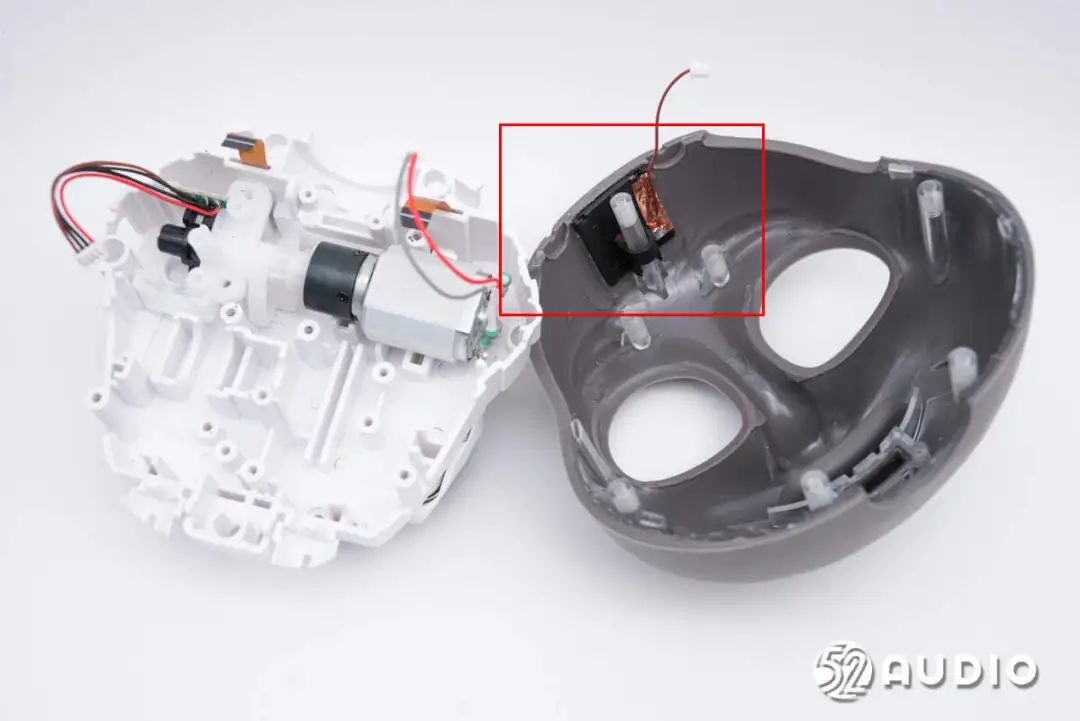 Remove the screws and take out the internal support structure of the cavity. The inner side of the front shell is attached with touch detection copper foil for the petting function.
Remove the screws and take out the internal support structure of the cavity. The inner side of the front shell is attached with touch detection copper foil for the petting function.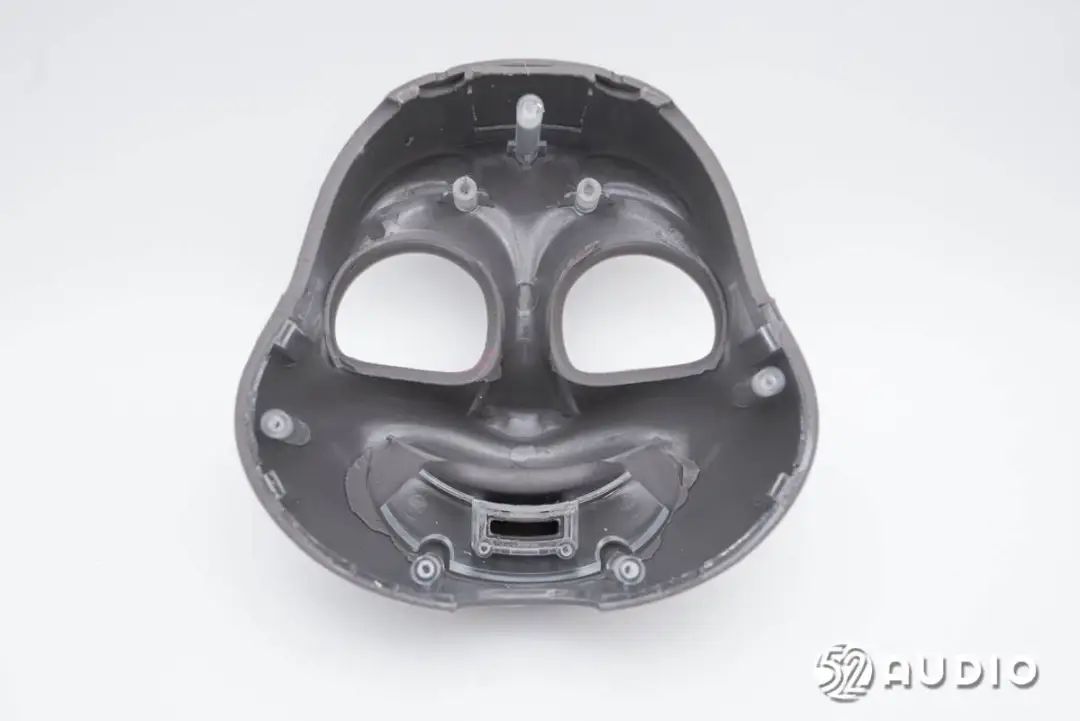 An overview of the bottom structure of the cavity.
An overview of the bottom structure of the cavity.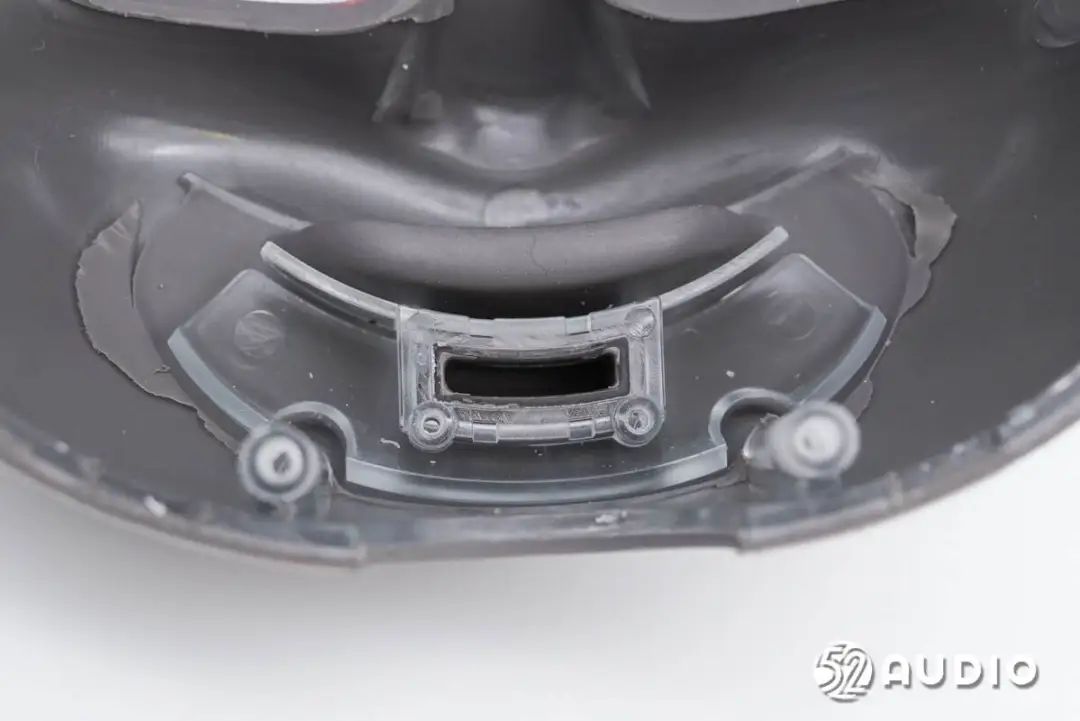 A close-up of the inner structure of the mouth, which has a transparent piece connecting the motor to achieve the up and down movement of the mouth.
A close-up of the inner structure of the mouth, which has a transparent piece connecting the motor to achieve the up and down movement of the mouth.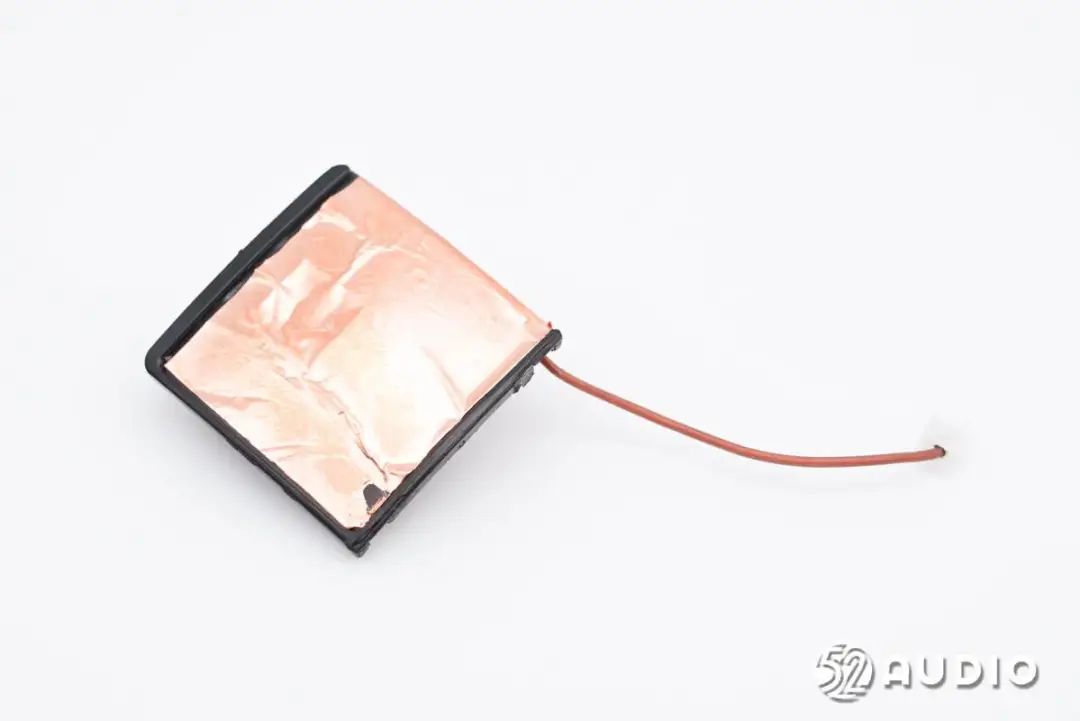 A close-up of the copper foil used for touch detection.
A close-up of the copper foil used for touch detection.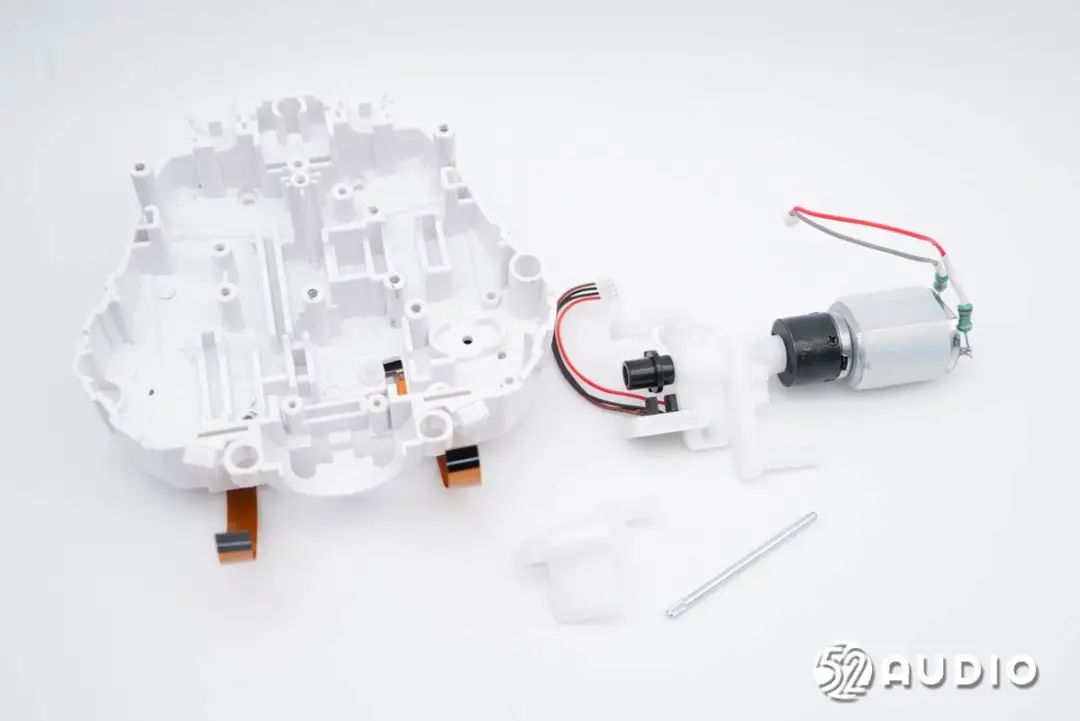 Remove the screws and take out the motor that drives the mouth and the infrared board that detects rotation.
Remove the screws and take out the motor that drives the mouth and the infrared board that detects rotation.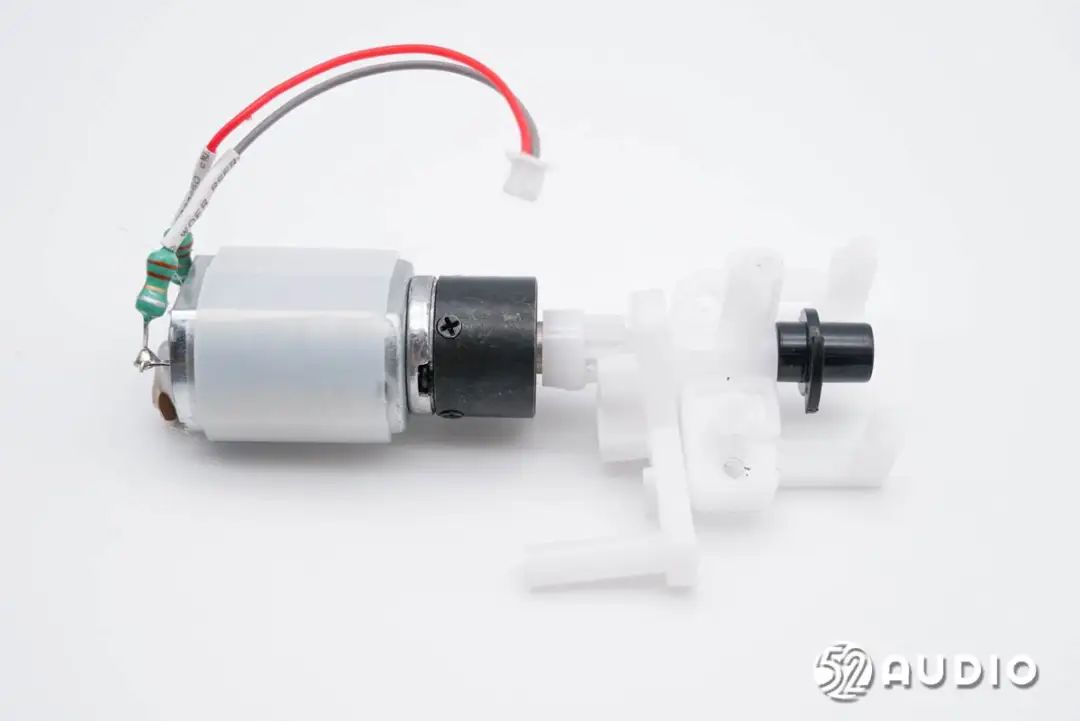 A close-up of the motor module that drives the mouth.
A close-up of the motor module that drives the mouth.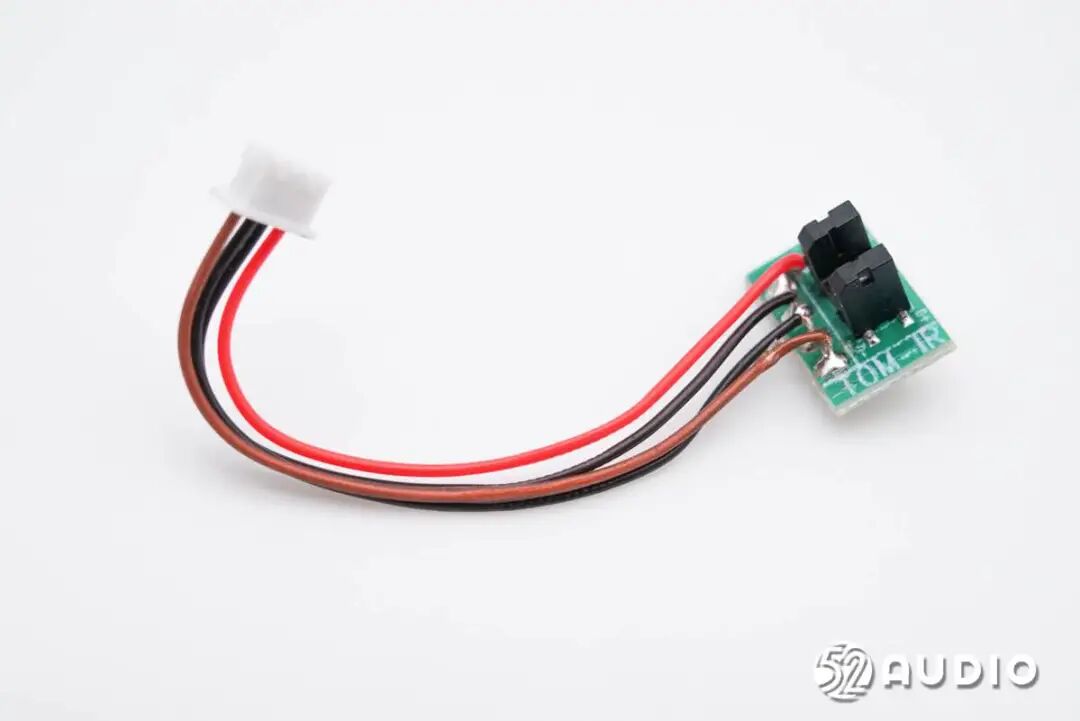 A close-up of the infrared board module that detects motor rotation.
A close-up of the infrared board module that detects motor rotation.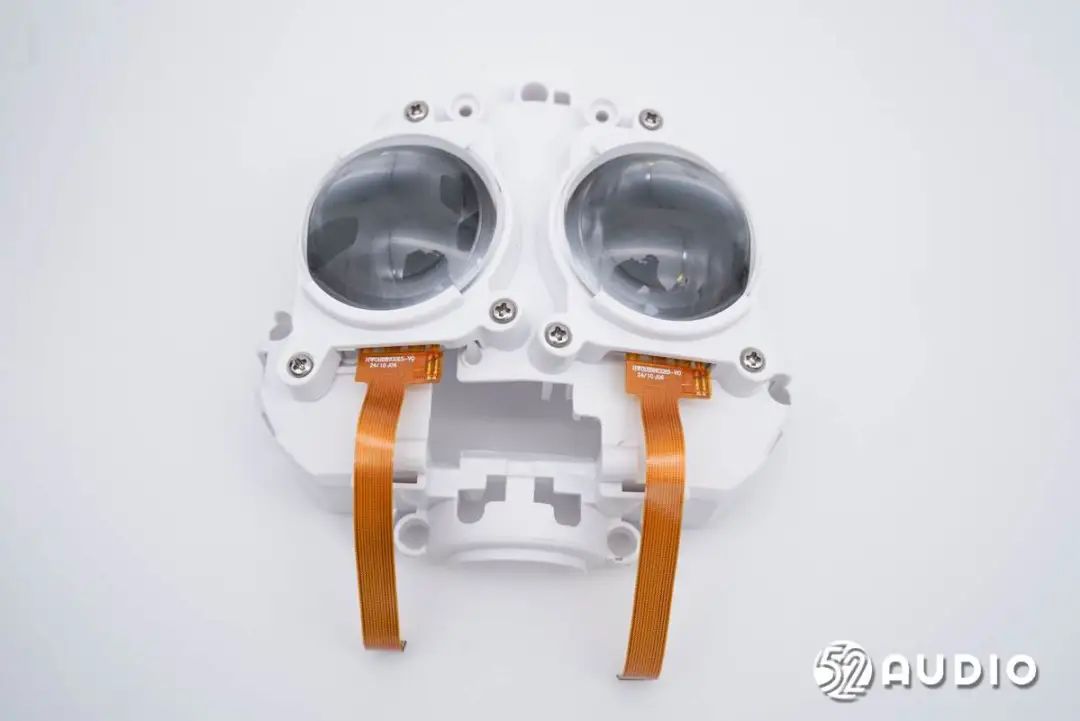 An overview of the structure of the back of the eyes, including two sets of lenses and a display.
An overview of the structure of the back of the eyes, including two sets of lenses and a display.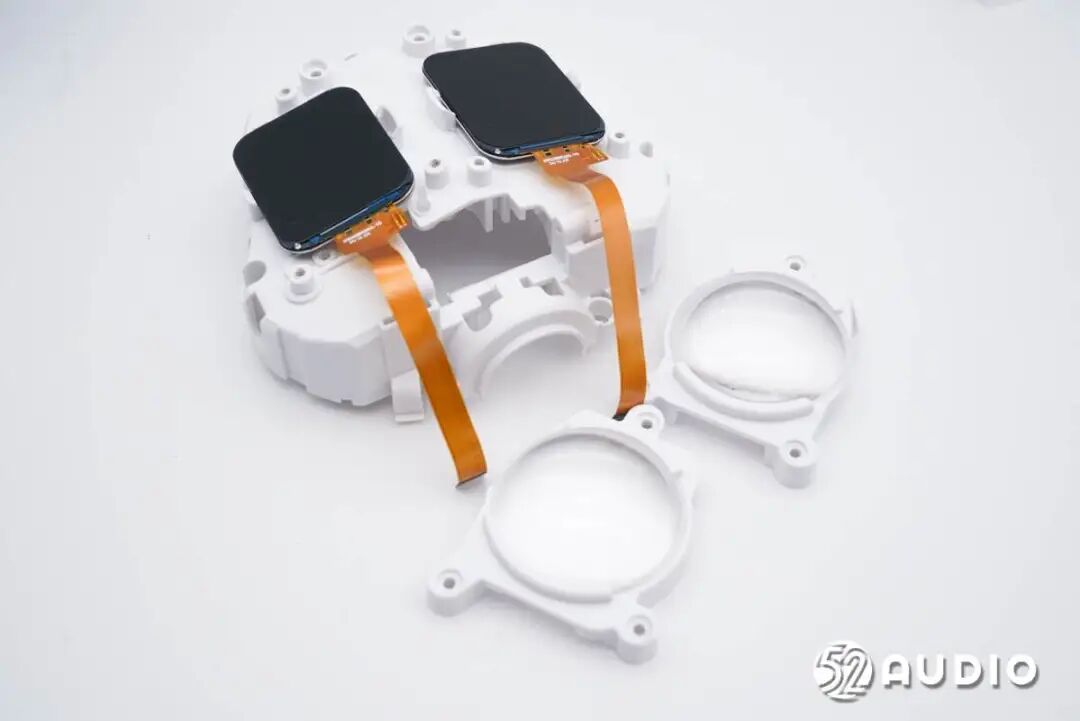 Remove the screws and disassemble the lens structure.
Remove the screws and disassemble the lens structure.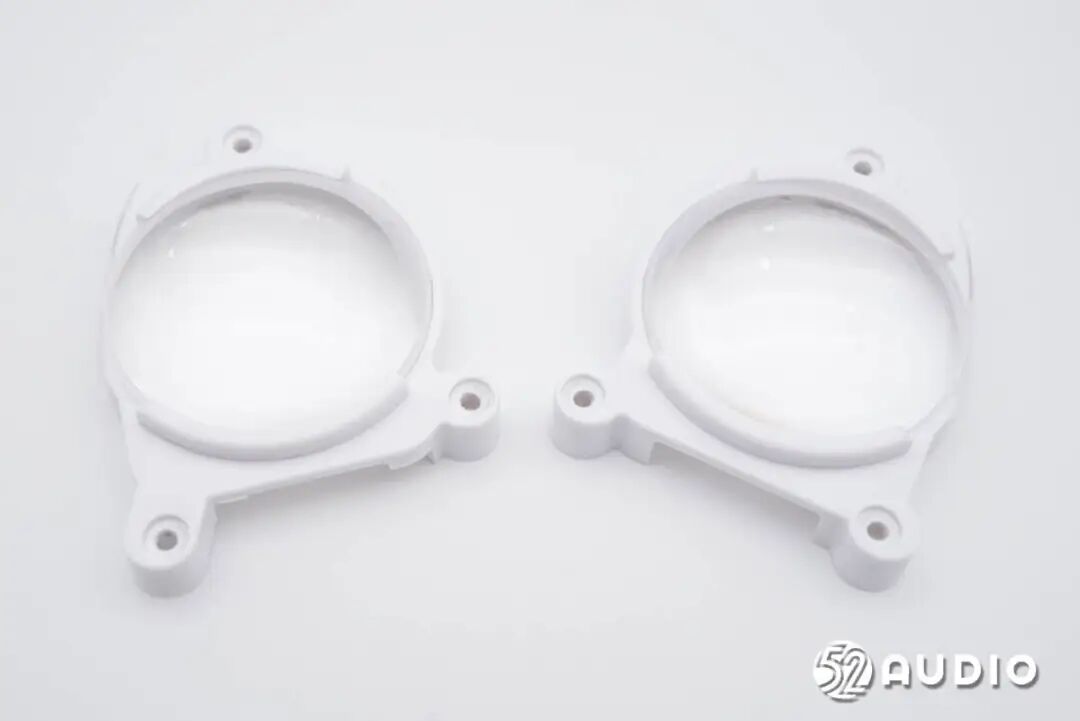 A close-up of the lens structure.
A close-up of the lens structure.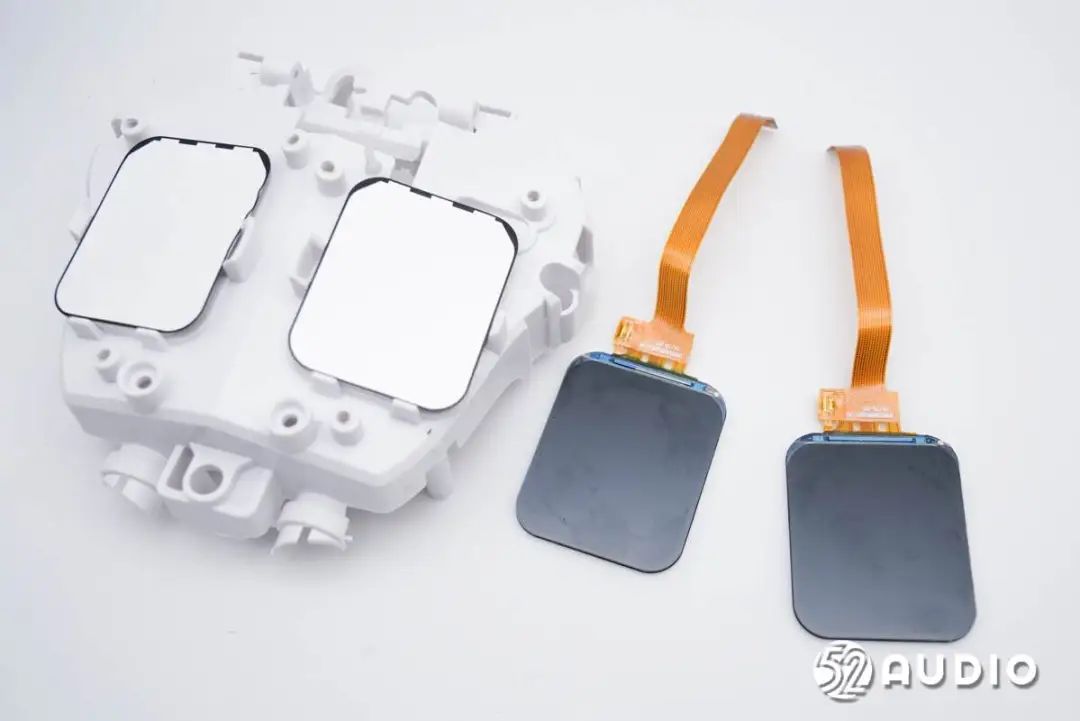 Remove the two displays.
Remove the two displays.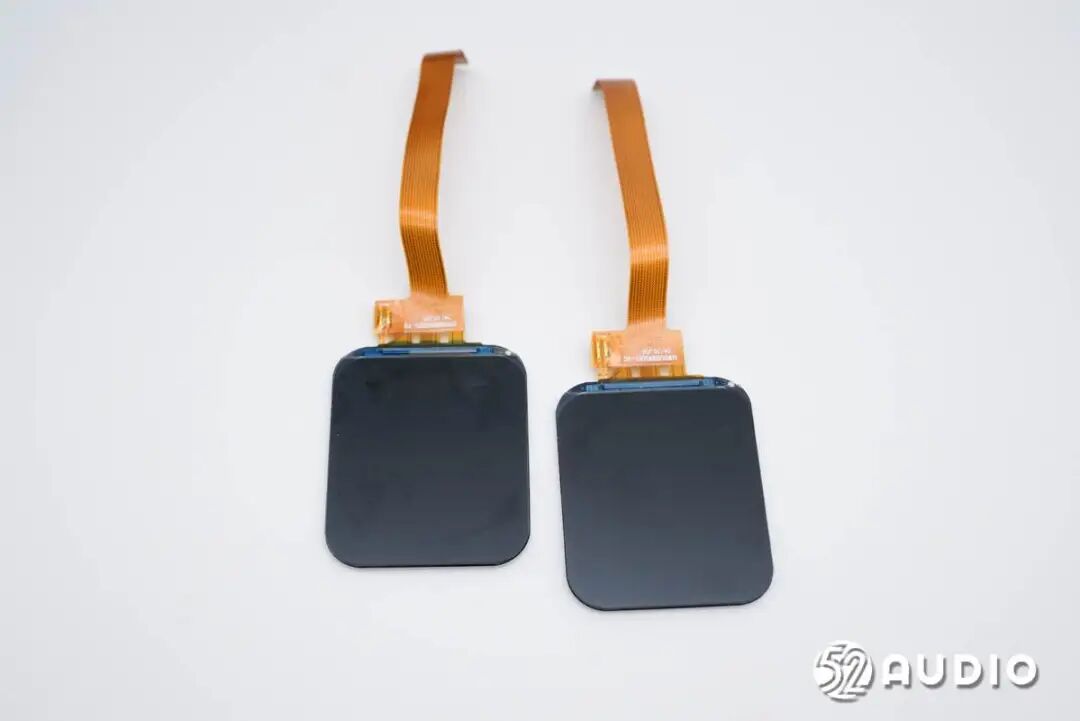 A close-up of the display module, used to show various expressions.
A close-up of the display module, used to show various expressions.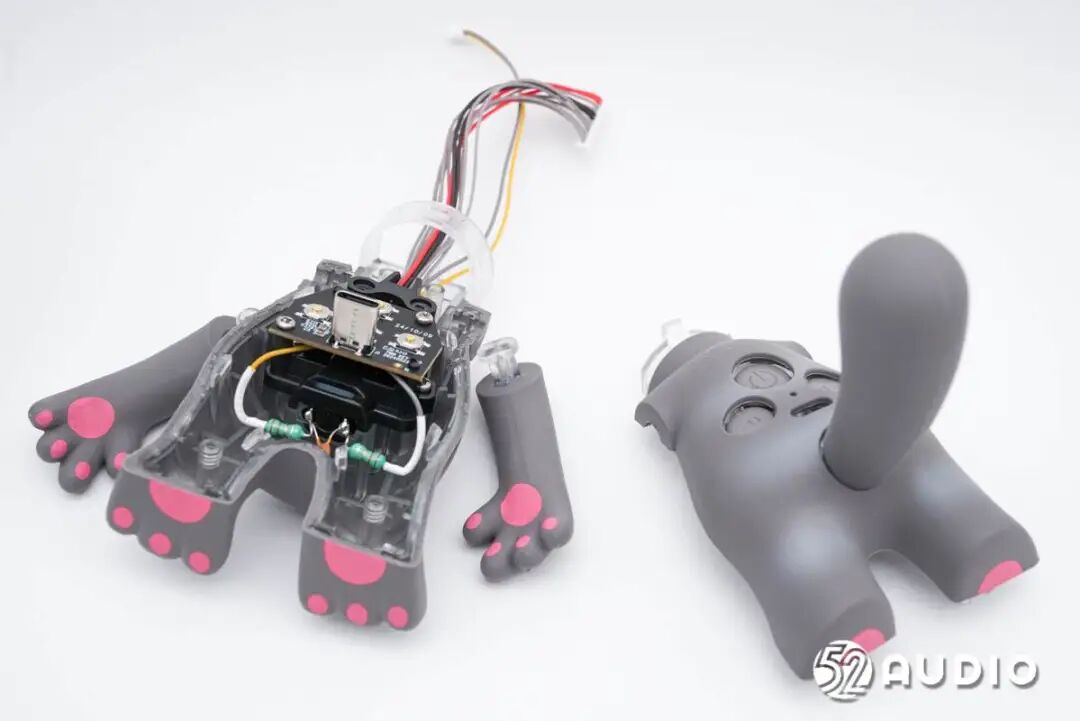 Disassemble the cavity of the body.
Disassemble the cavity of the body.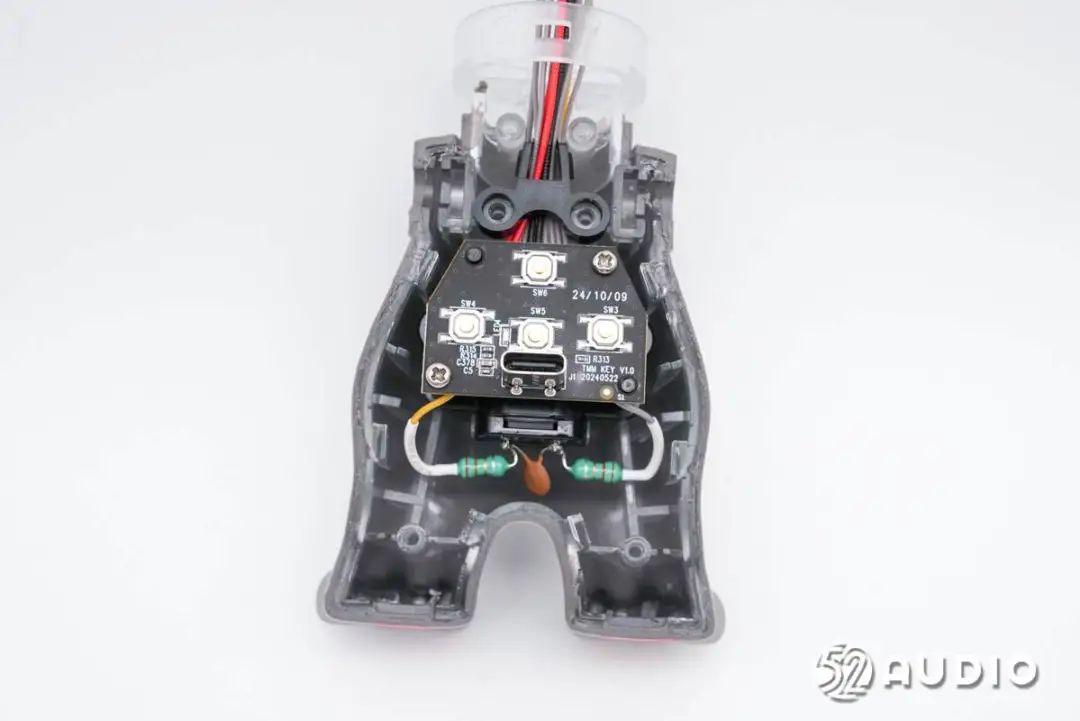 An overview of the internal structure of the front cavity, with a power input board and motor fixed by a transparent bracket.
An overview of the internal structure of the front cavity, with a power input board and motor fixed by a transparent bracket.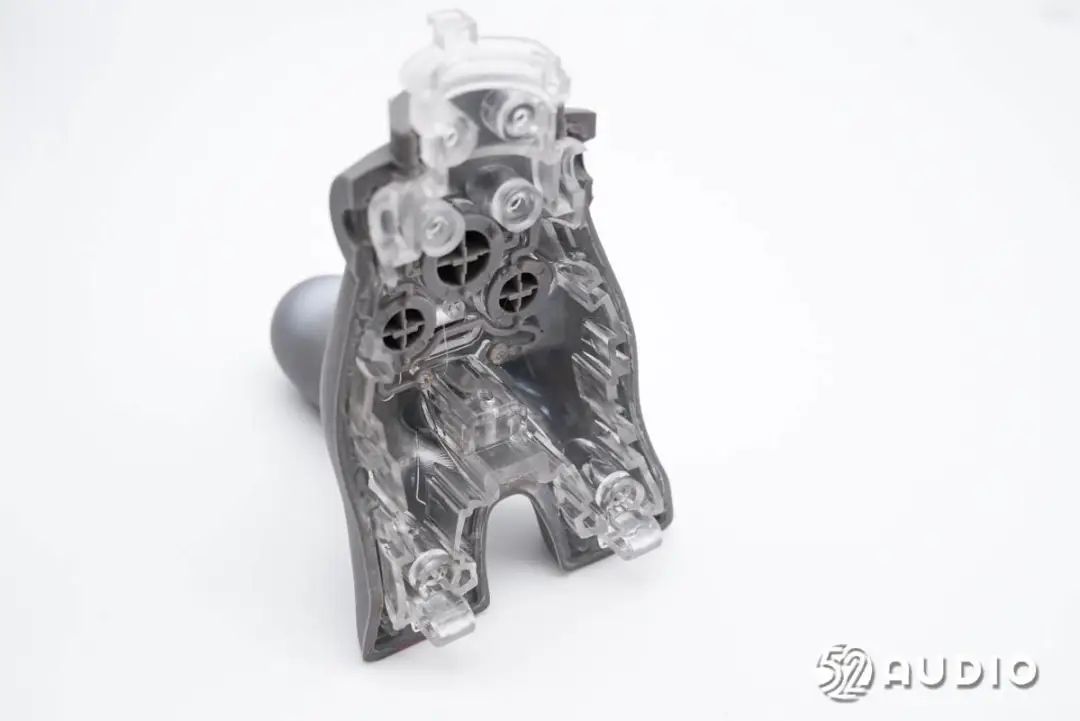 An overview of the internal structure of the rear cavity.
An overview of the internal structure of the rear cavity.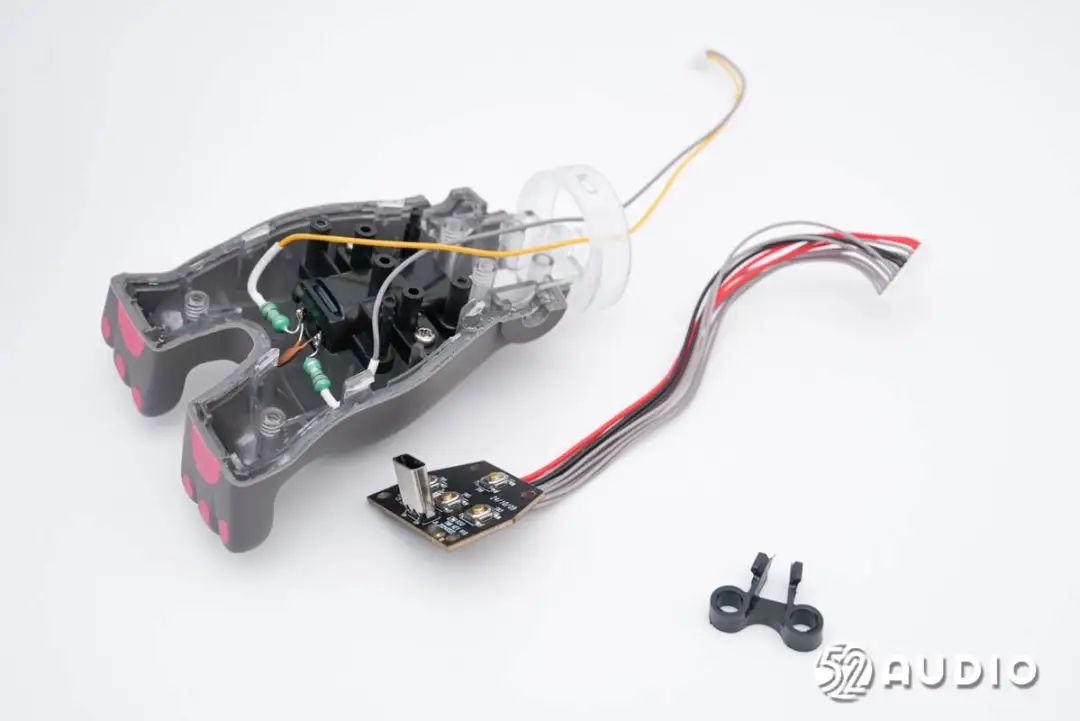 Remove the fixed screws and cable ties, and take out the power input board and ribbon cable.
Remove the fixed screws and cable ties, and take out the power input board and ribbon cable.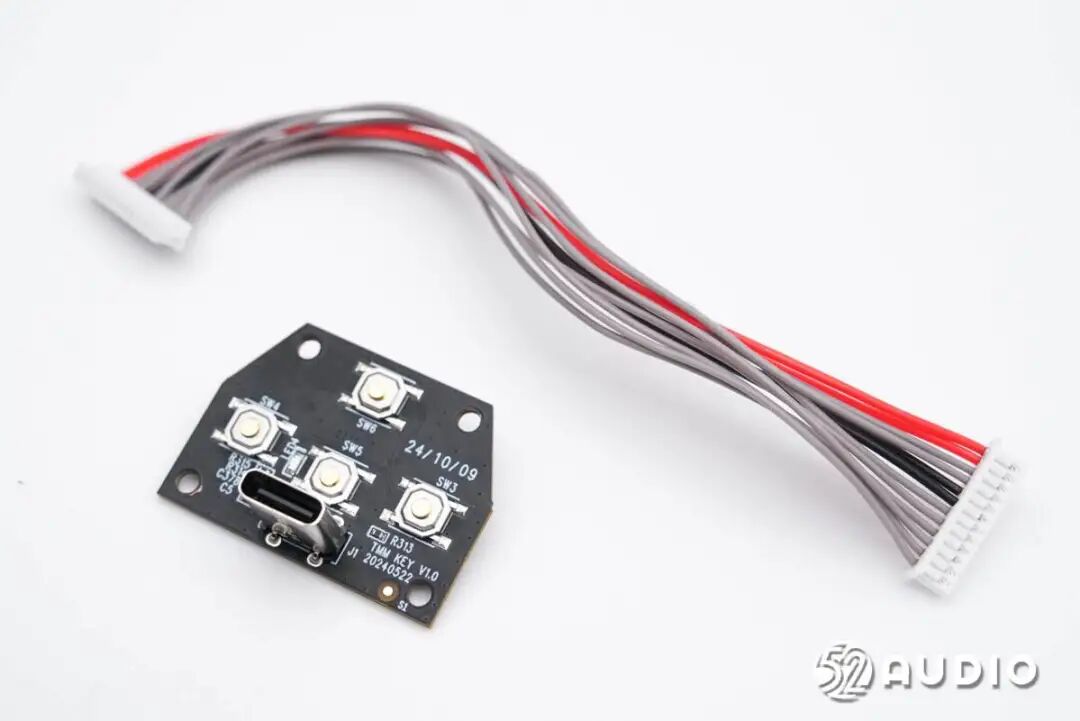 Disconnect the connector and separate the power input board.
Disconnect the connector and separate the power input board.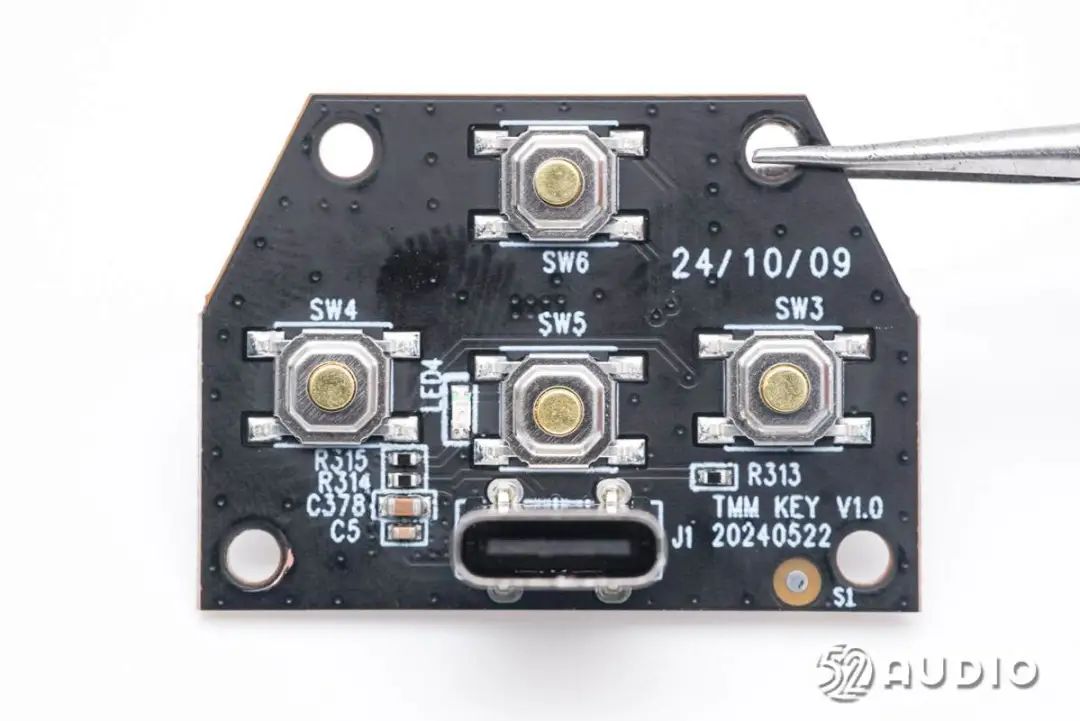 An overview of the circuit on one side of the power input board, with four functional buttons and a Type-C charging interface.
An overview of the circuit on one side of the power input board, with four functional buttons and a Type-C charging interface.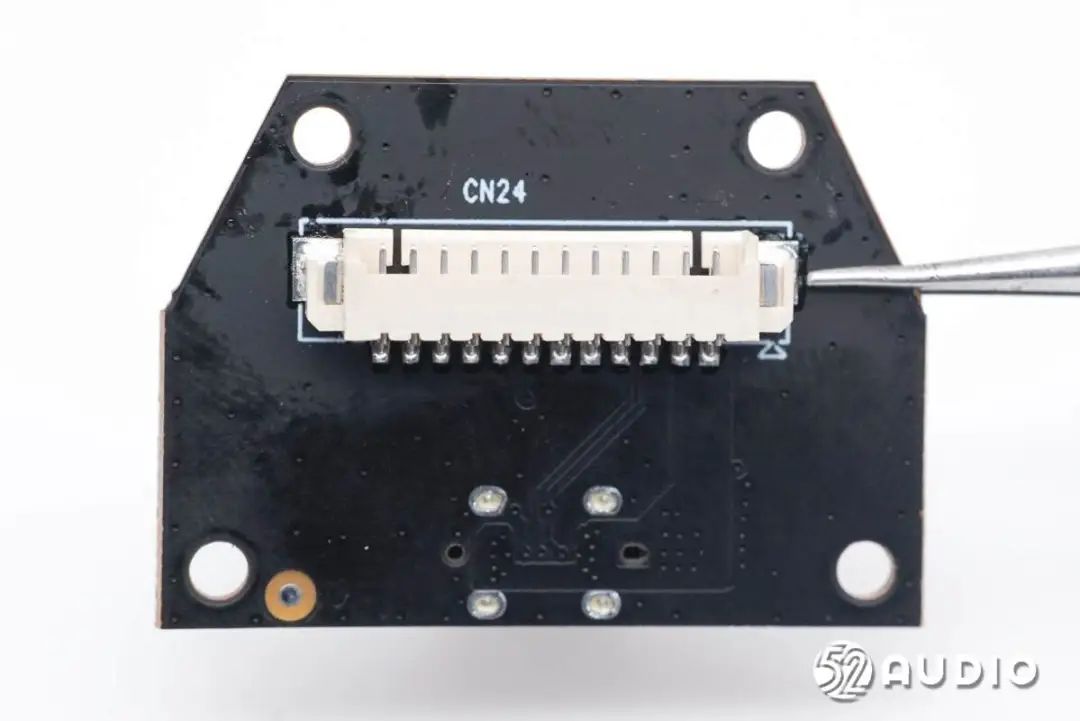 The other side of the small board has a socket connecting to the mainboard wires.
The other side of the small board has a socket connecting to the mainboard wires.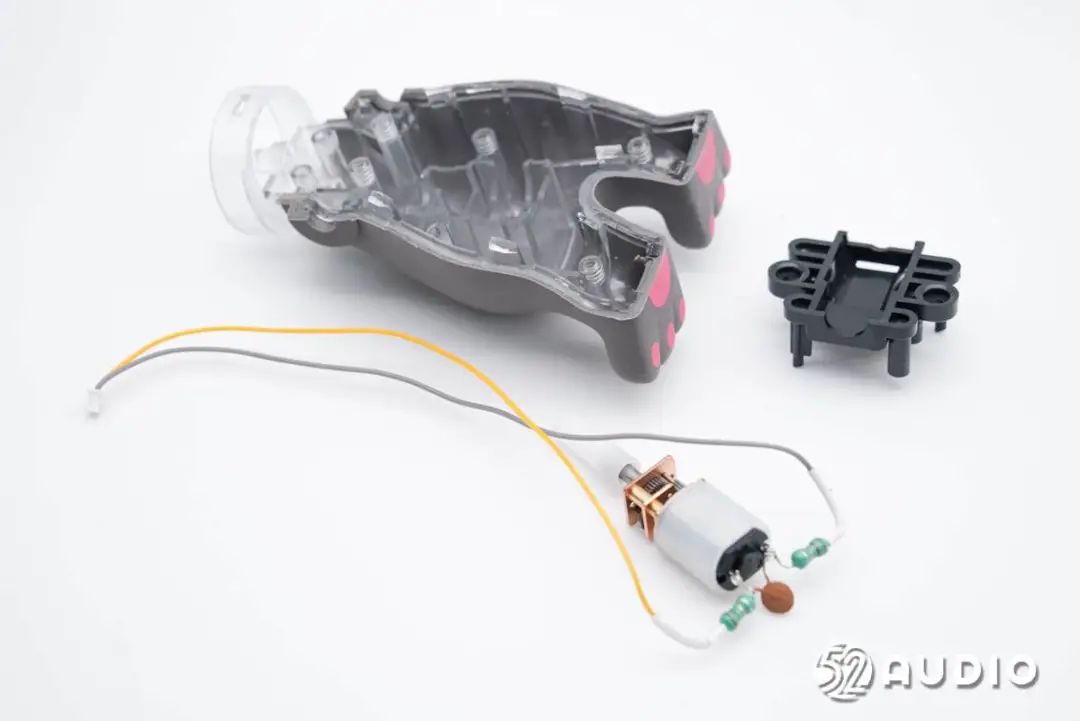 Remove the screws and take out the motor that drives the head rotation.
Remove the screws and take out the motor that drives the head rotation.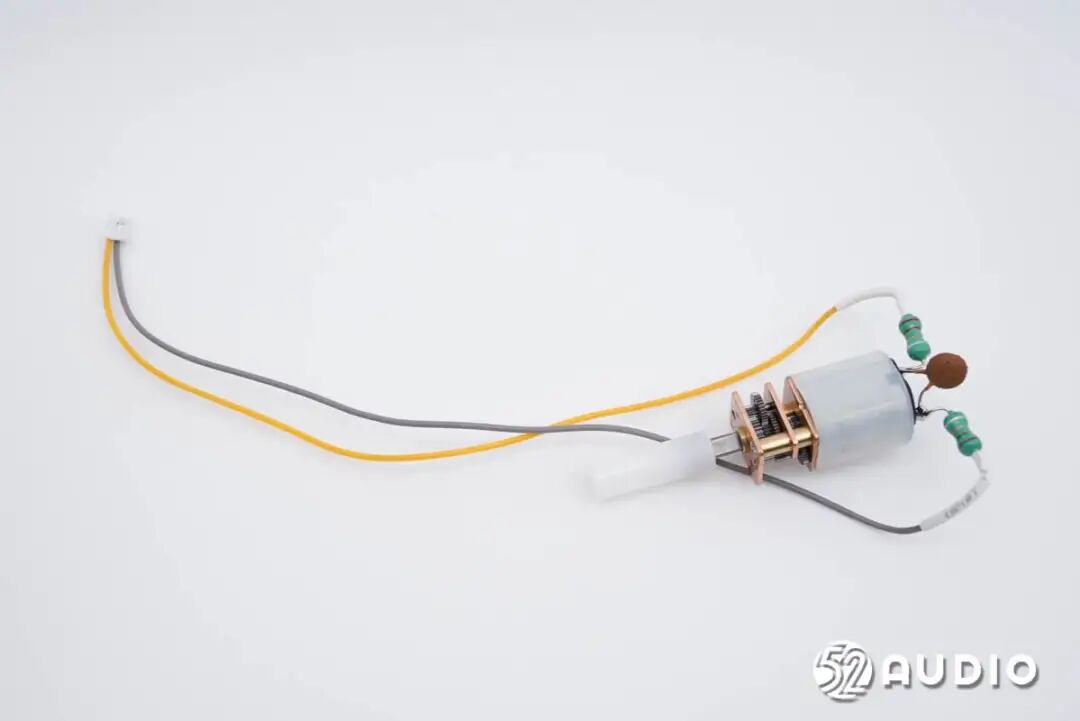 An overview of the motor module structure that drives the head rotation.
An overview of the motor module structure that drives the head rotation.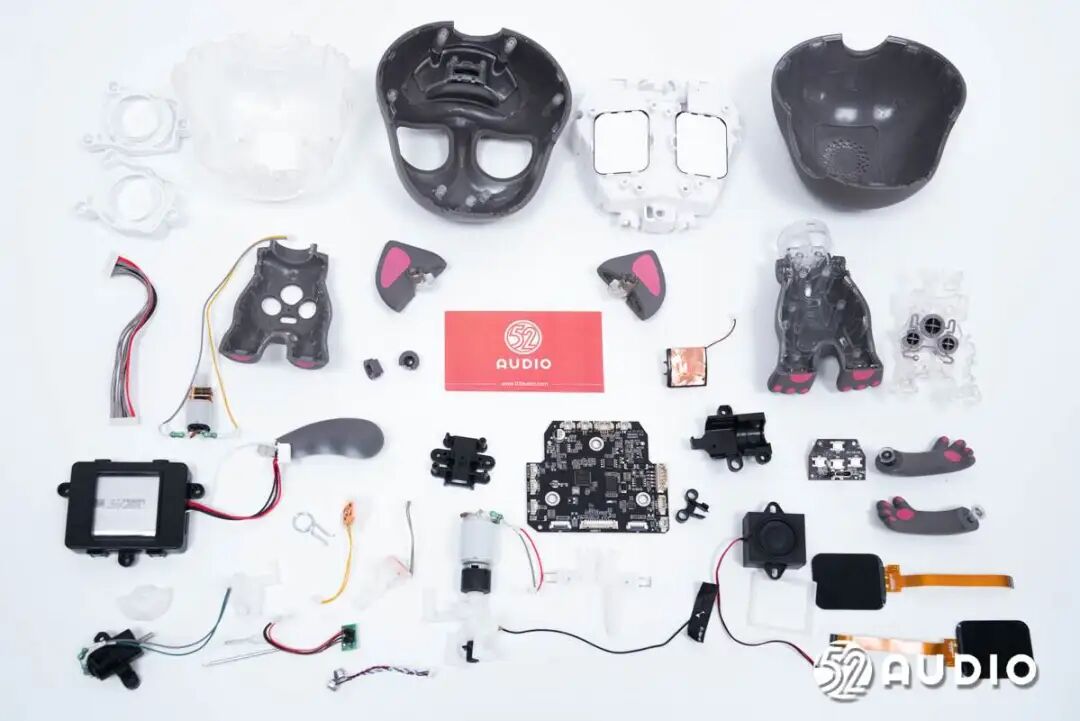 The AI Companion | Talking Tom Cat disassembly family photo.03
The AI Companion | Talking Tom Cat disassembly family photo.03
I Love Audio Network Summary
The AI Companion | Talking Tom Cat features the classic IP image of “Talking Tom Cat,” looking adorable, and comes with clothing for personalized dressing. In terms of structural functionality, the glasses are equipped with displays, and the mouth, ears, and head support rotation, allowing for more humanized emotional expressions based on interaction.In terms of internal structure, to achieve multi-part rotation, the design is complex and precise. The main configuration includes a mainboard unit and a 3000mAh lithium battery from HT Hengtai Technology in the head; it uses dual motors to drive the mouth and ears, has two displays for eye emotional expression, and is equipped with a speaker and dual electret microphones for voice interaction. The body contains a power input and functional button small board, as well as a motor that drives the head rotation.On the mainboard, the ALLWINNER R128-S3 high-integration wireless audio SoC is used, integrating a high-performance dual-core processor, HiFi5 DSP, ADC and DAC, wireless networking, and display functions, while also equipped with a powerful AI large model, connecting to the Ximalaya voice resource library, providing Tom Cat with strong processing capabilities, rich functional support, and a wealth of content resources.Additionally, it is equipped with three Sytatek SA8301 motor drivers, which drive the ears, mouth, and neck motors respectively; it uses the HYNITRON HAA9811 audio power amplifier to drive the speaker; and it also employs the XMC Wuhan Xinxin XM25QH128D SPI NOR flash memory, Natlinear LN2289 DC/DC regulator, and Shanghai Aiwei Electronics AW9523B LED driver, among others.Extreme cost-performance AI module, connecting to Doubao’s large model in China, supports customer customization of intelligent agents. Applications such as plush toys, desktop robots, and children’s story machines are all customizable; feel free to chat if interested.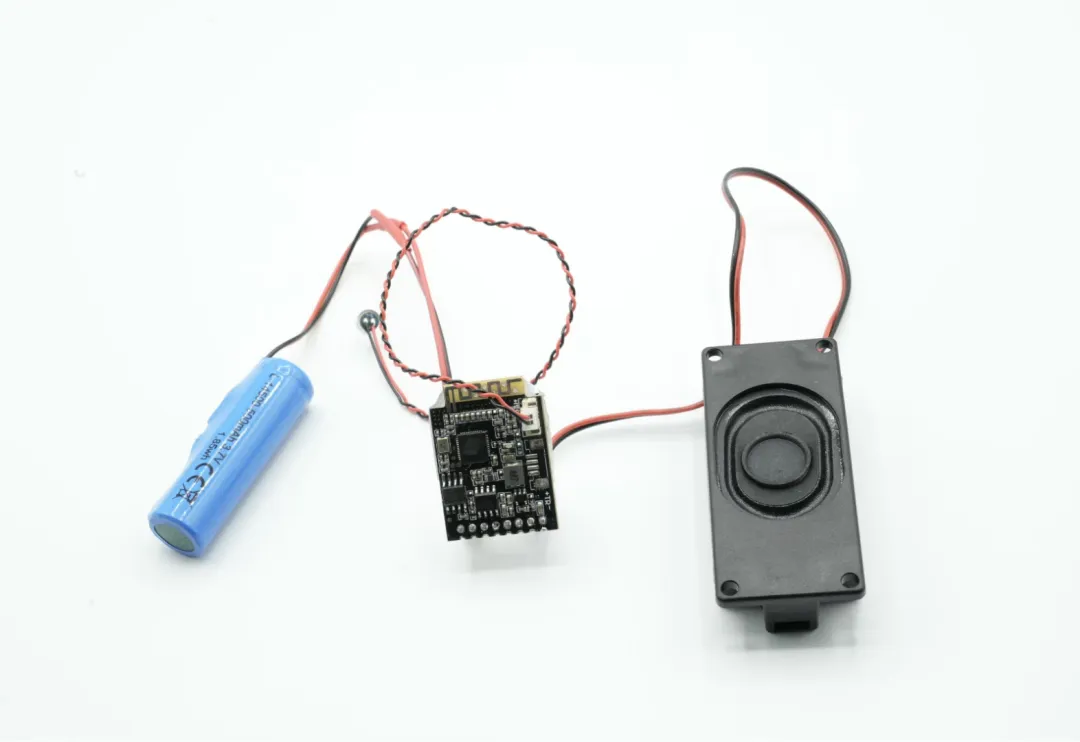 Scan to add me on WeChat👇
Scan to add me on WeChat👇
Content reproduced from WeChat public account “I Love Audio Network” (ID:aiaudio), author: I Love Audio Network.
Original Title: Disassembly Report: AI Companion | Talking Tom Cat
Recommended Reading:▶ What impact do tariffs have on the chip industry?▶ What is the situation with ST chip price increases?
▶ The chip from Rockchip is secretly out of stock and increasing in price.
▶ TOP4 chip distributors, a change has occurred!
▶ Analog chip giant ADI has more good news!
 Click to view past content↓↓↓Are you“watching”me?
Click to view past content↓↓↓Are you“watching”me?